ACBS Student Spotlight Program
ACBS Student Spotlight ProgramThe Student Spotlight Program highlights students who are doing important work in the CBS community whether for research, clinical, and/or volunteer-humanitarian efforts. It is a way to highlight their achievements, let the ACBS community know important work students are doing, and provides a platform for collaboration/professional development/conversations around highlighted areas.
All of the spotlighted students will be featured on the ACBS website “What’s New” section of the homepage for one week as well as on various social media sites (both ACBS and Student SIG). Additionally, all the spotlighted students will get 50% off (beginning March 2021) the ACBS World Conference student registration fee (must be eligible to register as a student). This discount must be used for World conference in the year it is awarded or used for the World Conference in the following year (If you cannot use it for the 2026 Lyon, France Conference, keep it for the 2027 Conference!).
6 students are selected annually. In order to support basic science, 2 spots will be reserved for students who contributed to basic science.
Requirements:
Eligible students must be current ACBS members at time of submission closing. Must be considered a student in their country of study/practice. Final degree (Ph.D., M.A., other) must not be conferred until at least 3 months following the closing of the application period.
All candidates will be rated on research experience, clinical/clinical training experience, significant achievements, commitment to diversity and equality and additional considerations. ACBS members can login to see the criteria here.
We receive applications twice per year. The first round of applications will be accepted approximately November 1-November 30, annually. The second round of applications will be accepted approximately March 1-March 31 annually. Applicants need to submit a 2-page (minimum) CV and complete the application form.
The reviewers review applications twice per year. The first round of review will be done by the end of December, and the second round of review will be done by the end of April. We will select 2-4 students (including at least 1 from basic science) in each application cycle (6 total). After reviewing, we will feature each spotlighted student once, spaced out over the following months.
Award Recipients:
Tao Zhang (April 2026)
Giorgio Alagna (March 2026)
Farah Gulamoydeen (February 2026)
Maria Coimbra (October 2025)
Jennifer Truitt (May 2025)
Kaeyoor Joshi (April 2025)
Johannes Freymann (March 2025)
Ti Hsu (February 2025)
Diana Cox (September 2024)
Marianna Zacharia (March 2024)
Duckhyun Jo (February 2024)
Korena Klimczak (January 2024)
Wenqian ZHAO (September 2023)
LAM Ching Yee (August 2023)
Jenna Lauren Adamowicz (March 2023)
Conor McCloskey (February 2023)
James Fowler (January 2023)
Georgia Polyviou (October 2022)
Samuel Spencer (September 2022)
Amanda Chastain (August 2022)
Huiyuan LI (July 2022)
Julie Petersen (March 2022)
Carter Haskell Davis (February 2022)
Erin Wolff (August 2021)
Niloofar Tavakoli (July 2021)
Anne I. Roche (March 2021)
Sebastian Garcia-Zambrano (February 2021)
Huanzhen Xu (January 2021)
Alison Stapleton (October 2020)
Adam Kuczynski (September 2020)
Diane Dallal (August 2020)
Clarissa Ong (December 2019)
Joshua Schultz (June 2019)
Sérgio Andrade Carvalho (April 2019)
Lauren B. Johnson (March 2019)
Ethan Lester (March 2019)
Lynn Farrell (December 2018)
Amanda Rhodes (September 2018)
Raul Vaz Manzione (September 2018)
Jessica Stark (May 2018)
Kevin Davies (April 2018)
Inês A. Trindade (March 2018)
Joanna Kaye (February 2018)
Emily Brenny Kroska (July 2017)
Wang Fenfen (May 2017)
Rajinder (Sonia) Singh (May 2017)
Victoria Ameral (March 2017)
Cainã Gomes (February 2017)
Corinna Stewart (January 2017)
Award Recipients
Award RecipientsStudent Spotlight Award Recipient - Inês A. Trindade
Student Spotlight Award Recipient - Inês A. TrindadeCongratulations to Inês A. Trindade on being selected as the Student Spotlight Award winner for March 2018!
The purpose of this award is to highlight students who are doing important work in the CBS community whether for research, clinical, and/or volunteer-humanitarian efforts.
This is a way to highlight their achievements, let the ACBS community know important work students are doing, and possibly provide a platform for mentoring/collaboration/professional development/conversations around highlighted areas.
Learn more about Inês:
Background of CBS Research/Clinical/Volunteering efforts/achievements:
I started researching in CBS during my Master’s Thesis in Clinical and Health Psychology at University of Coimbra. My thesis aimed to develop a body image-related cognitive fusion questionnaire and analyse the impact of this construct on eating psychopathology. During this time I was a clinical psychology intern at the Psychiatric Unit of the Coimbra University Hospital, where I was trained in CBS clinical practise. After my MSc I did a professional voluntary internship where I applied ACT in women with eating difficulties. At this time, I became a collaborator at CINEICC (University of Coimbra), a research centre with a strong focus on CBS, and later a PhD student at the same centre. My PhD studies have two main focuses. The first is the analysis of the impact of processes such as experiential avoidance, cognitive fusion, and shame on psychological and physical outcomes in chronic illness, which has provided interesting findings on the importance of these processes in several chronic health conditions. The most relevant published paper from my PhD studies to date has longitudinally demonstrated that cognitive fusion predicts the evolution of psychological as well as physical health among inflammatory bowel disease patients. The second focus of my PhD was to integrate acceptance, mindfulness and compassion-based psychotherapies in one intervention adapted to cancer patients, the MIND (as in “mentality” and “care”) programme. I applied this intervention to groups of breast cancer patients as principal therapist. The feasibility and preliminary efficacy of the intervention have been demonstrated (paper under review).
Autobiography:
I was born and raised in Coimbra, a city in the centre of Portugal. I’m a 4th year PhD student in Clinical Psychology at CINEICC, University of Coimbra, Portugal, working with Dr. José Pinto-Gouveia and Dr. Cláudia Ferreira. I discovered mindfulness meditation in my adolescence and have stuck with it almost ever since. In my master’s I started professional training in contemplative practices and CBS. Choosing to study CBS in chronic illness came from a personal motivation. Having been diagnosed with inflammatory bowel disease at 15, my late adolescence was marked by the adaptation to the illness, which now, after 12 years, I can say will probably never be over. This is my motivation to study chronic illness (and in particular inflammatory bowel disease) in my PhD studies, and I hope I am able to continue to do so. In my spare time I love to read and travel to places I’ve never been to. I’m also passionate about vegan cooking, interior design, and photography.
Future goals:
After my PhD, I have two main goals. The first is to adapt the MIND programme to inflammatory bowel disease and to test its efficacy on psychosocial outcomes on this population; the second (and more far away) goal is to test the effects of mindfulness and related processes on inflammation and other disease markers in inflammatory bowel disease patients.
Relevant publications:
http://onlinelibrary.wiley.com/doi/10.1111/bjhp.12280/abstract
https://link.springer.com/article/10.1007%2Fs00384-017-2774-z
http://journals.sagepub.com/doi/10.1177/1359105315587142
http://onlinelibrary.wiley.com/doi/10.1002/cpp.2035/abstract
http://journals.sagepub.com/doi/10.1177/1359105317718925
https://link.springer.com/article/10.1007/s10620-015-3786-6
https://link.springer.com/article/10.1007/s10862-015-9509-7
http://onlinelibrary.wiley.com/doi/10.1002/cpp.2125/abstract
https://link.springer.com/article/10.1007%2Fs11136-016-1378-3
http://www.tandfonline.com/doi/full/10.1080/03630242.2016.1267688
http://onlinelibrary.wiley.com/doi/10.1111/papt.12047/full
http://www.sciencedirect.com/science/article/pii/S019566631400227X
http://journals.sagepub.com/doi/abs/10.1177/1359105315573438
Student Spotlight Award Recipient - Adam Kuczynski
Student Spotlight Award Recipient - Adam KuczynskiCongratulations to Adam Kuczynskion being selected as the Student Spotlight Award winner for September 2020!
The purpose of this award is to highlight students who are doing important work in the CBS community whether for research, clinical, and/or volunteer-humanitarian efforts. This is a way to highlight their achievements, let the ACBS community know important work students are doing, and possibly provide a platform for mentoring/collaboration/professional development/conversations around highlighted areas.
Learn more about Adam:
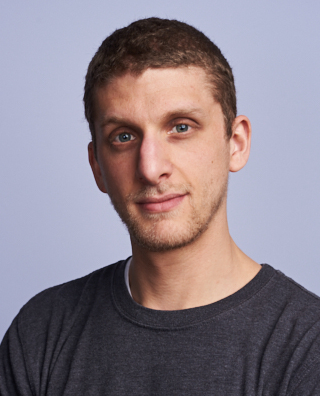 Background of CBS Research/Clinical/Volunteering efforts/achievements:
Background of CBS Research/Clinical/Volunteering efforts/achievements:
I am, at my core, a functional contextualist. My first experience in research was with Dr. Marsha Linehan, where I workid on a federally funded randomized trial of DBT for suicidal and self-harming adolescents. It was there where I was trained to view behavior from a functional perspective, influenced greatly by other third-wave therapies such as ACT and FAP. Shortly thereafter, I began working with Drs. Kohlenberg and Tsai in their efforts to establish a stronger empirical literature for FAP. Fast forward several years and I am now a fifth year graduate student at the University of Washington, where I have continued to pursue contextual-behavioral research agenda. For my master’s thesis, I led a multi-site scale development project aimed at measuring intimate relational functioning for use in FAP outcomes research. Since then, I have worked to develop CBS-informed interventions for couples and therapists at high risk of burnout, evaluated the current state of empirical research on FAP, and pursued research that aims to reduce the perpetration of racial microaggressions. Now, I am a lead researcher and study therapist on the largest-to-date randomized trial of FAP. My clinical work is also heavily influenced by CBS. I have worked with several clients in both inpatient and outpatient settings using ACT, FAP, and comprehensive DBT. I have reviewed several manuscript submissions for JCBS and served as the student representative for the FAP special interest group of ACBS since 2015. Last year, I served as a reviewer for the ACBS student spotlight awards.
Autobiography:
I am incredibly fortunate for the opportunities offered to me throughout my lifetime. As an undergraduate at the University of Washington, I worked with Dr. Marsha Linehan on a federally funded trial of DBT for adolescents who, despite their best efforts, struggled to build worth living. Shortly thereafter, Drs. Robert Kohlenberg and Mavis Tsai took me into their lab and trained me in the fundamental principles of FAP and contextual behavioral science. When Dr. Jonathan Kanter moved to the University of Washington, he hired me as his first research coordinator and then graduate student, we we have worked together on a variety of research projects aimed at improving social functioning and decreasing the perpetration of racial microaggressions. I am truly a product of my social environment and have worked diligently in my graduate career to pass my fortune along, particularly for underrepresented individuals in psychological science (e.g., students of color, first-generation students). For my dissertation, I am using idiographic research methods to understand how momentary feelings of loneliness are associated with changes in depressive symptomatology and hope to inform contextual-behavioral treatment efforts aimed at reducing the burden of these afflictions.
Future goals:
After graduate school, I hope to continue pursuing a research agenda focused on the ways in which social functioning outcomes can be improved by bridging the gap between CBS and relationship science.
Publications:
- Kuczynski, A. M., Kanter, J. W., & Robinaugh, D. J. (2019). Differential associations between interpersonal variables and quality-of-life in a sample of college students. Quality of Life Research. https://doi.org/10.1007/s11136-019-02298-3
- Kuczynski, A. M., Kanter, J. W., Wetterneck, C. T., Olaz, F. O., Singh, R. S., Lee, E. B., … Corey, M. D. (2019). Measuring intimacy as a contextual-behavioral process: Psychometric development and evaluation of the Awareness, Courage, and Responsiveness Scale. Journal of Contextual Behavioral Science. https://doi.org/10.1016/j.jcbs.2019.02.004
- Reyes Ortega, M. A., Kuczynski, A. M., Kanter, J. W., de Montis, I. A., & Santos, M. M. (2019). A preliminary test of a social connectedness burnout intervention for Mexican mental health professionals. The Psychological Record, 69(2), 267-276. https://doi.org/10.1007/s40732-019-00338-5
- Kanter, J. W., Kuczynski, A. M., Tsai, M., & Kohlenberg, R. J. (2018). A brief contextual-behavioral intervention to improve relationships: A randomized trial. Journal of Contextual Behavioral Science, 10, 75-84. https://doi.org/10.1016/j.jcbs.2018.09.001
- Kanter, J. W., Manbeck, K. E., Kuczynski, A. M., Maitland, D .W. M., Villas-Bôas, A., & Reyes Ortega, M. A. (2017). A comprehensive review of research on Functional Analytic Psychotherapy. Clinical Psychology Review, 58, 141-156. https://doi.org/10.1016/j.cpr.2017.09.010
- Kanter, J. W., Williams, M. T., Kuczynski, A. M., Manbeck, K. E., Debreaux, M., & Rosen, D. C. (2017). A preliminary report on the relationship between microaggressions against Black people and racism among White college students. Race and Social Problems, 9(4), 291-299. https://doi.org/10.1007/s12552-017-9214-0
- Maitland, D. W. M., Kanter, J. W., Manbeck, K. E., & Kuczynski, A. M. (2017). Relationship science informed clinically relevant behaviors in Functional Analytic Psychotherapy: The Awareness, Courage, and Love Model. Journal of Contextual Behavioral Science, 6(4), 347-359. https://doi.org/10.1016/j.jcbs.2017.07.002
- Maitland, D. W. M., Kanter, J. W., Tsai, M., Kuczynski, A. M., Manbeck, K. E., & Kohlenberg, R. J. (2016). Preliminary findings on the effects of online Functional Analytic Psychotherapy training on therapist competency. The Psychological Record, 66(4), 627-637. https://doi.org/10.1007/s40732-016-0198-8
- Haworth, K., Kanter, J. W., Tsai, M., Kuczynski, A. M., Rae, J. R., & Kohlenberg, R. J. (2015). Reinforcement matters: A preliminary, laboratory-based component-process analysis of Functional Analytic Psychotherapy's model of social connection. Journal of Contextual Behavioral Science, 4(4), 281-291. https://doi.org/10.1016/j.jcbs.2015.08.003
- Kohlenberg, R. J., Tsai, M., Kuczynski, A. M., Rae, J. R., Lagbas, E. Lo, J., & Kanter, J. W. (2015). A brief, interpersonally oriented mindfulness intervention incorporating Functional Analytic Psychotherapy's model of awareness, courage and love. Journal of Contextual Behavioral Science, 4(2), 107-111. https://doi.org/10.1016/j.jcbs.2015.03.003
Student Spotlight Award Recipient - Alison Stapleton
Student Spotlight Award Recipient - Alison StapletonCongratulations to Alison Stapleton on being selected as the Student Spotlight Award winner for October 2020!
The purpose of this award is to highlight students who are doing important work in the CBS community whether for research, clinical, and/or volunteer-humanitarian efforts.
This is a way to highlight their achievements, let the ACBS community know important work students are doing, and possibly provide a platform for mentoring, collaboration, professional development, and conversations around highlighted areas.
Learn more about Alison: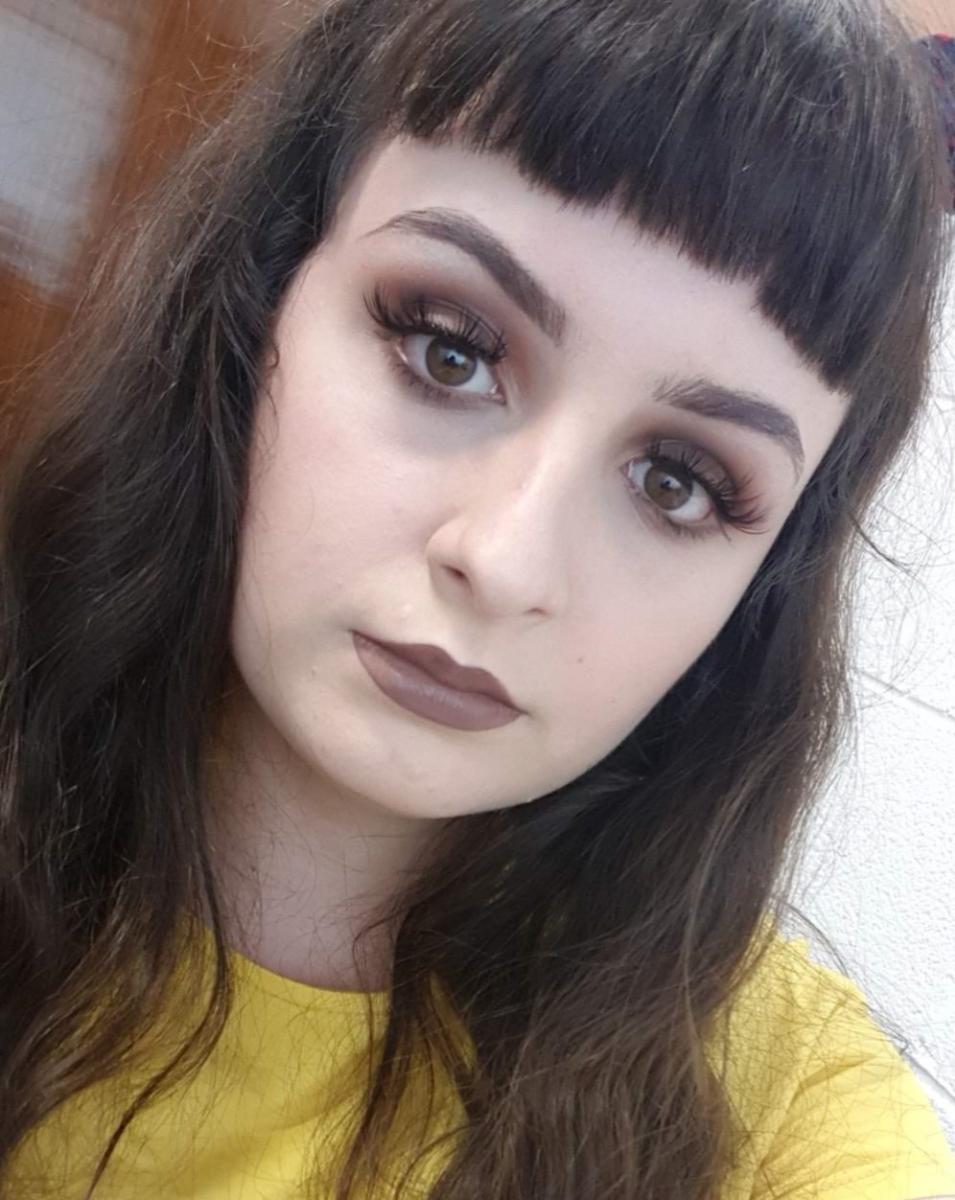
Background of CBS Research/Clinical/Volunteering efforts/achievements:
Throughout my academic career, I have been involved in CBS research projects. My undergraduate thesis (in press in JCBS) examined the relationships between health values directed behavior and engagement in health-related behaviors. My first PhD study, examining adaptive correlates of adolescents’ generalized pliance, was also recently published in JCBS. I am currently extending this line of research, doing much-needed work to consolidate theoretical perspectives on rule-governed behavior, and using text-based conversational agents (chatbots) to promote flexible rule-following. Beyond my PhD research, I am the lead on a systematic review examining the use of metaphor in ACT and on a project evaluating brief ACT interventions for academic procrastination (funded by the Higher Education Authority). I recently contributed to a paper using the Functional Self-Discrimination Measure with members of the homeless population and I am coordinating a large cross-cultural study with CBS labs around the world. I am passionate about dissemination and making CBS accessible. In addition to publishing manuscripts and presenting CBS research at national and international conferences, I produce CBS videos and blog posts with an abundance of pop culture references to facilitate effective and engaging knowledge transfer. I am also currently contributing to outreach programs that aim to provide the public with CBS skills to cope with the COVID-19 pandemic (e.g., the #FEELINGBetter initiative and Power of Small Workshops). I truly believe CBS can alleviate human suffering if we strive to collaborate, engage in effective knowledge transfer, and produce high-quality research, all practices I am committed to.
Autobiography:
I’m from Dublin, Ireland, and was the first in my family to attend university, graduating from University College Dublin with a BA in Psychology. I was introduced to CBS by my BA thesis supervisor, Professor Louise McHugh, who then took me on for my PhD. Now in the second year of my PhD, I realize how exceptionally lucky I’ve been. Being able to work and grow within the CBS community, while having an exemplary mentor who truly cares about my development, is an absolute privilege. CBS has completely changed my life, from the philosophical approach I adopt in my research, to the ACT techniques I use to manage everyday living. Through the CBS community, I have met amazing friends and collaborators who have been instrumental in supporting my research. Being able to conduct cross-cultural research within a range of contexts has been invaluable, allowing me to start making a serious contribution to the CBS literature. My main topic of interest is rule-following with regard to cultural context, gender, and socio-economic status. I am currently trying to enhance our understanding of rule-following in accordance with RFT and developing interventions to enhance adolescents’ flexible rule-following. When I am not stressing about my PhD, you can find me crying over the “purple book” and justifying my Netflix binging by saying it facilitates me living in line with my value of “Connection”. I still have a lot to learn, but I am beyond grateful for the opportunity to do so within our CBS community.
Future goals:
I want to continue increasing accessibility to CBS and engaging in collaborative projects alongside CBS labs around the world to stay in academia and make a meaningful contribution to the ACBS community.
Relevant publications:
Stapleton, A. (2020). Choosing not to follow rules that will reduce the spread of COVID-19. Journal of Contextual Behavioral Science, 17, 73-78. https://doi.org/10.1016/j.jcbs.2020.07.002
Stapleton, A. & McHugh, L. (2020). Adolescent correlates of the Generalized Pliance Questionnaire – Children. Journal of Contextual Behavioral Science, 15, 131-134. https://doi.org/10.1016/j.jcbs.2019.12.006
Stapleton, A., O’Connor, M., Feerick, E., Kerr, J. & McHugh, L. (2020). Testing the relationship between health values consistent living and health-related behavior. Journal of Contextual Behavioral Science, 17, 17-22. https://doi.org/10.1016/j.jcbs.2020.05.002
Stapleton, A., Ruiz, F. J., & McHugh, L. (2020). Comparative investigation of adolescents’ generalized pliance and psychological inflexibility across cultural contexts. The Psychological Record. https://doi.org/10.1007/s40732-020-00412-3
Stapleton, A. & McHugh, L. (2020, February 5). Rule one: No rules! [Blog post]. Retrieved from https://science.abainternational.org/rule-one-no-rules/louise-mchughucd-ie/
Student Spotlight Award Recipient - Amanda Chastain
Student Spotlight Award Recipient - Amanda ChastainThe purpose of this award is to highlight students who are doing important work in the CBS community whether for research, clinical, and/or volunteer-humanitarian efforts.
This is a way to highlight their achievements, let the ACBS community know important work students are doing, and possibly provide a platform for mentoring, collaboration, professional development, and conversations around highlighted areas.
Congratulations to Amanda Chastain on being selected as the Student Spotlight Award winner for August 2022!
Learn more about Amanda Chastain: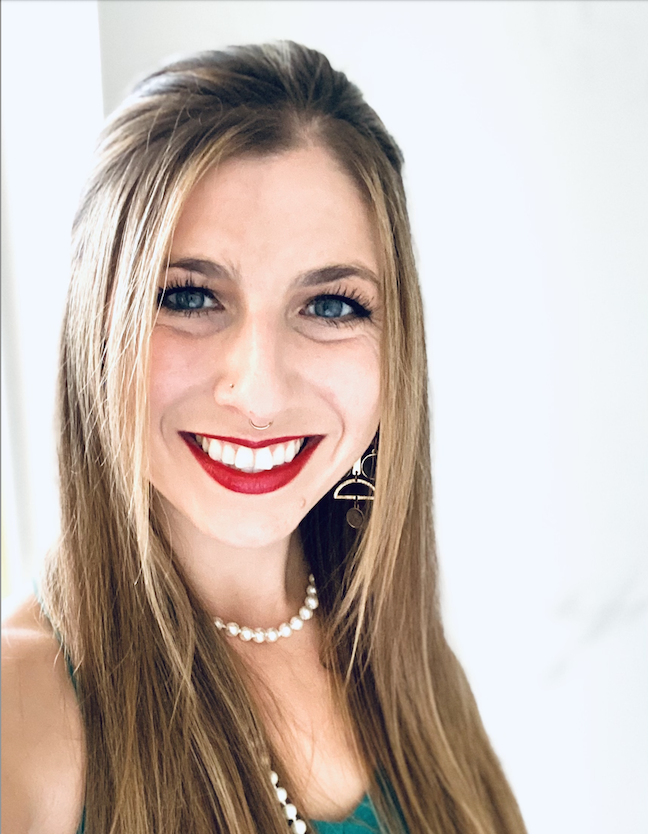
Background of CBS Research/Clinical/Volunteering efforts/achievements:
I have participated in the CBS community through my research and practice over the last number of years. After becoming completely captivated by what Relational Frame Theory and Acceptance and Commitment Therapy had to offer, I worked to expand my understanding of the relationship between complex verbal behavior and our environment, in generating and refining tools such as ACT to more systematically and efficiently support individuals, and in closing the gap between research and practice within complex verbal behavior and psychological well-being.
I volunteered at the University of Southern California, where I worked with the students and faculty to develop and conduct research in ACT. Examples of projects include the effects of ACT on staff burnout in ABA, physical health of college students, ACT for individuals with developmental disabilities, and studying the effects of components of ACT on delay discounting. I have also worked with a team of scientist-practitioners in the development of the ACT Functional Analysis.
During my time as a Clinician/BCBA, I was given many opportunities to train others in my field on how to incorporate RFT and ACT into their programming. Simultaneously, I was a co-author of an article outlining how ACT may be useful in promoting psychological flexibility at the beginning of the pandemic, and for the chapter on ACT in ABA in the Oxford Handbook of Acceptance and Commitment Therapy. I regularly present at conferences in the form of posters and symposia, in addition to the occasional workshop or invited talk for ABA and ACT organizations.
Autobiography:
I completed my master’s degree in Psychology (Applied Behavior Analysis) at California State University, Sacramento, where I studied verbal behavior and stimulus equivalence. Through evaluating verbal behavior around my own struggles, I realized that it plays an important role in psychological well-being and the way that we experience the world around us, leading to my obsession with ACT and RFT.
Realizing then that my lifelong academic journey was just beginning, I moved to Los Angeles to receive training and supervision in ACT. During this time, I worked as a Senior Research Associate at the University of Southern California under the supervision of Dr. Jonathan Tarbox and as a Lab Manager for the ACT/Prosocial lab with Dr. Thomas Szabo. With the support of my mentors, I worked to build upon my existing knowledge in verbal behavior, relational frame theory, and ACT, while participating in several publications and conference presentations along the way. As a result of my mentors’ ongoing support, I have also been invited to give additional trainings for BCBAs to do my part in closing the gap between research and practice.
I am currently working on my PhD in Rehabilitation Sciences at the University of Illinois at Chicago, under the co-supervision of Dr. Mark Dixon and Dr. Tamar Heller. This has allowed me the opportunity to continue basic, translational, and applied research in complex verbal behavior and Acceptance and Commitment Therapy, while also working towards making a career out of my greatest passion by becoming a professor.
Future goals:
I hope to contribute to our understanding of complex verbal behavior at the group and individual levels for the purpose of refining current interventions (e.g., ACT, Prosocial) to make them more individualized, systematic, effective, and efficient.
Relevant publications:
Tarbox, J., Chastain, A. N. & Szabo, T.G. (In press). Acceptance and commitment therapy inside behavior analysis. In Twohig, M.P., Levin, M.E., & Petersen, J.M. (Eds.), The Oxford Handbook of Acceptance and Commitment Therapy. Oxford University Press.
Chastain, A.N., Tarbox, J., Meshes, E., Wang, Y. (2022). A Pilot Study: Evaluating the Effects of Defusion on Choice Making Under Negative and Positive Reinforcement Contingencies. The Psychological Record. https://doi.org/10.1007/s40732-022-00511-3 (https://link.springer.com/article/10.1007/s40732-022-00511-3)
Chastain, A.N, Love, S., Luoma, S., Miguel, C.(2022) The Role of Irrelevant, Class-Consistent, and Class-Inconsistent Intraverbals on the Establishment of Equivalence Classes. The Psychological Record. https://doi.org/10.10071540732-021-00492-9 (https://link.springer.com/article/10.1007/s40732-021-00492-9)
Pyles, M.L., Chastain, A.N. & Miguel, C.F. (2021) Teaching Children with Autism to Mand for Information Using “Why?” as a Function of Denied Access. The Analysis of Verbal Behavior. https://doi.org/10.1007/s40616-020-00141-2 (https://link.springer.com/article/10.1007/s40616-020-00141-2)
Wang, Y., Tarbox, J., Chastain, A., Cameron, M. (2020). The Effects of Bilingual Acceptance and Commitment Training on Exercise in Bilingual International University Students. Journal of Contextual Behavioral Sciences. https://doi.org/10.1016/j.jcbs.2020.08.002 (https://www.sciencedirect.com/science/article/pii/S221214472030168X)
Tarbox, C.M., Silverman, E.A., Chastain, A.N., Little, A., Bermudez, T.L., Tarbox, J. (2020).Taking ACTion: 18 Simple Strategies for Supporting Children With Autism During the COVID-19 Pandemic. Behavior Analysis in Practice. https://doi.org/10.1007/s40617-020-00448-5 (https://www.ncbi.nlm.nih.gov/pmc/articles/PMC7466929/)
Student Spotlight Award Recipient - Amanda Rhodes
Student Spotlight Award Recipient - Amanda RhodesCongratulations to Amanda Rhodes on being selected as the Student Spotlight Award winner for September 2018!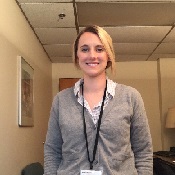
The purpose of this award is to highlight students who are doing important work in the CBS community whether for research, clinical, and/or volunteer-humanitarian efforts.
This is a way to highlight their achievements, let the ACBS community know important work students are doing, and possibly provide a platform for mentoring/collaboration/professional development/conversations around highlighted areas.
Learn more about Amanda:
Background of CBS Research/Clinical/Volunteering efforts/achievements:
I became involved in the CBS community during the first year of my doctoral program in Combined Clinical and School Psychology at Kean University in the Greater New York City Area. I began my journey by researching psychological flexibility and emotion regulation in undergraduate students. In addition, my interest in CBS sparked my applied ACT work with clinical populations. In the past few years, I have expanded my use of ACT and other mindfulness-based approaches (ERT) to in clinical populations including college students, adult outpatient, adult inpatient, and medical populations. Through my doctoral work, I have become increasingly interested in co-occurring psychological and physiological difficulties. My doctoral dissertation examined how risk of opioid misuse is affected by pain severity, pain interference, and early aversive histories in patients with noncancerous chronic pain. My data analysis suggested that psychological flexibility (examined by the AAQ-II) plays a significant and specific role in many of these pathways, providing important information on the developing opioid crisis in the United States and around the world. I look forward to presenting this data in an accepted symposium at ACBS World Conference 16 titled “ACT for People with Pain: What We Still Have to Learn.” Next year, I am continuing my CBS journey through an APA-accredited internship at Brattleboro Retreat (Vermont, US) rolling out ACT for trauma in uniformed service personnel and a Mind-Body Pain Management program.
Autobiography:
I was born and raised in the suburbs of New York City. I am currently a 4th doctoral candidate in Combined Clinical and School Psychology at Kean University. Before my doctoral studies, I received a Bachelor’s Degree in Psychology from Lehigh University in Bethlehem, PA. I’ve been developing my theoretical orientation in contextual behavioral science my whole life, but just didn’t know it. Long hikes with my dad to remote mountain peaks were exercises in mindfulness -- tuning into the beauty of nature while observing, with curiosity, variations in my inner human experience. Growing up with the freedom to pursue my dreams and take responsibility for my own life was existentialism before I even knew how to spell it. Ultimately, I was drawn instantly to ACT with its blend of mindfulness- and acceptance-based behaviorism and values-based existentialism. I have been studying, exploring, and applying ACT since the day it was introduced to me and I look forward to a life time of inquiry and curiosity in the CBS community. Now that my dissertation is defended, I have been able to shift my attention towards other important life values like yoga, hiking with my dog, Karl, and spending time with family, friends, and husband.
Future goals:
In the near future, I have two main goals. The first is to conduct more research on the underlying mechanisms influencing the subjective experience of physical pain and become certified in Mindfulness-Based Stress Reduction (MBSR) in order to expand my applied clinical work with pain populations. My second goal (value) is to lean in to the 'full catastrophe' of everything that life as to offer and the many challenges ahead as I develop my professional identity as a future clinical health psychologist.
Student Spotlight Award Recipient - Anne I. Roche
Student Spotlight Award Recipient - Anne I. RocheCongratulations to Anne I. Roche on being selected as the Student Spotlight Award winner for March 2021!
The purpose of this award is to highlight students who are doing important work in the CBS community whether for research, clinical, and/or volunteer-humanitarian efforts.
This is a way to highlight their achievements, let the ACBS community know important work students are doing, and possibly provide a platform for mentoring, collaboration, professional development, and conversations around highlighted areas.
Learn more about Anne I. Roche:
Background of CBS Research/Clinical/Volunteering efforts/achievements: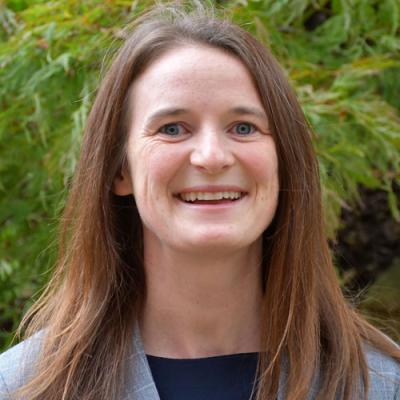
My research as a graduate student has focused on the association between acceptance and mindfulness processes and behavioral, physical, and psychological outcomes. I have studied acceptance and mindfulness across the lifespan, from adolescence to older adulthood. My principal aim is to contribute to the identification of modifiable targets for psychological intervention. My dissertation project, mentored by my wonderful advisor Dr. Natalie Denburg, is a randomized controlled trial examining the impact of group ACT on psychological outcomes (e.g., well-being) in community-dwelling older adults. Older adults inevitably experience a variety of life changes, and the limited research focused on promoting well-being in this population is a diversity issue at both an individual and societal level. I am hopeful that my dissertation will provide useful insights into the potential utility of acceptance- and mindfulness-based interventions in this growing proportion of our population. Concurrently, our group is working to validate existing ACT measures this population. Most recently, I have contributed to research examining mental health during the COVID-19 pandemic and how ACT processes may serve as protective factors during this time period.
Clinically, I have had strong training in ACT and other CBS-based interventions from mentors such as Dr. James Marchman and Dr. Emily Kroska at the University of Iowa. Beyond the excellent training in my graduate program, I have sought additional in-person and online training workshops from CBS practitioners. I have had the opportunity to deliver CBS-based interventions in a variety of different settings and with both individuals and groups with diverse presenting concerns. I have delivered ACT interventions with domestic violence victims (group setting), with domestic violence offenders (individually), and with community-dwelling older adults (group setting). Additionally, I have had the opportunity to provide tiered teaching and supervision to junior clinical psychology students in delivering evidence-based behavioral interventions.
Autobiography:
I am a sixth-year graduate student at the University of Iowa, where I am mentored by Dr. Natalie Denburg. I am currently completing my clinical internship at the University of Kansas Medical Center. I was introduced to ACT during my first year of graduate school, and I was immediately hooked. I have had the opportunity to be trained in functional contextualism by exceptional teachers such as Dr. James Marchman and Dr. Emily Kroska who have instilled in me a passion for learning, delivering, sharing, teaching, and living ACT. I have now had the chance to attend three ACBS World Conferences which have inspired and fed my curiosity and desire to learn. I hope to pursue a career that allows me to combine clinical, research, teaching, and supervision activities that will contribute to the CBS community and help to impact lives with CBS approaches.
Outside of my graduate training, my values include my amazing and loving family and my dear friends. Years ago, I played college basketball, and I still very much enjoy following sports, being active, and spending time outdoors.
Future goals:
I hope to pursue a career that allows me to explore, deliver, teach/supervise, and disseminate ACT and other CBS-based interventions.
Relevant publications:
Kroska, E.B., Roche, A. I., Adamowicz, J.L., & Stegall, M.S. (2020). Psychological flexibility in the context of COVID-19 adversity: Associations with distress. Journal of Contextual Behavioral Science, 18, 28-33. https://www.ncbi.nlm.nih.gov/pmc/articles/PMC7406424/
Kroska, E.B., Roche, A.I., & O’Hara, M.W. (2020). How much is enough in brief acceptance and commitment therapy? Journal of Contextual Behavioral Science, 15, 235-244. https://www.sciencedirect.com/science/article/abs/pii/S2212144719302364?via%3Dihub
Green, M. A., Miles, L., Sage, E., Smith, J., Carlson, G., Hogan, K., Bogucki, J., Ferenzi, L., Hartman, E., Tao, Y., Peng, Y., Roche, A.I., Bolenbaugh, M.A., Wienkes, C., Garrison, Y., & Eilers, S. ... & Peng, Y. (2020). Cardiac biomarkers of disordered eating as a function of diagnostic subtypes. Eating Behaviors, 39, 101425.
Howren, M.B, Christensen, A.J., & Roche, A.I. (2020). Cognitive behavioral and eHealth approaches to promote engagement in treatment. In A. Hadler, S. Sutton, & L. Osterberg, (Eds), The Wiley Handbook of Healthcare Treatment Engagement (pp. 223-242). John Wiley & Sons, Inc. https://onlinelibrary.wiley.com/doi/abs/10.1002/9781119129530.ch12
Roche, A.I. (2019). Testing for testamentary capacity in the older adult: A model of ethical considerations for the clinical neuropsychologist. Frontiers in Psychology, 10, 1905.
Pierson, M.M., Roche, A.I., & Denburg, N.L. (2019). Mindfulness, experiential avoidance, and affective experience in older adults. Journal of Contextual Behavioral Science, 14, 32-36. https://www.sciencedirect.com/science/article/pii/S2212144719300341
Roche, A.I., Kroska, E.B., & Denburg, N.L. (2019). Acceptance- and mindfulness-based interventions for smoking cessation and weight loss: Systematic reviews and meta-analyses. Journal of Contextual Behavioral Science, 13, 74-93. https://www.sciencedirect.com/science/article/abs/pii/S2212144718302722
Vélez-Bermúdez, M., Christensen, A. J., Kinner, E. M., Roche, A. I., & Fraer, M. (2019). Exploring the relationship between patient activation, treatment satisfaction, and decisional conflict in patients approaching end stage renal disease. Annals of Behavioral Medicine, 53, 816-826.
Roche, A.I., Kroska, E.B., Miller, M.M., Kroska, S.K., & O’Hara, M.W. (2019). Childhood trauma and problem behaviors: Examining the mediating roles of experiential avoidance and mindfulness processes. Journal of American College Health, 67, 17-26. https://www.tandfonline.com/doi/abs/10.1080/07448481.2018.1455689
Kroska, E.B.*, Roche, A.I.*, & O’Hara, M.W. (2018). Childhood trauma and somatization: Identifying mechanisms for targeted intervention. Mindfulness, 9, 1845-1856. https://link.springer.com/article/10.1007/s12671-018-0927-y
Kroska, E. B., Miller, M. L., Roche, A. I., Kroska, S. K., & O’Hara, M. W. (2018). Effects of traumatic experiences on obsessive-compulsive and internalizing symptoms: The role of avoidance and mindfulness. Journal of Affective Disorders, 225, 326-336. https://www.sciencedirect.com/science/article/abs/pii/S0165032717308005
Manuscripts Under Review
Roche, A. I., Adamowicz, J. L., Stegall, M. S., Toovey, C.R., & Kroska, E.B. (under review). College student resilience during COVID-19: Examining the roles of mindfulness, compassion, and prosocial behavior.
Student Spotlight Award Recipient - Carter Haskell Davis
Student Spotlight Award Recipient - Carter Haskell DavisCongratulations to Carter Haskell Davis on being selected as the Student Spotlight Award winner for February 2022!
The purpose of this award is to highlight students who are doing important work in the CBS community whether for research, clinical, and/or volunteer-humanitarian efforts.
This is a way to highlight their achievements, let the ACBS community know important work students are doing, and possibly provide a platform for mentoring, collaboration, professional development, and conversations around highlighted areas.
Learn more about Carter Haskell Davis:
Background of CBS Research/Clinical/Volunteering efforts/achievements: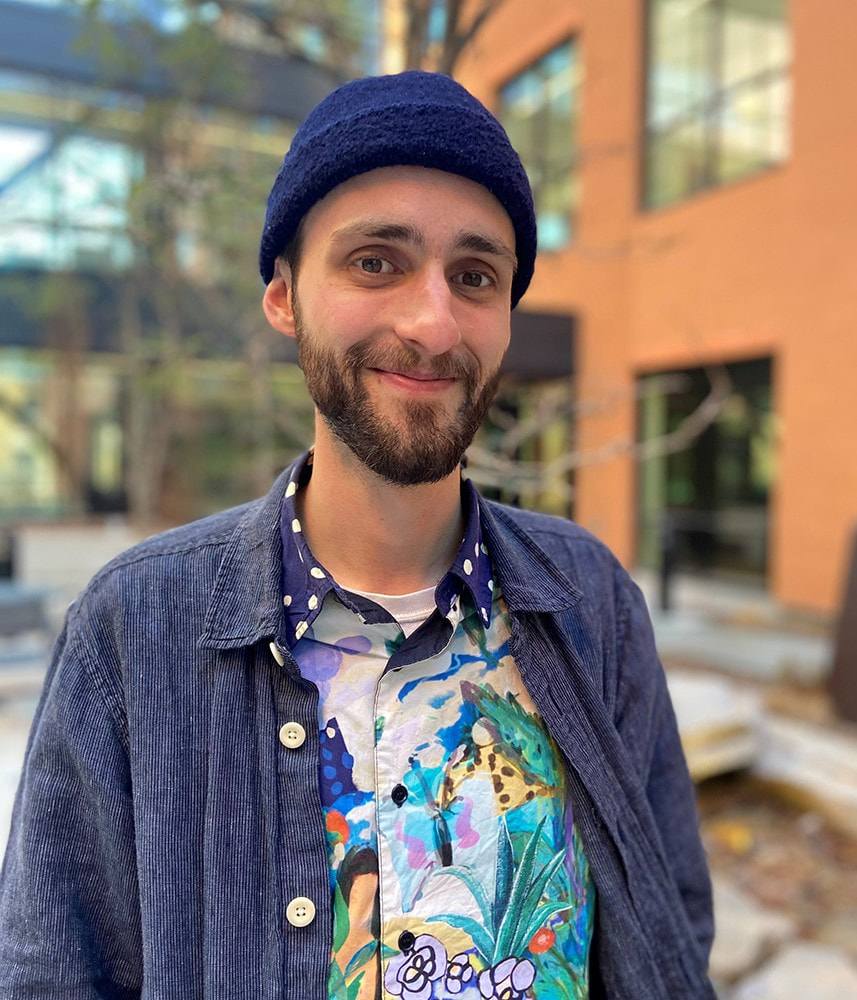
I was first introduced to CBS in 2013, when I volunteered to teach art classes at a psychiatric hospital where there happened to be very active ACT research and implementation going on. It changed the course of my life professionally and personally. I was working in the fine arts field at the time, and decided to switch careers and eventually pursue a PhD in Clinical Psychology. This was because I saw the potential of CBS to help so many people who were suffering deeply. It also expanded my own worldview in a way that has brought me so much joy. Professionally, I worked full time in an ACT for psychosis lab with Brandon Gaudiano at Brown University for two years. Brandon taught me how to be a scientist. I then entered grad school where I have been conducting research for four years with Michael Levin and Michael Twohig in the ACT Research Group at Utah State University. My research focuses on widespread dissemination of ACT through accessible self-help means in order to fill critical caps in public health. For instance, my dissertation project is a clinical trial of antidepressants versus a storytelling-based ACT intervention for individuals who are not currently working with a mental health professional. I also work as a therapist in an ACT speciality clinic where I treat both community members as well as Division I student-athletes at Utah State.
Autobiography:
I grew up in New York City and began my career as a visual artist, including working in several fine arts printing presses. A pivotal experience volunteering to teach art at a psychiatric hospital marked a turning point in my path, inspiring a transition into the field of clinical psychology. I am currently a fourth-year PhD student in Clinical Psychology at Utah State University. In addition to my academic and clinical pursuits, I enjoy painting, and I occasionally lead meditation groups in my local community.
Future goals:
I hope to become a clinical psychologist who both provides treatment and conducts research so that CBS can touch even more areas where there is suffering.
Relevant publications:
Davis, C.H., Gaudiano, B.A., McHugh, L., & Levin, M.E. (2021). Integrating storytelling into the science and practice of contextual behavioral science. Journal of Contextual Behavioral Science, 20, 155-162.
https://doi.org/10.1016/j.jcbs.2021.04.004
Davis, C.H., Krafft, J., Hicks, E.T., & Levin, M.E. (2021). The role of psychological inflexibility and perspective taking in anti-racism and anti-sexism. Personality and Individual Differences, 175.
https://doi.org/10.1016/j.paid.2021.110724
Gaudiano, B.A., Davis, C.H., Miller, I.W., & Uebelacker, L.A. (2020). Pilot randomized controlled trial of a video self-help intervention for depression based on acceptance and commitment therapy: Feasibility and acceptability. Clinical Psychology and Psychotherapy, 27(3), 396-407. https://doi.org/10.1002/cpp.2436
Student Spotlight Award Recipient - Clarissa Ong
Student Spotlight Award Recipient - Clarissa OngCongratulations to Clarissa Ong on being selected as the Student Spotlight Award winner for December 2019!
The purpose of this award is to highlight students who are doing important work in the CBS community whether for research, clinical, and/or volunteer-humanitarian efforts.
This is a way to highlight their achievements, let the ACBS community know important work students are doing, and possibly provide a platform for mentoring/collaboration/professional development/conversations around highlighted areas.
Learn more about Clarissa:
 Background of CBS Research/Clinical/Volunteering efforts/achievements:
Background of CBS Research/Clinical/Volunteering efforts/achievements:
I started researching and practicing ACT in 2015 in graduate school under the mentorship of Dr. Michael Twohig. My research in ACT initially focused on obsessive-compulsive and related presentations, especially hoarding, and broadened to functionally defined presentations like clinical perfectionism. My dissertation examined the effect of ACT on clinical perfectionism and, more broadly, tested the feasibility of using a process-based approach to treat a functionally defined concern. Currently, my research focuses on evaluating interventions and assessments through the lens of process-based therapy and using theory and data to make treatments more parsimonious, effective, and accessible to those who need them. I have also used ACT in my clinical practicums in various formats including individual therapy in a community clinic and group therapy in a residential eating disorder treatment center. While ACT is a central piece of my work, I see clinical RFT, functional contextualism, and the model of process-based therapy as comprising the theoretical backdrop for my research and clinical endeavors. Thus, I strive to actively incorporate scientific principles, empirical evidence, and considerations of individual characteristics in my case conceptualizations and study designs. Given my value of supporting others in their pursuit of fulfilling lives, I hope to use my knowledge and skills to develop effective, efficient, and accessible treatments so the mental health field can maximize the positive impact of available resources.
Autobiography:
I spent the first 18 years of my life in Singapore and attended college in Massachusetts where I grew to value social consciousness and activism. My value of equity has driven me to investigate ways to make helpful treatments more accessible and to consider how intersecting identities influence the people with whom I work including clients and colleagues. I have been living in Utah for the past 4.5 years attending graduate school at Utah State University. This is where I fell in love with the mountains and rock climbing, which is what you will find me doing when I am not working or sleeping. Besides climbing, I like reading, watching The Great British Bakeoff, scrolling through dog adoption webpages, and learning how to make downward-facing dog a resting pose in yoga.
Future goals:
My goal is to use my knowledge and skills to develop effective, efficient, and accessible treatments that will empower people to move toward the life they freely choose for themselves.
Relevant publications:
Ong, C. W., Barney, J. L., Barrett, T. S., Lee, E. B., Levin, M. E., & Twohig, M. P. (2019). The role of psychological inflexibility and self-compassion in acceptance and commitment therapy for clinical perfectionism. Journal of Contextual Behavioral Science, 13, 7-16. https://doi.org/10.1016/j.jcbs.2019.06.005
Ong, C. W., Lee, E. B., Krafft, J., Terry, C. L., Barrett, T. S., Levin, M. E., & Twohig, M. P. (2019). A randomized controlled trial of acceptance and commitment therapy for clinical perfectionism. Journal of Obsessive-Compulsive and Related Disorders, 22, 100444. https://doi.org/10.1016/j.jocrd.2019.100444
Ong, C. W.*, Lee, E. B.*, Levin, M. E., & Twohig, M. P. (2019). A review of AAQ variants and other context-specific measures of psychological flexibility. Journal of Contextual Behavioral Science, 12, 329-346. https://doi.org/10.1016/j.jcbs.2019.02.007 [*Co-first authors.]
Student Spotlight Award Recipient - Conor McCloskey
Student Spotlight Award Recipient - Conor McCloskeyCongratulations to Conor McCloskey on being selected as the Student Spotlight Award winner for February 2023!
The purpose of this award is to highlight students who are doing important work in the CBS community whether for research, clinical, and/or volunteer-humanitarian efforts.
This is a way to highlight their achievements, let the ACBS community know important work students are doing, and possibly provide a platform for mentoring, collaboration, professional development, and conversations around highlighted areas.
Learn more about Conor McCloskey: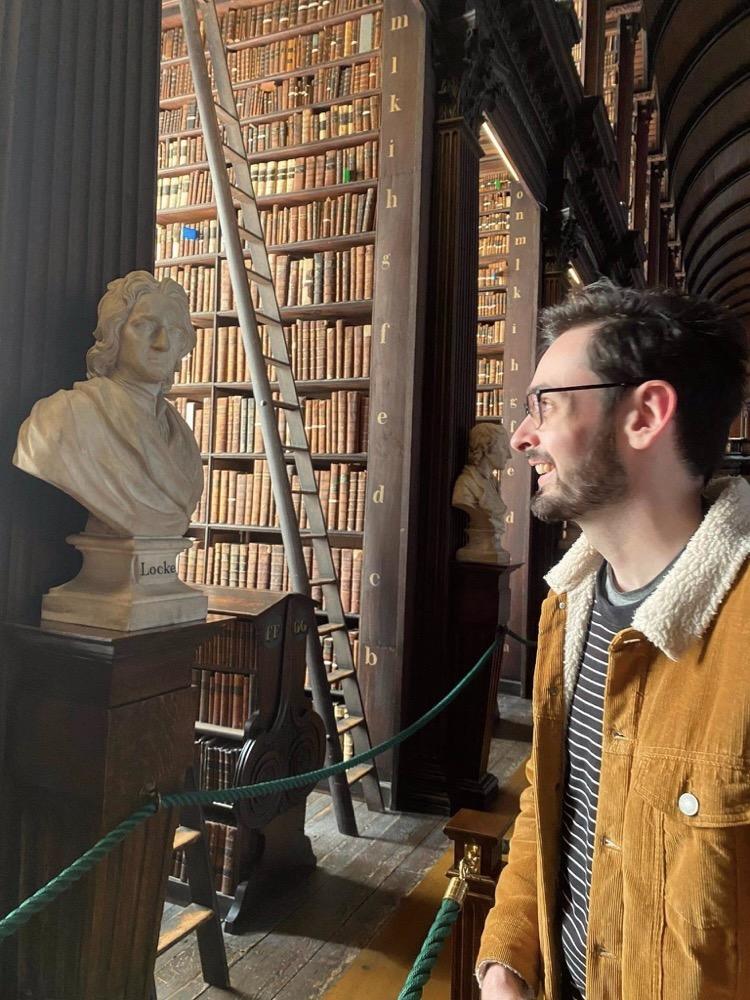
Background of CBS Research/Clinical/Volunteering efforts/achievements:
My ongoing PhD research looks at Rule-Following in line with Relational Frame Theory, and how it can help improve clinical practice. This basic work has previously been used to develop theories about clinical communication (i.e. how clinicians should talk to their clients to maximise treatment effectiveness), such as the use of metaphors in Acceptance and Commitment Therapy. My PhD is seeking to understand the precise contribution that rule-governed behaviour plays in this process. Additionally, I am working on a rule-governed behaviour study looking at the role that generalised pliance plays within educational choice in low-income communities, as in Ireland, many individuals from underprivileged communities do not attend college despite it being free. Coming from a similar low-income background, I believe that my basic research can go on to produce better outcomes in these communities. I have published research around rule-governed behaviour and COVID-19 public health adherence in the past. I have also volunteered in a number of roles for the Association for Contextual Behavioral Science (ACBS), most notably as the incoming President of the Contextual Philosophy of Science Special Interest Group within ACBS, as well as a number of smaller roles such as a member of the EvoSci Special Interest Group Sprint Group, in which we set out to better clarify the purpose of the group. Overall, I am a passionate CBS researcher and an engaged member of ACBS.
Autobiography:
I recall being interested in psychology from a very young age, primarily stemming from a will to understand why people act badly when there is so much good in the world. This interest guided me very gradually to a to a lecture on relational frame theory (RFT) that I attended as a second year undergraduate student. The elegance of the theory instantly captured my interest more than anything I had ever come across prior to that, and since then I have spent countless hours studying RFT in order to better understand it and to understand how I can contribute to it. This passion brought me to the University College Dublin Contextual Behavioural Science lab, where I conduct research under the supervision of Professor Louise McHugh and with the guidance of the other lab members. The level of brilliance that emanates from this lab is like nothing I have ever witnessed, and I believe that the support and kindness of its coordinator and members, past and present, is the key to the research that comes out from it.
Outside of my research I am a keen reader with a particular fondness for the Irish writer James Joyce. I have written about Joyce and CBS principles for public readership in the past. I am also a keen musician – when I was younger I knew I wanted to be a famous musician if I couldn’t be a psychologist.
Future goals:
I aim to continue to work a basic RFT researcher and to explore the philosophical foundations of CBS and the developmental account of derived relational responding.
Relevant publications:
McCloskey, C., Stapleton, A., Collins, S., Hagshenas, P., Kelly, J., Kenny, S., Rodin, C., & McHugh, L. (2022). The Psychometric Properties of the Values Clarity Questionnaire and its Relationship to Psychological Flexibility. PsyArXiv. https://doi.org/10.31234/osf.io/z9p6x
Stapleton, A., McCloskey, C. & McHugh, L., (2022). Exploring the relationships between rule-governed behavior and adherence to guidelines aiming to reduce the spread of COVID-19. Journal of Contextual Behavioral Science, 25, 73-77. https://doi.org/10.1016/j.jcbs.2022.06.005
McCloskey, C. (2022). Evolutionary Science in Joyce’s Ulysses. This View of Life. https://thisviewoflife.com/evolutionary-science-in-joyces-ulysses/
McCloskey, C. (2020). Effective Communication and Vaccinations: An Uphill Battle. The College Tribune. https://collegetribune.ie/effective-communication-and-vaccinations-an-uphill-battle/
Student Spotlight Award Recipient - Diana Cox
Student Spotlight Award Recipient - Diana CoxCongratulations to Diana Cox on being selected as the Student Spotlight Award winner for September 2024!
The purpose of this award is to highlight students who are doing important work in the CBS community whether for research, clinical, and/or volunteer-humanitarian efforts.
This is a way to highlight their achievements, let the ACBS community know important work students are doing, and possibly provide a platform for mentoring, collaboration, professional development, and conversations around highlighted areas.
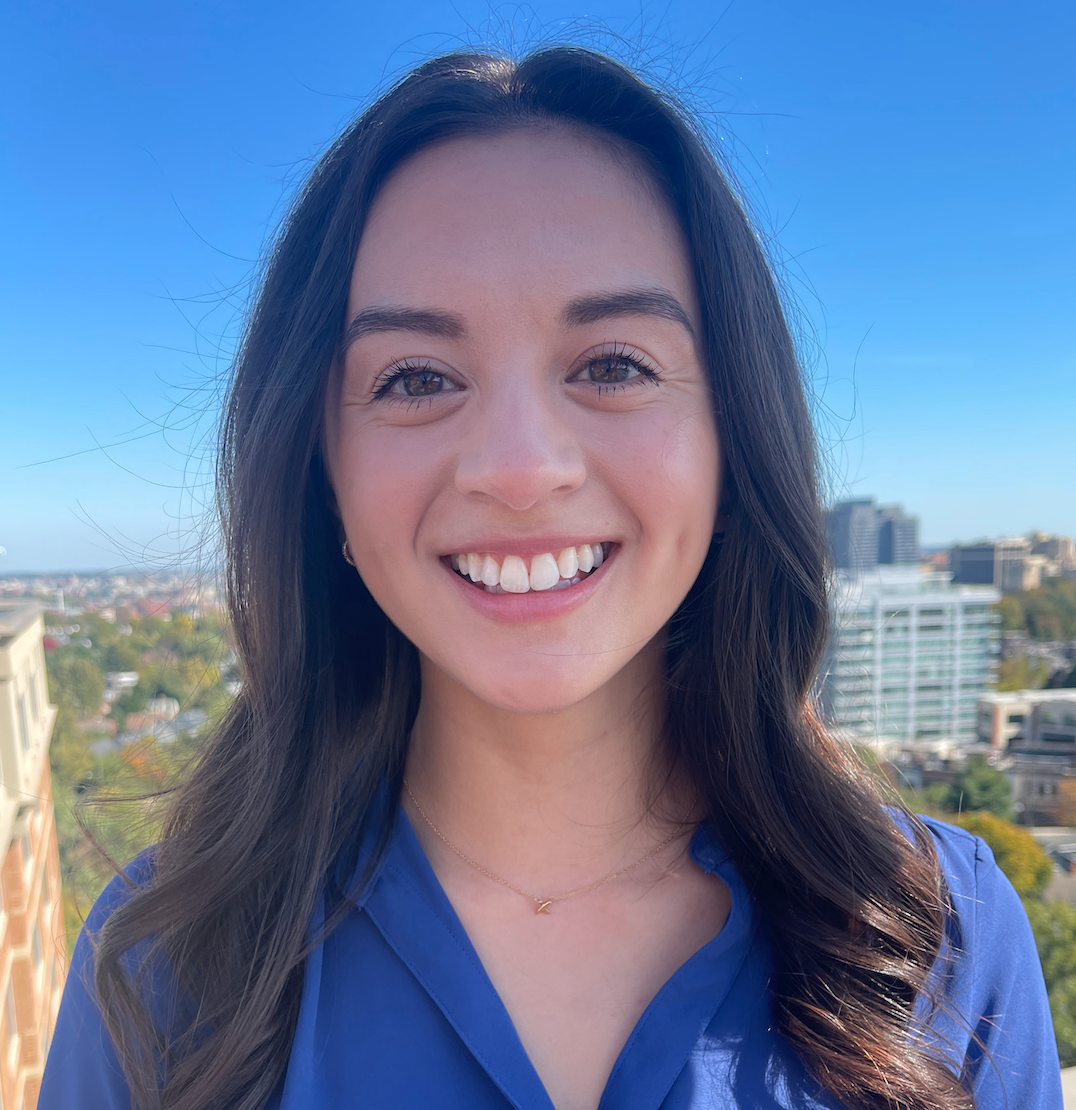
Learn more about Diana Cox
Background of CBS Research/Clinical/Volunteering efforts/achievements:
My first introduction to contextual behavioral science (CBS) was when I worked with veterans who had HIV in the Washington DC VA’s Infectious Disease Clinic. Though my traditional cognitive behavioral therapy knowledge was useful in this setting, I noticed that my patients, many of whom had been living with their chronic illness for years, responded positively to Acceptance and Commitment Therapy (ACT). This informed my decision to gain more intensive ACT training by working with Miranda Morris and Evan Marks at their ACT-focused private practice, True North, so I could better understand the theoretical underpinnings of this orientation. At True North, I became familiar with how functional contextualism, relational frame theory, and CBS inform ACT, which has greatly enhanced my clinical practice. After training at True North, I continued my CBS-informed training at NIH to learn how to better tailor my ACT interventions to diverse patient populations living with chronic illness and undergoing stem cell transplants. At NIH, I am developing a project focused on how illness identity is informed by principles of CBS and how the medical and psychological communities can better support individuals affected by lifelong chronic illness. I am also involved on a novel research protocol investigating the feasibility and efficacy of ACT for sleep disturbance in patients with sickle cell disease. For this project, I am providing sleep training from an ACT perspective to sickle cell patients. Furthermore, I regularly attend CBS workshops hosted by ACBS practitioners in my geographic area and across the country.
Autobiography:
My first experience with chronic disease was when my father was diagnosed with medullary thyroid cancer. As a young girl, I did not fully grasp the intensity of his cancer treatment and how it impacted his physical and mental health. It was only years later when he shared a diary he kept of his treatment experiences that I began to understand what he went through. This diary not only opened my eyes to the pain and isolation he experienced as a cancer patient, but also his resilience in a time of great adversity. My reflections upon his cancer journey and the lasting impact it had on me and my family drove me to pursue a career dedicated to supporting the emotional needs of medical patients navigating challenging diagnoses.
When I started graduate school, learning therapy filled me with excitement as my professional dreams were becoming fully realized. Beneath my enthusiasm, I had questions about how certain therapeutic techniques would generalize to medical patient populations. How would I use cognitive restructuring with a cancer patient who has concerns about remission? How would I adapt behavioral activation for someone with a disability status due to their chronic condition? These questions lead me to learning ACT and I immediately felt at home in its theoretical orientation. ACT helps me conceptualize my chronic illness patients from a more humanistic perspective and less diagnostically. As I look towards my future career, I hope to continue helping patients improve their quality of life through values-based living.
Future goals:
My career goal is to clinically and empirically apply principles of contextual behavioral science to improve the quality of life of individuals and caregivers impacted by chronic illness.
PEER-REVIEWED BOOK CHAPTERS
Cox, D. J., Behar, E., Gunthert, K. C. Tripartite Model of Anxiety and Depression (in press). In D. G. Friedman-Wheeler (Ed.), The SAGE Encyclopedia of Mood and Anxiety Disorders. Sage Publications.
Cox, D. J., Sullivan, T. R., E., Mereish, E. H. Facilitating Identity Development and Affirmation among LGBTQ+ People (under revision). In N. Livingston, B. Feinstein, & P. Galupo (Eds.), Addressing Minority Stress and Enhancing Resilience in Therapy with Diverse LGBTQ+ Clients. Springer Nature.
PEER-REVIEWED JOURNAL ARTICLES
Murphy, E.R., Cox, D. J., Fisseha, F., Gunthert, K.C., (2023) Category-Specific Stress Mindsets: Beliefs about the Debilitating Versus Enhancing Effects of Specific Types of Stressors among Young Adults. Behavioral Sciences, 13(9), 709. https://doi.org/10.3390/bs13090709
Mereish, E. H., Cox, D. J., Goldbach, J. T. (2022). Homophobic Bullying Victimization and Perpetration and Substance Use among Heterosexual Adolescents. International Journal of Behavioral Medicine. https://doi.org/10.1007/s12529-022-10109-2
Mereish, E. H., Cox, D. J., Harris, J. C., Anderson, Q. R., Hawthorne, D. J. (2020). Familial Influences, Shame, Guilt, and Depression among Sexual Minority Adolescents. Family Relations. 70(5), 1546-1555. https://doi.org/10.1111/fare.12514
MANUSRCRIPTS UNDER REVIEW & IN PREPARATION
Loucas, C., Taouk, L., Cox, D. J., Gunthert., K. C. The Efficacy of a Three-Week Stress Mindset Intervention with Daily Rehearsal on Psychological Health and Daily Cognitive-Emotional Functioning (under revision). Anxiety, Stress, and Coping.
Student Spotlight Award Recipient - Diane Dallal
Student Spotlight Award Recipient - Diane DallalCongratulations to Diane Dallal on being selected as the Student Spotlight Award winner for August 2020!
The purpose of this award is to highlight students who are doing important work in the CBS community whether for research, clinical, and/or volunteer-humanitarian efforts.
This is a way to highlight their achievements, let the ACBS community know important work students are doing, and possibly provide a platform for mentoring/collaboration/professional development/conversations around highlighted areas.
Learn more about Diane:
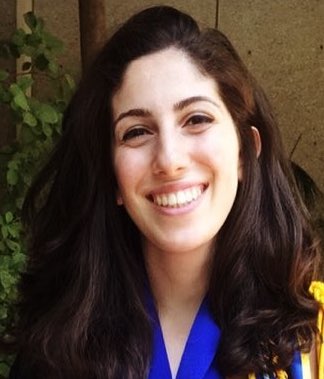 Background of CBS Research/Clinical/Volunteering efforts/achievements:
Background of CBS Research/Clinical/Volunteering efforts/achievements:
Since beginning graduate school, I have developed a deep interest in understanding, developing, and improving mindfulness and acceptance-based interventions for behavioral health populations. In joining a research lab devoted to optimizing ACT for individuals with obesity and eating disorders, I have had the opportunity to receive extensive research and clinical training in these interventions. As my interest in ACT – and CBS more broadly – has grown, I have begun pursuing an independent line of research devoted to identifying and evaluating mechanistic factors that influence ACT treatment outcomes for individuals with obesity. Recently, I completed my CBS-driven Master’s thesis project, in which I dismantled and isolated the values component of ACT for weight control, developed an analog values-based weight loss intervention, and evaluated target engagement of theorized mechanisms inherent in the valuing process. I have also developed of the field’s first measure of values clarity and values awareness, presented my independent CBS-based research at four national conferences, and co-authored two manuscripts and book chapters on innovations in ACT for obesity and physical activity. In tandem with my research, my clinical interests have grown to center around CBS interventions for individuals with weight and eating disorders, anxiety disorders, and mood disorders. In my current practicum placement and study therapist roles, I have been able to deliver ACT in both group and individual treatments. I have also had the opportunity to receive supervision in the application of CBS principles for weight and eating disorders, and to provide didactic training to my peers.
Autobiography:
I am a native Californian who was born and raised in Los Angeles. After receiving my Bachelor of Arts in Psychology from the University of California, Los Angeles, I worked as a research coordinator at the UCLA Anxiety and Depression Research Center. Currently, I am a third year Clinical Psychology doctoral student at Drexel University working under the mentorship of Evan Forman, Ph.D., where my clinical and research interests center around developing and improving treatments for individuals with obesity and eating disorders. In particular, I am interested in the use of mindfulness and acceptance-based treatments to understand and intervene on cognitive and affective mechanisms that maintain unhealthy eating. Upon completion of my doctoral training, I hope to continue integrating ACT into my research and practice as a clinical psychologist for individuals struggling with behavioral health disorders. I believe my continued efforts to grow as an ACT practitioner will aid in my ability to help individuals build lives in line with the values that drive them. In pursuit of a values-driven life of my own, I enjoy reading, performing at open mic nights, watching musical theater, and spending quality time with loved ones (and their dogs).
Future goals:
Upon completion of my doctoral training, I hope to continue integrating ACT into my research and practice as a clinical psychologist for individuals struggling with behavioral health disorders.
Publications:
- Lillis, J., Dallal, D.H., & Forman, E.M. (in press). Innovations in applying ACT for obesity and physical activity. In Levin, M.E., Twohig, M.P., & Krafft, J. (Eds.), Innovations in Acceptance and Commitment Therapy: Clinical advancements and applications in ACT. (Chapter 9). Oakland, CA: New Harbinger Publications.
- Forman, E.M., Manasse, S.M., Butryn, M.L., Crosby, R.D., Dallal, D.H., & Crochiere, R.J. (2019). Long-term follow-up of the Mind Your Health Project: Acceptance-based versus standard behavioral treatment for obesity. Obesity, 27(4), 565-571.
Manuscripts in Preparation:
- Dallal, D.H. & Forman, E.M. (Manuscript in preparation). Can an acceptance-based smartphone application for weight loss promote change in ACT-based mechanistic processes?
- Dallal, D.H. & Forman, E.M. (Manuscript in preparation). Clarifying the role of values in weight control: A pilot study of a values-based intervention to promote weight loss.
- Dallal, D.H. & Forman, E.M. (Manuscript in preparation). The Values Interview: Developing and validating a new measure of values clarity and values awareness.
Conference Presentations:
- Dallal, D.H. & Forman, E.M. (2020, July). The Values Interview: Developing and validating a new measure of values clarity and values awareness. In Assessing CBS constructs with precision and validity. Paper to be presented at the 18th Annual World Conference of the Association for Contextual Behavioral Science.
- Dallal, D.H. & Forman, E.M. (2020, April). Clarifying the role of values in weight control: A pilot study of a values-based intervention to promote weight loss. Poster to be presented at the 41st Annual Meeting & Scientific Sessions of the Society of Behavioral Medicine, San Francisco, CA.
- Dallal, D.H. & Forman, E.M. (2019, Nov.). Can an acceptance-based smartphone application for weight loss promote change in ACT-based mechanistic processes? Poster presented at the Behavioral Medicine and Integrated Primary Care Special Interest Group Exposition at the 53rd Annual Convention of the Association for Behavioral and Cognitive Therapies, Atlanta, GA.
- Dallal, D.H., Manasse, S.M., Lampe, E., & Forman, E.M. (2019, March). Examining the utility of three acceptance-based skills in facilitating weight change in the behavioral treatment of obesity. Poster presented at the 40th Annual Meeting & Scientific Sessions of the Society of Behavioral Medicine, Washington, D.C.
- Forman, E.M., Butryn, M.L., Manasse, S.M., Crosby, R.D., Dallal, D.H., & Crochiere, R.J. (2019, March). RCT of an acceptance-based behavioral treatment for obesity: Weight and quality of life across 3 years. Paper presented at the 40th Annual Meeting & Scientific Sessions of the Society of Behavioral Medicine, Washington, D.C.
- Dallal, D.H., Shaw Tronieri, J., Manasse, S.M., & Forman, E.M. (2018, April). Development of a measure of values clarity in a behavioral weight loss-seeking sample. Poster presented at the 39th Annual Meeting & Scientific Sessions of the Society of Behavioral Medicine, New Orleans, LA.
Student Spotlight Award Recipient - Duckhyun Jo
Student Spotlight Award Recipient - Duckhyun JoCongratulations to Duckhyun Jo on being selected as the Student Spotlight Award winner for February 2024!
The purpose of this award is to highlight students who are doing important work in the CBS community whether for research, clinical, and/or volunteer-humanitarian efforts.
This is a way to highlight their achievements, let the ACBS community know important work students are doing, and possibly provide a platform for mentoring, collaboration, professional development, and conversations around highlighted areas.
Learn more about Duckhyun Jo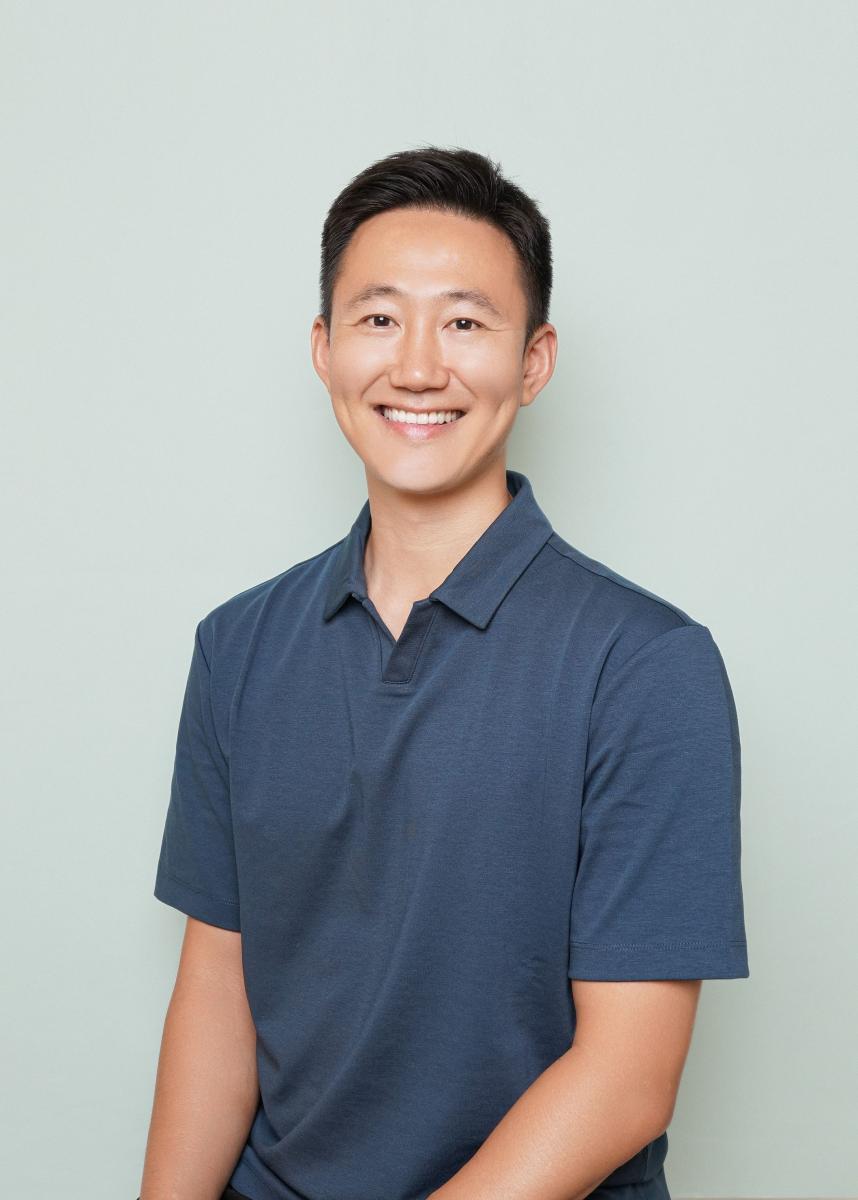
Background of CBS Research/Clinical/Volunteering efforts/achievements:
My scholarly works are firmly rooted in the framework of Contextual Behavioral Science (CBS), a systematic and pragmatic approach to the understanding of human behavior. My research program focuses on three key strategic areas. First, my research has centered on understanding the process of change within the CBS. Over the past few years, I have concentrated on assessing the conceptual and psychometric validity of various measures within the CBS. I have applied both traditional and modern test theory techniques to establish validity evidence for recently developed measures. Furthermore, I have investigated the roles of each process in various contexts, such as eating disorders and mood disorders. Second, I have examined potential risk and protective factors for mental health within diverse populations. Hawai‘i, due to its racial diversity, has provided an ideal environment for my research, and I have recently expanded the understanding of this population within the framework of the CBS. Finally, my interest extends to the application of innovative modalities in intervention sciences. Following the COVID-19 pandemic, novel forms of psychotherapy have gained widespread adoption, and I have conducted research on the effectiveness of metaverse psychotherapy. My ultimate goal is to explore the effects of psychotherapies informed by CBS within newly developed platforms, such as the metaverse or virtual reality.
Autobiography:
I am currently a fourth-year doctoral student pursuing clinical psychology at the University of Hawaii at Manoa. My academic focus centers on understanding the intricate, dynamic, and transdiagnostic aspects of psychological flexibility. To achieve this, I am keen on employing diverse methodologies, including item response theory, network analysis, and mixed-effect modeling. My educational background includes a bachelor's degree in Psychology and a master's degree in Clinical and Counseling Psychology, both earned from Korea University. Additionally, I have accumulated over five years of experience in Sri Lanka, Laos, and Thailand, actively contributing to international development initiatives aligned with the UN Sustainable Development Goals. Outside my academic pursuits, I relish spending quality time with my family, exploring the beautiful landscapes of Hawaii, particularly its picturesque mountains and beaches.
Future goals:
I aspire to pursue a career as a clinical researcher in an academic setting to contribute to the advancement of scientific knowledge in the field of CBS.
Publications:
11. Im, S., Jo, D., & Lee, S. (Accepted). Exploring the Impact of Therapeutic Presence on Working Alliance in Metaverse Counseling. Counseling Psychologist
10. Jo, D., Seong, B., & Yang, E. (2023). Psychometric properties of the Psy-flex scale: A validation study in a community sample in Korea. Journal of Contextual Behavioral Science. 30, 70-79. https://doi.org/10.1016/j.jcbs.2023.09.004
9. Jo, D., Im, S., Suh, D., Spencer, S. D., & Masuda, A. (2023). The Personalized Psychological Flexibility Index (PPFI): An Item Response Theory Analysis with Racially Diverse College Students. Journal of Psychopathology and Behavioral Assessment, 1-15. https://doi.org/10.1007/s10862-023-10076-2
8. Jo, D. & Kim, H. (2023). Network Analysis of Depressive Symptoms in South Korean Adults: Similarities and differences between women and men. Current Psychology, 1-12. https://doi.org/10.1007/s12144-023-04824-6
7. Jo, D., Woo, S., & Yang, E. (2022). Role of Family Acculturation Stress in Career Development Among Adolescents From Multicultural Families in Korea. Journal of Career Development. https://doi.org/10.1177/08948453221131362
6. Spencer, S. D., Jo, D., Hamagami, F., Antonio, M., Qinaʻau. J., Masuda, A., & Hishinuma, E. (2022). A Preliminary Psychometric Validation of Contextual Cognitive Behavioral Therapy-Informed Measures with Racially and Ethnically Diverse Adults. Journal of Contextual Behavioral Science, 25, 61-72. https://doi.org/10.1016/j.jcbs.2022.06.004
5. Nakamura, L., Jo, D., & Masuda, A. (2022). Mental Health Help-Seeking Experience and Attitudes in Asian American, Multiracial American, and White. International Journal for the Advancement of Counselling 44(3), 432-452. https://doi.org/10.1007/s10447-022-09470-4
4. Jo, D., Spencer, S. D., & Masuda, A. (2022). Mindfulness as a Moderator of the Relationship between Engaged Living and Depression in Emerging Adulthood. Mindfulness, 1-9. https://doi.org/10.1007/s12671-022-01831-9
3. Jo, D., Spencer, S. D., & Masuda, A. (2022). Mindfulness attenuates the positive association between disordered eating cognition and disordered eating behavior in a sample of college women. Current Psychology, 1-9. https://doi.org/10.1007/s12144-020-00969-w
2. Jo D., & Yang E. (2019). The role of awareness and cognitive fusion with food craving in the relationship between depression and binge eating. Journal of Contextual Behavioral Science, 13, 126-133. https://doi.org/10.1016/j.jcbs.2019.08.001
1. Son Y. M., Woo S., Jo D., & Yang E. (2018). The role of relationship quality on social media in college-to-work transition of Korean college students: The longitudinal examination of intimacy on social media, social capital, and loneliness. Japanese Psychological Research. https://doi.org/10.1111/jpr.12234
Student Spotlight Award Recipient - Emily Brenny Kroska
Student Spotlight Award Recipient - Emily Brenny KroskaCongratulations to Emily Brenny Kroska on being selected as the Student Spotlight Award winner for July 2017!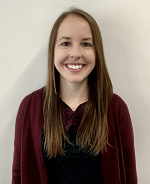
The purpose of this award is to highlight students who are doing important work in the CBS community whether for research, clinical, and/or volunteer-humanitarian efforts.
This is a way to highlight their achievements, let the ACBS community know important work students are doing, and possibly provide a platform for mentoring/collaboration/professional development/conversations around highlighted areas.
Learn more about Emily:
Background of CBS Research/Clinical/Volunteering efforts/achievements:
I began learning ACT during my first year at the University of Iowa from Dr. James Marchman. Since that time, I have focused much of my research on exploring avoidance as a target for intervention, as well as intervention and prevention efforts with ACT. I completed a meta-analysis of the association between avoidance and pain intensity among chronic pain patients, as well as several studies examining avoidance as a mediator of the association between traumatic experiences and adverse outcomes, including obsessive-compulsive symptoms, internalizing symptoms, somatic symptoms, and problematic health behaviors. In addition, I have collaborated with community organizations, including an alternative high school and the Iowa Department of Corrections, to develop and implement interventions within these contexts to integrate ACT into the community. As a volunteering effort, I worked with children involved in Boys and Girls Club in Iowa to deliver brief ACT interventions to both the children and their parents. Furthermore, my dissertation is examining the question of how much is enough in brief Acceptance and Commitment Therapy, comparing three single session time-variant group ACT interventions.
Autobiography:
I am a fifth year doctoral candidate at the University of Iowa, where I work with Dr. Michael O'Hara. In my time at Iowa, I have been fortunate to learn about functional contextualism from Dr. James Marchman, an expert clinician whose depth of ACT knowledge is remarkable. I was introduced to ACT in my first year at Iowa, and I have been able to work clinically with at-risk adolescents, prisoners, migraine patients, and depressed adults. My passion for ACT has grown as I have collaborated with community organizations and providers to integrate ACT into broader systems, including the Iowa Department of Correctional Services. In the future, I hope to broaden the contexts into which I can disseminate ACT and become an ACT trainer. I have found that the fundamental ACT processes apply to those from all walks of life, and the common humanity involved when implementing ACT creates space for clients to grow and evolve into a more flexible self. I firmly believe that if exposed to these skills at an early age, children and adolescents may experience a radical change in trajectory with regard to psychopathology, but more importantly, connection with values--both emotionally and behaviorally. In particular, children and adolescents who are at-risk may be particularly likely to benefit from early intervention. It is my hope that my career can be dedicated to the dissemination and implementation of ACT into contexts where I can directly intervene with at-risk populations, such as schools, medical settings, and prisons.
Future goals:
As a researcher, mentor, and clinician, I hope to disseminate acceptance- and mindfulness-based therapies into broader contexts of at-risk populations, where the principles can have a far-reaching impact upon both the individuals and the context itself.
Relevant publications:
Emily B.Kroska (2016) A meta-analysis of fear-avoidance and pain intensity: The paradox of chronic pain. Scandinavian Journal of Pain, Volume 13, Pages 43-58. http://www.sciencedirect.com/science/article/pii/S1877886016300799
Student Spotlight Award Recipient - Erin Wolff
Student Spotlight Award Recipient - Erin WolffCongratulations to Erin Wolff on being selected as the Student Spotlight Award winner for August 2021!
The purpose of this award is to highlight students who are doing important work in the CBS community whether for research, clinical, and/or volunteer-humanitarian efforts.
This is a way to highlight their achievements, let the ACBS community know important work students are doing, and possibly provide a platform for mentoring, collaboration, professional development, and conversations around highlighted areas.
Learn more about Erin Wolff: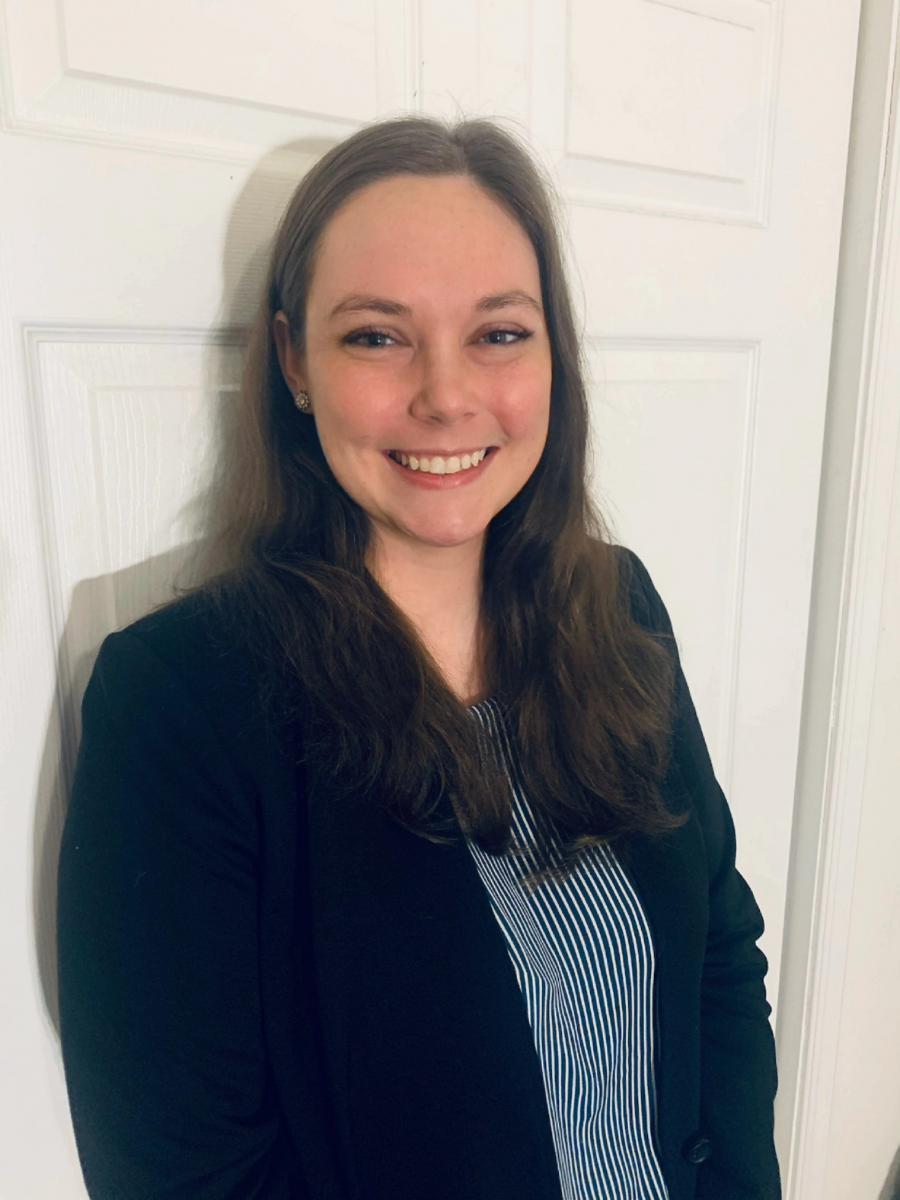
Background of CBS Research/Clinical/Volunteering efforts/achievements:
During my four years of graduate training thus far, I have been fortunate to be able to apply a CBS framework with a variety of clinical populations, including college counseling, addictions, and outpatient mental health counseling as well as non-clinical populations undergoing leadership coaching.
Early in my training, I developed a structured interview based on the Hexaflex model. Although I was only a first-year student, licensed clinicians referred their clients to me to identify stuck points and make treatment recommendations based on this interview. Additionally, I utilized the CFQ and AAQ-II to measure progress for my individual and group therapy clients, and the results of these analyses were presented to the executive board of the organization to exemplify the utility of ACT in a dual-diagnosis setting.
At my current internship placement, I utilize a CBS framework to provide culturally-responsive, inclusive therapy to clients suffering the consequences of severe, complex trauma, chronic health conditions, severe mood disorders, psychotic symptoms, issues pertinent to LGBTQIA+ folx, and minority stress.
Outside of clinical placements, I am wrapping up work on my dissertation, which I presented as a poster at last year’s ACBS World Conference, titled “Utilizing ACT to Treat Suicidality: Addressing the Needs of Both the Client and Clinician.” I also serve as a student representative on the executive board for the Pennsylvania chapter of ACBS.
Prior to COVID-19, I also worked with the research and development committee within the Women in ACBS SIG to identify barriers to leadership within ACBS in hopes of creating a more inclusive community.
Autobiography:
In Fall 2021, I will be beginning my fifth, and final, year of my graduate program where I am pursuing a joint-degree PsyD in Clinical Psychology and MBA in Healthcare Management at Widener University’s Institute for Graduate Clinical Psychology. I am a transplant to the East Coast after growing up in the Chicagoland area and attending UW-Madison for my undergraduate degree. Prior to beginning my graduate training, I was able to explore my interests within the vast opportunities available in the mental health field through a combination of research and clinical opportunities, including psychopathy research in a forensic setting, clinical work with adolescent girls who had been involved in the sex trade, and case management and group work with adults with intellectual and developmental disabilities. While I have loved all of the opportunities I have had in this field, I have particular interest in working with clients struggling with suicidality. This passion has been the driver behind my volunteer work with the American Foundation for Suicide Prevention and Crisis Textline.
I am devoted to increasing access to mental healthcare for all individuals, especially those who have been systemically marginalized. In my current work, I am passionate about providing culturally-responsive, inclusive therapy to folks across a variety of identity dimensions and experiences while maintaining a sex-positive, kink-positive, and poly-aware stance.
Outside of my clinical work, I love to attend concerts and stand-up comedy shows, explore farmer's and art markets, and check out local bookstores and coffee shops.
Future goals:
I hope to work in hospital administration, implementing ACT-based policies on an organizational level, while continuing to clinically utilize ACT with individual and group therapy clients and in the supervision of other clinicians and students.
Relevant publications:
Poster: Utilizing Acceptance and Commitment Therapy to Treat Suicidality: Addressing the Needs of Both the Client and the Clinician Why Do Clinical Psychology Graduate Students Choose ACT? https://contextualscience.org/wc2020online_program_posters
Student Spotlight Award Recipient - Ethan Lester
Student Spotlight Award Recipient - Ethan LesterCongratulations to Ethan Lester on being selected as the Student Spotlight Award winner for March 2019!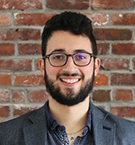
The purpose of this award is to highlight students who are doing important work in the CBS community whether for research, clinical, and/or volunteer-humanitarian efforts.
This is a way to highlight their achievements, let the ACBS community know important work students are doing, and possibly provide a platform for mentoring/collaboration/professional development/conversations around highlighted areas.
Learn more about Ethan:
Background of CBS Research/Clinical/Volunteering efforts/achievements:
I am a functional contextual clinical scientist who primarily aligns with a contextual-behavioral theoretical orientation. I place a high value on the individual’s context, with consideration of the individual’s historic and current cultural factors, interpersonal dynamics, and unique learning histories. My research has broadly focused on the exploration and application of mindfulness and acceptance-based practices using novel experimental and intervention-based designs. I have studied the effects of an 8-week Mindfulness-Based-Stress Reduction intervention for college students with ADHD, the acquisition of mindfulness via a behavior analytic matching-to-sample task, and the effects of mindfulness and acceptance-based practices for older adults’ experiences of ageism. Much of my clinical work operates from an Acceptance and Commitment Therapy (ACT) approach, in which behavioral, relational, and humanistic-existential theories and philosophies emerge from my work. I am currently on my clinical internship at Massachusetts General Hospital/Harvard Medical School where I both research and implement mind-body interventions for medical populations. In particular, I treat patients who are experiencing neurological illnesses and adjustment difficulties due to their medical status. At MGH/HMS, I see older adult outpatients from a philanthropic neurology clinic who are experiencing emotional distress related to recent neurological diagnoses and health anxiety. I also work in the neurocritical intensive care unit with patients and families who have experienced acute neurological injuries (e.g., strokes, tumor resections), and participate on a DBT team and group. I am in love with what I do and I always incorporate contextual behavioral sciences into my science and practice. It just fits.
Autobiography:
My differences matter to me. I grew up a Hispanic Jew as a product of my parents’ interracial-interreligious marriage. My next-door neighbors were Muslim and Hindu, and I celebrated Christmas with my grandmother and her entire Spanish-speaking neighborhood. I was fortunate that my experience of diversity was always welcomed and celebrated. My doctoral education has allowed me to further explore through clinical research the meaning of my own diversity and fellow humans’ experiences. Consciously working with diversity is ever present in my clinical work, teaching, and research. I have counseled members of marginalized groups and have actively and compassionately advocated with and for these groups. My training has brought me closer to a multitude of individuals’ experiences, including those of children and college students with ADHD, sexual minorities, older adults with neurocognitive impairments, inpatients with disabilities and traumas, and outpatients with little financial stability and social support.
With the guidance of my major professor telling me to “pursue research that matters”, my journey has led me to seek out and meaningful research experiences in contextual behavioral sciences. My hope is that my research tells a story – one of commitment to the alleviation of human suffering through empirically-supported CBS treatment techniques. I am an enthusiastic clinical scientist with a drive to pursue research that matters. In all, I am a person who feels deeply about others - I am in love with the art and science of psychology and plan to do the work that matters for years to come.
Future goals:
I plan to continue working at MGH/HMS as a postdoctoral fellow in psychology in the Integrated Brain Health Clinical and Research Program honing skills in intervention development and clinical research design and implementation for the forseeable future.
Relevant publications:
Lester, E.G., … Vranceanu, A-M. (under review). The Resilient Youth with Neurofibromatosis (RY-NF) Mind-Body Intervention: An Adolescent RCT. Neurology
Murrell, A.R., Hulsey, T.C., Ergüder, L., Lester, E.G. (under review). Supporting Parents, Teachers, School Psychologists and School Counselors Using ACT, Compassion, and Mindfulness.
Lester, E.G. & Murrell, A.R. (in review). Becoming Mindful of Measurement: An experimental-experiential study of state mindfulness measures. Mindfulness. Manuscript submitted for review.
Lester, E.G., Murrell, A.R., & Dickson, D. (2018). A Mixed Methods Approach to Understanding Misconceptions of Mindfulness Meditation. OBM Integrative and Complementary Medicine. Accepted for publication
Al-Jabari, R., Murrell, A.M., Callahan, J.L., Cox, R.J., & Lester, E.G. (In press), Do Distress Level and Waitlists Impact Termination in a Training Clinic. Teaching and Education in Professional Psychology.
Lester, E. G., & Murrell, A. R. (2018). Mindfulness Interventions for College Students with ADHD: A Multiple Single Case Research Design. Journal of College Student Psychotherapy, 1-22.
Moyer, D. N., McMakin, D. Q., Page, A. R., Murrell, A. R., Lester, E. G., & Walker, H. A. (2018). The Impact of Acceptance and Commitment Therapy on Positive Parenting Strategies Among Parents who have Experienced Relationship Violence. Journal of Family Violence, 33, 4.
Murrell, A. R., Lester, E. G., Moyer, D. N., & Lincoln, T. (2018). Three tweets to the wind: Providing context via simulated social media to decrease stigma toward problematic drinking. The Behavior Therapist, 41, 4
Murrell, A. R., Jackson, R., Lester, E.G., Hulsey, T.C. (2016). Psychological Flexibility and Resilience in Parentally Bereaved College Students. OMEGA Journal of Death and Dying, 76, 3. doi: 10.1177/0030222817693154
Murrell, A. R., Lester, E.G., & Sandoz, E.K. (2015). Grounding Turbulent Minds: The Challenges of Mindfulness-Based Interventions for College Students with ADHD and How to Overcome Them. The Journal of College Student Psychotherapy.
Student Spotlight Award Recipient - Farah Gulamoydeen
Student Spotlight Award Recipient - Farah Gulamoydeen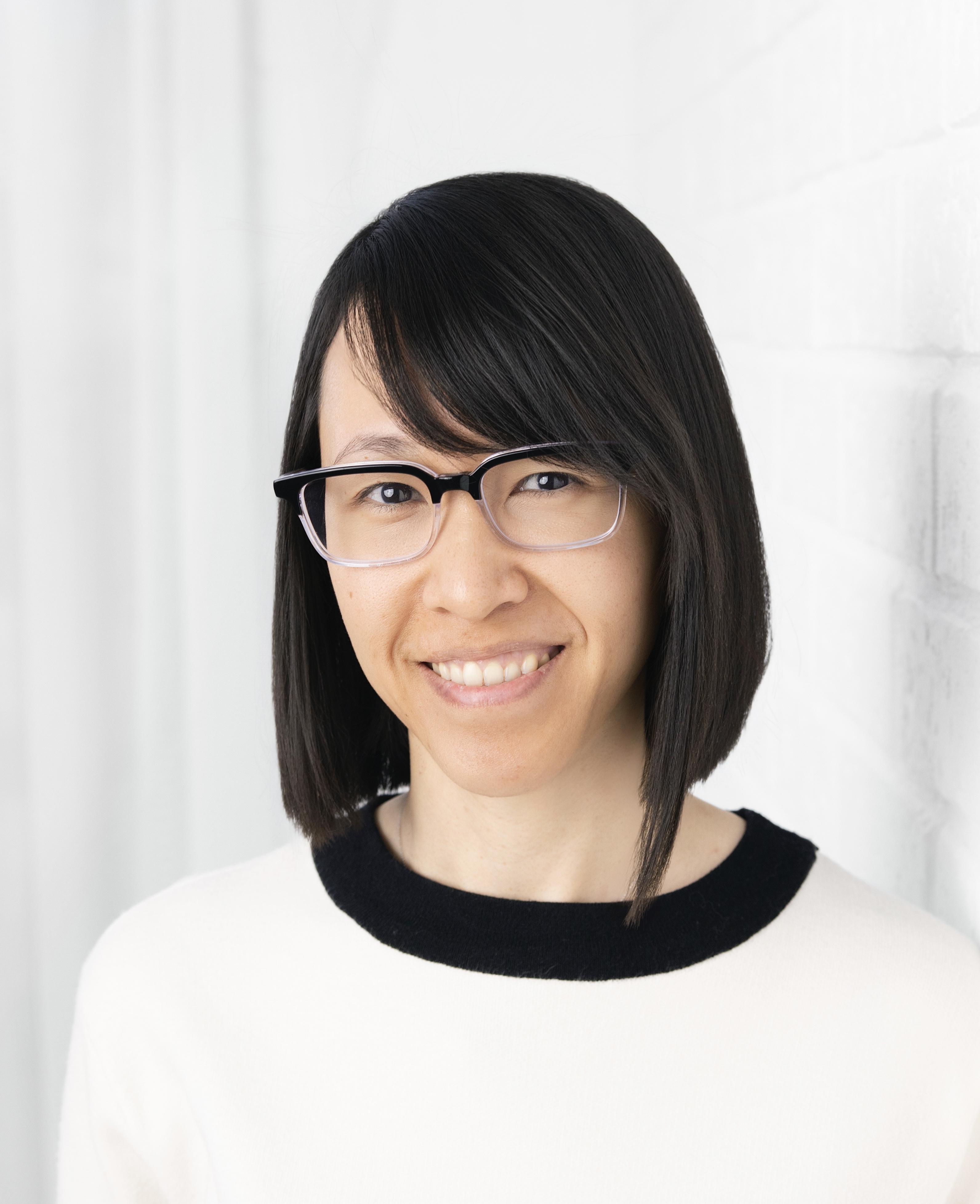
Congratulations to Farah Gulamoydeen on being selected as the Student Spotlight Award winner for February 2026!
The purpose of this award is to highlight students who are doing important work in the CBS community whether for research, clinical, and/or volunteer-humanitarian efforts.
This is a way to highlight their achievements, let the ACBS community know important work students are doing, and possibly provide a platform for mentoring/collaboration/professional development/conversations around highlighted areas.
Learn more about Farah:
Background of CBS Research/Clinical/Volunteering efforts/achievements:
My work in CBS spans research, clinical training, leadership, and community development across Malaysia and Australia. I began offering ACT training in Malaysia in 2017, a time when CBS approaches were still emerging in the region. I designed and delivered a progression of workshops—from two-hour introductory seminars to multi-day intensive and advanced trainings—that have reached over 400 Malaysian clinicians across hospitals, universities, NGOs, and private practice settings. Many practitioners received their first ACT exposure through these initiatives, strengthening national capacity for CBS-informed care. I have also presented ACT-focused talks to underserved and diverse groups including refugee health workers, aged-care organisations, and university communities, increasing cultural and linguistic accessibility to CBS principles.
As a clinician, I apply CBS processes in ongoing therapeutic work with individuals through private practice, and I have received supervision from senior CBS clinicians, shaping my fidelity to ACT’s behavioural roots. I have supported the CBS community through leadership roles—first as Treasurer and then temporarily as President-Elect of the ANZ ACBS Chapter—and more recently through the founding of the Ethics in Action Collective (EAC), a values-driven volunteer-run initiative that promotes ethical maturity, professional responsibility, and CBS-aligned leadership development in Malaysia.
My PhD research advances process-based and personalised care using the principles of measurement-based care. I have completed a systematic review of personalisation methods and measures (under review at JCBS) and am progressing a clinician-led EMA feasibility study that examines how real-time assessment can guide personalised case formulation and intervention. These projects contribute to emerging CBS research in idionomics and process-based treatment.
Autobiography:
I am a Malaysian-born Australian currently residing in Western Australia/Whadjuk boodjar. I began my ACT journey in 2015 while searching for my life purpose. Practicing ACT inside and outside the therapy room transformed me as a human being. Guided by my values of contribution and courage, I committed myself to bringing ACT to Malaysia. I invested extensively in learning—attending workshops, conferences, and receiving supervision from senior clinicians—so that I could share CBS with a community that had very limited exposure to it. Using my own resources, I offered ACT talks and workshops, beginning with small two-hour sessions in modest spaces. These grew into full-day and multi-day trainings that reached clinicians across hospitals, universities, NGOs, and private practice. Over time, I trained more than 400 Malaysian mental health professionals, many of whom went on to integrate ACT into their services. I later founded ACT Kuala Lumpur, which allowed me to broaden CBS education in the region.
My academic work builds on this trajectory. In my PhD, I study personalised interventions using process-based approaches and real-time assessment, integrating measurement, theory, and clinical utility. My goal is to bridge research and practice.
In 2025, guided by my values of courage and contribution, I founded the Ethics in Action Collective. This ethics initiative is how I transform adversity into values-based action by strengthening ethical maturity, leadership integrity, and governance within Malaysian psychology.
Across all my roles now, I remain committed to reducing suffering, expanding access to CBS, and elevating ethical standards.
Future goals:
To advance personalised, process-based care across research and clinical practice, expand ACT and process-based training internationally, and contribute to ethical development within and beyond ACBS.
Links to relevant publications:
Manuscript under review: Gulamoydeen, F., Ciarrochi, J., Li, W., Sahdra, B. K., Hernandez Contreras, C. E., Hayes, S. C., & Ong, C. W. (Under review). Personalised, But How? A systematic review of methods and measures in personalised interventions. Manuscript submitted to the Journal of Contextual Behavioral Science.
Student Spotlight Award Recipient - Georgia Polyviou
Student Spotlight Award Recipient - Georgia PolyviouThe purpose of this award is to highlight students who are doing important work in the CBS community whether for research, clinical, and/or volunteer-humanitarian efforts.
This is a way to highlight their achievements, let the ACBS community know important work students are doing, and possibly provide a platform for mentoring, collaboration, professional development, and conversations around highlighted areas.
Congratulations to Georgia Polyviou on being selected as the Student Spotlight Award winner for October 2022!
Learn more about Georgia Polyviou: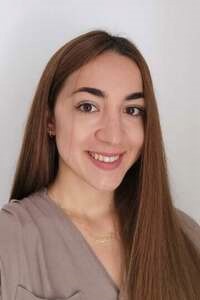
Background of CBS Research/Clinical/Volunteering efforts/achievements:
I first heard about ACT during my third year as an undergraduate psychology student at University of Cyprus. Since then, I realized that this approach aligns with my career goals, personal values and beliefs. To expand my knowledge and experience in ACT and CBS, I decided to join ‘ACTHealthy’ research laboratory where I had my first research experience under the supervision of Dr. Maria Karekla. In my bachelor thesis we examined values clarification, psychological flexibility, body image acceptance and action and self-compassion as possible risk factors for developing an eating disorder. Now, as a first-year master’s student at the university of Cyprus I have had the opportunity to be a research assistant in multiple projects that examine psychological flexibility and body image perception distortions among women at high-risk for developing an eating disorder. Also, as my research interests focus on eating disorders, currently I am implementing a multi-user virtual reality values augmented exposure early-intervention for women at high-risk for developing an eating disorder in order to test its effectiveness. The combination of ACT with innovative technologies not only do highlight new possible ways to understand and treat mental illnesses but also gives us the opportunity to design more efficient prevention and intervention programs.
Autobiography:
I was born and grew up in Cyprus. I received my bachelor’s degree in psychology from the University of Cyprus where I am currently a first-year master’s student in applied school psychology. I am a research assistant in ‘ACT Healthy’ lab under the supervision of Dr. Maria Karekla and my research interests focus on eating disorders’ prevention and intervention. ACT and RFT have always attracted my interest as I believe that they approach and explain human behavior in a humanistic, anthropocentric way that aligns with my perspective and point of view. Additionally, I consider myself lucky as mindfulness, psychological flexibility and values-based living are constructs that crossed my path early in life and they have changed the way I look towards myself, other people and my personal experiences. As a result, ‘‘I feel the responsibility’’ to share these ideas with people who suffer, who are marginalized, who believe that life is not worth living. This is one of the main reasons that I have chosen to work with children, I strongly believe that prevention, intervention programs, mindfulness, meditation and values clarification at early age can have long term effects and serve as protective factors especially in the hard times that we are living.
Even though questions like what fulfills you or which are your personal values are hard to answer, I am grateful cause I can name few things that make me feel connected with myself like solo travelling, hiking, photography and spending time with my family and friends.
Future goals:
My goal is to continue my personal development and expand my knowledge and skills in order to apply ACT-based practices that will help people achieve a value-driven meaningful life.
Student Spotlight Award Recipient - Giorgio Alagna
Student Spotlight Award Recipient - Giorgio Alagna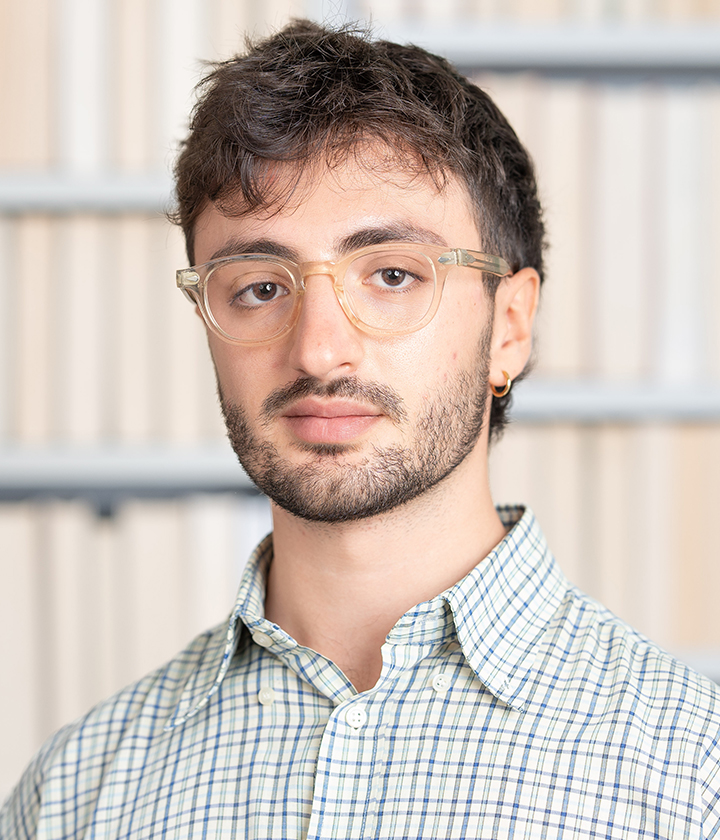
Congratulations to Giorgio Alagna on being selected as the Student Spotlight Award winner for March 2026!
The purpose of this award is to highlight students who are doing important work in the CBS community whether for research, clinical, and/or volunteer-humanitarian efforts.
This is a way to highlight their achievements, let the ACBS community know important work students are doing, and possibly provide a platform for mentoring/collaboration/professional development/conversations around highlighted areas.
Learn more about Giorgio:
Background of CBS Research/Clinical/Volunteering efforts/achievements:
My engagement with CBS began during clinical training at University Hospital Cologne's child and adolescent psychiatry unit, where I discovered ACT's transdiagnostic potential for young people facing existential challenges. This experience catalyzed my doctoral research developing a standardized, group-based ACT aftercare intervention for adolescent cancer survivors, addressing a critical gap where only 5.9% of German survivors receive psychotherapeutic aftercare.
I completed comprehensive ACT training through INeKO (University of Cologne) and the German Association for Behavioral Therapy (DGVT), specializing in child and adolescent applications. Currently, I coordinate an ACT-based parent group at the University of Cologne's Child and Adolescent Outpatient Clinic while conducting my PhD research as a Research Associate in the Department of Psychology and Psychotherapy in Special Education and Rehabilitation. My dissertation employs a three-paper cumulative design examining ACT in pediatric psycho-oncology through systematic review, in-clinic intervention development, and online delivery for rural populations.
My theoretical interests center on functional contextualism's application to meaning-making processes. Both my bachelor's and master's theses explored Buddhist non-self concepts through empirical psychology, investigating parallels with ACT's "self-as-context" process. I'm eager to deepen my understanding of RFT to inform more theoretically grounded intervention research.
Autobiography:
I was born in Palermo, Sicily, where my family fostered critical thinking and intellectual freedom from an early age. This foundation shaped my academic path through classical studies (Greek, Latin, and German language and literature), where I graduated with honors.
Recognizing limited career opportunities in Sicily, I moved to Cologne to study psychology. My bachelor's thesis explored Buddhist concepts of non-self, foreshadowing my later interest in functional contextualism. During my master's in Clinical Psychology and Psychotherapy, I completed practical training at University Hospital Cologne's child and adolescent psychiatry unit, discovering my passion for working with young people facing difficult life transitions.
The professional uncertainty surrounding Germany's new psychotherapy training pathway initially caused significant anxiety about my future. Alongside my third semester, I enrolled in ACT training to ensure I could continue working after my licensing exam. This decision proved transformative, deepening my commitment to contextual behavioral science.
Currently, I coordinate an ACT-based parent group at the University of Cologne's Child and Adolescent Outpatient Clinic while conducting autism diagnostics. My clinical interests center on pediatric psycho-oncology, RFT and meaning-making during challenging developmental periods.
Beyond clinical work, I've maintained strong advocacy involvement. As student council president, I championed therapeutic diversity in clinical training. More recently, I established a free counseling service for Italian-speaking individuals in Germany, a community with limited access to psychological support in their native language. This initiative, featured on local news, reflects my commitment to accessible, culturally responsive care aligned with ACT's values of psychological flexibility and compassionate action.
Future goals:
I would love to deepen my knowledge in RFT and functional contextualism, so that this knowledge may transmigrate into more grounded intervention research.
Student Spotlight Award Recipient - Huanzhen Xu
Student Spotlight Award Recipient - Huanzhen XuCongratulations to Huanzhen Xu on being selected as the Student Spotlight Award winner for January 2021!
The purpose of this award is to highlight students who are doing important work in the CBS community whether for research, clinical, and/or volunteer-humanitarian efforts.
This is a way to highlight their achievements, let the ACBS community know important work students are doing, and possibly provide a platform for mentoring, collaboration, professional development, and conversations around highlighted areas.
Learn more about Huanzhen Xu:
Background of CBS Research/Clinical/Volunteering efforts/achievements: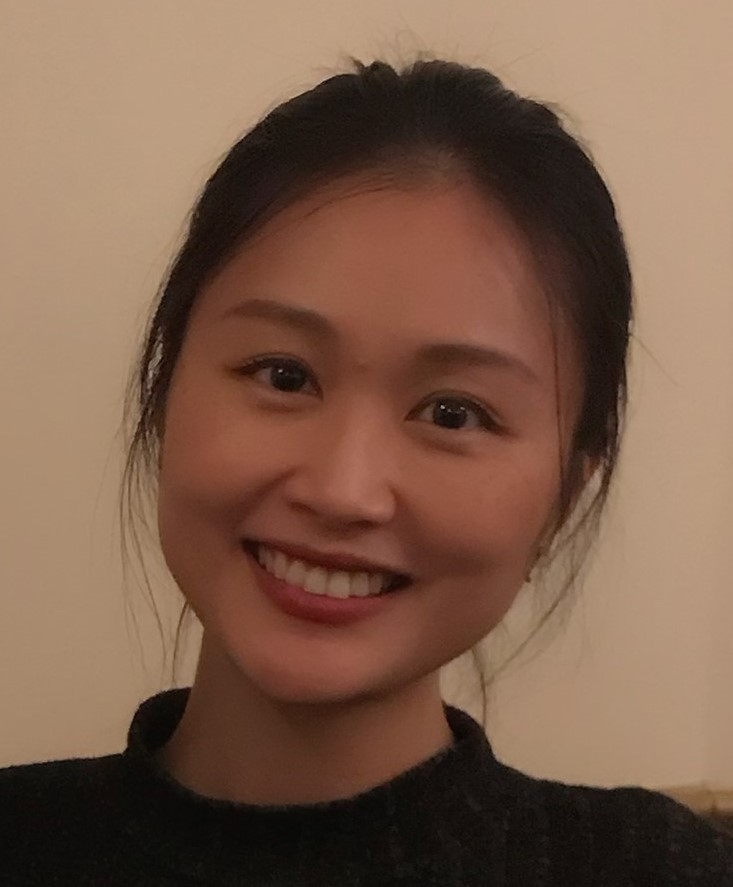
I became interested in contextual behavioral approaches early in graduate school, and this interest has grown into a passion through my journey in research and clinical practice. As a researcher and clinician with a uniquemulticultural background, I committed significant efforts towards the identification and reduction of acculturative stress experienced by my fellow international students - an enormous student body that has been long neglected. I designed a treatment-outcome study with Chinese international students using ACT because of the similarities between ACT components and Buddhism. The results showed that ACT significantly reduced these students' psychological distress and physical symptoms. Moreover, I found that participants’ familiarity with Buddhism made it easier for them to understand value-driven living and “Acceptance”. I also found that the self-disclosure aspect of ACT was especially effective with Chinese participants due to their “acquaintance culture”. My findings were published in the Journal of Contextual Behavioral Science. Additionally, I was involved in multiple research projects relevant to contextual behavioral therapies, including a R21 grant that investigated the efficacy and effectiveness of ACT in treating work-related distress among nursing aides and a pilot study in which we developed a DBT protocol for college students who experience difficulty in physical exercise.
My passion in contextual behavioral science extends to my clinical practice. I assess the form, function, and reinforcing factors of presenting problems. Based on client fit, I strive to draw ingredients from various third-wave therapies and deliver them in an integrative fashion.
Autobiography:
My hometown is Leshan, Sichuan, one of the most famous Buddhistic cities in China. Growing up by The Leshan Giant Buddha, numerous Buddhistic temples and buddha stone figures, I naturally became familiar with Buddhistic values and practices without traces of learning. Though living nearby popular attractions for Chinese tourists, I had almost never seen a person who did not look like myself. A brief summer trip to America in 2009 revealed my talent for and passion in connecting with diverse people. In 2013, I left China for Minnesota, where I completed my bachelor’s degree. I knew I wanted to be a clinical psychologist because, not only would I finally experience diversity daily, but I would also provide concrete help to people of differing backgrounds. If speaking English enabled me to communicate with diverse individuals, training in psychology allowed me to truly connect with them.
Upon graduation, I was accepted into the BGSU clinical psychology PhD program, where I began to combine my passion for diversity with psychological services and research. Through this journey, I discovered my strength in acceptance- and values-based approaches, as they align well with my culturally rooted knowledge and experience in Buddhism. Additionally, I observed that minority populations often happen to be the most underserved in America. As a Chinese international student myself, I found an urgent importance to provide a voice to minority groups. Therefore, I decided to put my strength into good use and devote my research efforts to studies relevant to ACT and acculturation.
Future goals:
I aim to continue growing my capacity in CBS research and practice, and I wish to become a generalist practitioner with multicultural competency and a specialization in CBS.
Relevant publications:
Xu, H., O’Brien, W. H., & Chen, Y. (2020). Chinese international student stress and coping: A pilot study of Acceptance and Commitment Therapy. Journal of Contextual Behavioral Science, 15, 135–141. https://doi.org/10.1016/j.jcbs.2019.12.010
O’Brien, W. H., Wang, S., Xu, H., Wang, S., Yang, Z., Yang, T., Liu, Q., Zhang, X., Tang, L., Varga, A. V., Sims, T., Lim, C. X., Jarukasemthawee, S., & Pisitsungkagarn, K. (2021) Psychological reactions to COVID-19: Survey data assessing perceived susceptibility, distress, mindfulness, and preventive health behaviors. Data In Brief, 34. https://doi.org/10.1016/j.dib.2020.106687
O’Brien, W. H., Wang, S., Varga, A. V., Xu, H., Sims, T. E., Horan, K. A., & Lim, C. X. (2020). Predicting PPE use, post-traumatic stress, and physical symptoms during the early weeks of COVID-19 lockdowns in the USA. MedRxiv. https://doi.org/10.1101/2020.07.27.20162057
Chen, Y., Peng, Y., Xu, H., & O’Brien, W. H. (2017). Age Differences in Stress and Coping: Problem-Focused Strategies Mediate the Relationship Between Age and Positive Affect. International Journal Of Aging & Human Development, 86(4), 347–363. https://doi.org/10.1177/0091415017720890
Student Spotlight Award Recipient - Huiyuan LI
Student Spotlight Award Recipient - Huiyuan LICongratulations to Huiyuan LI on being selected as the Student Spotlight Award winner for July 2022!
The purpose of this award is to highlight students who are doing important work in the CBS community whether for research, clinical, and/or volunteer-humanitarian efforts.
This is a way to highlight their achievements, let the ACBS community know important work students are doing, and possibly provide a platform for mentoring, collaboration, professional development, and conversations around highlighted areas.
Learn more about Huiyuan LI:
Background of CBS Research/Clinical/Volunteering efforts/achievements: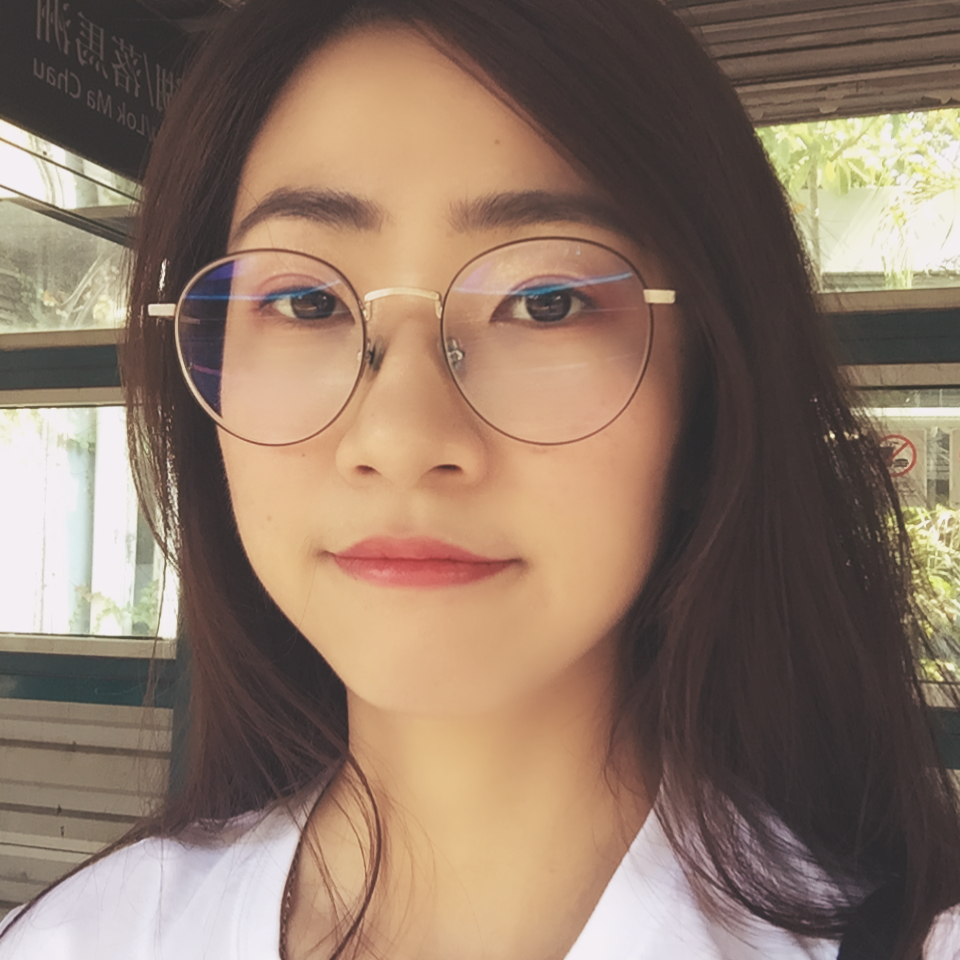
My PhD project is about developing and examining an ACT-based intervention program based on Chinese cultural context and conduct it among patients with advanced lung cancer to test its effectiveness in improving fatigue interference and health-related quality of life among the population.
My phase I study was a systematic review to examine the effects of ACT on health outcomes in patients with advanced cancer (Li, H., Wong, C. L., Jin, X., Chen, J., Chong, Y. Y., & Bai, Y. (2021). Effects of Acceptance and Commitment Therapy on health-related outcomes for patients with advanced cancer: A systematic review. International Journal of Nursing Studies, 103876. (2020 IF = 5.837. Q1. Ranking 1/124 in Nursing)). Phase II study was a qualitative study to explore their fatigue experience and how they perceive fatigue experience under of framework of ACT model. Phase III study was a full-scale RCT to examined the fatigue-oriented ACT-based intervention in patients with advanced lung cancer (The paper of the pilot study is under review for Asia-pacific Journal of Oncology Nursing).
I enriched my ACT experience by attending workshops and world conferences. Seven presentations related to ACT research have been oral/poster presented on difference conferences. I also received the group supervision organized by ACBS China Chapter. Two world conference scholarships (The 18th Association of Contextualized Behavior Science World Conference Student Scholarship, The 19th Association of Contextualized Behavior Science 2021 Developing Nations Scholar Award, link for the report: https://contextualscience.org/china_dissemination_activities_2021 ) and one research award (Y. K. Pao Foundation Scholarship 2021-22) were obtained.
Autobiography:
I am Huiyuan LI, Melody, and I come from China. I was born in a beautiful city in northern China, Jinzhong, Shanxi Province. Growing up in a loving and warm family, my family gave me great support in my studies and life. Currently I am a year three PhD candidate in nursing, an ACT learner and practitioner. I got the Bachelor of Medicine in 2016 and Master of Nusing Science in 2019 in Central South University.
Currently, I am working with Dr. Wong Cho Lee (Jojo) on ACT interventions among cancer patients in China. My research interests are mental health among cancer patients and psychological interventions to improve their quality of life among cancer patients, especially in advanced stage. Those interest push me to learn more about ACT based on the preliminary findings on the effectiveness of ACT on patients with advanced cancer. I believe my continued efforts to grow as a true ACT interventionist will have significant value for those patients with advanced lung cancer patients in China.
Besides my school-related responsibilities, I like singing, doing physical exercise, such as running, and playing pingpang, going hiking, travelling, and trying different delicious food and hope to learn to swim and dive later on.
I am a lively and cheerful person who like to listen to other people's stories, which also gives me the ability to empathize with others, as I hope to help more people as much as I can.
Future goals:
I hope to extend the ACT to more patients with advanced cancer in China and truly improve the terminal quality of nursing care and quality of life of the population.
Relevant publications:
1. Systematic review paper: https://doi.org/10.1016/j.ijnurstu.2021.103876
2. Systematic review paper 2: https://doi.org/10.1111/jan.14798
Student Spotlight Award Recipient - James Fowler
Student Spotlight Award Recipient - James FowlerCongratulations to James Fowler on being selected as the Student Spotlight Award winner for January 2023!
The purpose of this award is to highlight students who are doing important work in the CBS community whether for research, clinical, and/or volunteer-humanitarian efforts.
This is a way to highlight their achievements, let the ACBS community know important work students are doing, and possibly provide a platform for mentoring, collaboration, professional development, and conversations around highlighted areas.
Learn more about James Fowler: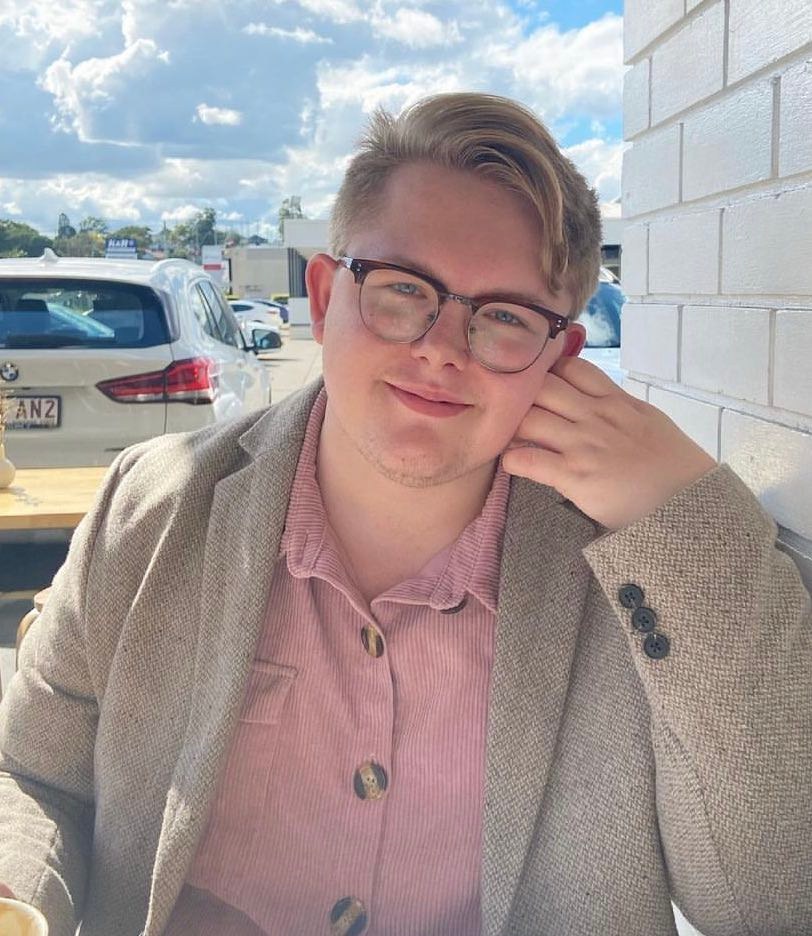
Background of CBS Research/Clinical/Volunteering efforts/achievements:
As a researcher, I have been involved in the evaluation of YOLO, a web-based, ACT program for university students, outcomes of which are published in the Journal of Contextual Behavioural Science (JCBS) (See Viskovish et al below). My PhD builds on this work implementing and evaluating the use of YOLO with LGBTQIA+ community members. This will be the first randomised control trial and use of a web-based ACT program with this community. As part of this work, I have published a systematic review evaluating how ACT has been used with LGBTQIA+ clients in JCBS and presented as a poster on this paper at the ACBS world-conference in 2022. I will also be leading two LGBTQIA+ focused workshops at the ANZ ACBS chapter conference this November.
I previously volunteered with the ANZ ACBS as the Communications Officer. This role had me coordinate social media calendars and partway address the gap between research and clinical practice by sharing research and facilitate initiatives such as the ANZ ACBS Book Club. My proudest achievement was the creation of the Author Spotlight Series, which provided a platform for members of ANZ ACBS to share their work throughout the ANZ ACBS network.
As a Lead Tutor within the School of Psychology at The University of Queensland I have been responsible for the teaching of ACT theory and application to students for three years. This involves facilitating lectures on ACT principles, and teaching hundreds of undergraduate students about the impact of ‘dropping the struggle’.
Autobiography:
I am a Doctor of Philosophy (PhD) Candidate within The University of Queensland (UQ) School of Public Health (SPH). My work involves the use of mixed-methodologies and community-based participatory research to address the needs of vulnerable communities – with a specialist focus on LGBTQI+ issues. My PhD focuses on the co-design and implementation considerations of a web-based Acceptance and Commitment Therapy program for the LGBTQI+ community. I also project manage two Australian government funded, multi-site projects exploring gender-affirming hormone therapy and syphilis in pregnancy. I am also co-investigator on projects exploring the needs of the aromantic community, gratitude in university students, and the continual evaluation of a web-based ACT program for university students. I am committed to teaching and mentorship, and currently supervise medical students and psychology masters students completing research placements at UQ. I also hold positions of Lead Academic Tutor and Sessional Lecturer within UQ School of Psychology. In these roles, I have been responsible for integration of LGBTQI+ specific curricula into the teaching programs in two undergraduate courses within UQ School of Psychology (Positive Psychology and Psychotherapies & Counselling). In 2021 I launched the UQ Positive Psychology Lab Group to continue education and research into positive psychology at UQ. I also currently serve on the advisory board for Lady Gaga’s Born This Way Foundation. I have 6 peer-reviewed publications (3 as first author; h index 2, 23 citations, Google Scholar 2022), and 18 national and international conference presentations and invited talks.
Future goals:
To create a world where access to healthcare is equitable and everyone has a chance to heal, grow, and thrive.
Relevant publications:
Fowler, J.A., Viskovich, S., Buckley, L., & Dean, J.A. (2022). A call for ACTion: A systematic review of empirical evidence for the use of Acceptance and Commitment Therapy (ACT) with LGBTQI+ individuals. Journal of Contextual Behavioral Science
https://www.sciencedirect.com/science/article/pii/S221214472200059X?via%3Dihub
Viskovich, Shelley, Pakenham, Kenneth and Fowler, James A. (2021). A mixed-methods evaluation of experiential intervention exercises for values and committed action from an Acceptance and Commitment (ACT) Therapy mental health promotion program for university students. Journal of Contextual Behavioral Science, 22, 108-118. doi: 10.1016/j.jcbs.2021.10.001 https://www.sciencedirect.com/science/article/pii/S2212144721000983
Student Spotlight Award Recipient - Jenna Lauren Adamowicz
Student Spotlight Award Recipient - Jenna Lauren AdamowiczCongratulations to Jenna Lauren Adamowicz on being selected as the Student Spotlight Award winner for March 2023!
The purpose of this award is to highlight students who are doing important work in the CBS community whether for research, clinical, and/or volunteer-humanitarian efforts.
This is a way to highlight their achievements, let the ACBS community know important work students are doing, and possibly provide a platform for mentoring, collaboration, professional development, and conversations around highlighted areas.
Learn more about Jenna Lauren Adamowicz: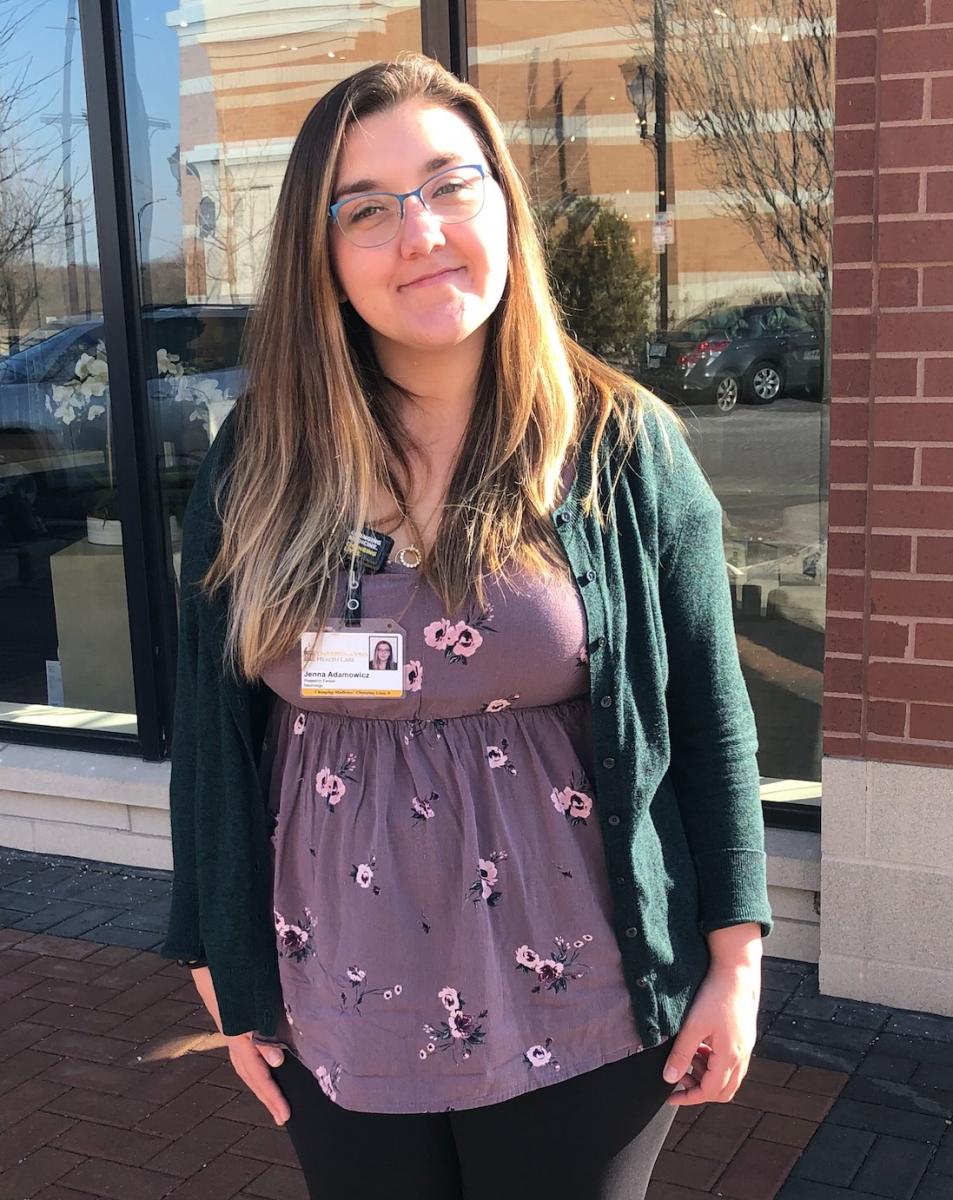
Background of CBS Research/Clinical/Volunteering efforts/achievements:
I have been involved in the CBS community since 2019, when I began working with my academic advisor Emily Kroska Thomas. Regarding research, I have authored several CBS-related articles, including an investigation into psychological flexibility in the context of COVID-19, a meta-analysis examining the association between fatigue severity and avoidance in chronic disease populations, a network analysis exploring connections between ACT processes and internalizing symptoms, and a factor analysis of two psychological flexibility measures in a sample of older adults. Further, I have presented research via poster and oral presentation at the ACBS World Conferences in 2020, 2021, and 2022. Clinically, I use ACT in my work with psychotherapy clients and in two clinical research studies as a study interventionist: a) a telephone-based intervention examining the efficacy of ACT for perinatal anxiety (PI: E. Thomas); and b) a contextual behavioral virtual group intervention for rural women Veterans with chronic pain (PI: K. Hadlandsmyth). I also put together a three-hour clinical workshop to teach ACT skills to practitioners caring for patients with chronic fatigue syndrome. This workshop was accepted to the International Association of Chronic Fatigue Syndrome/Myalgic Encephalomyelitis scientific conference; however, the conference was cancelled due to the COVID-19 pandemic. Concerning volunteering, in 2019 I co-lead a conference presentation on acceptance and intentionality to patients with a rare kidney disease (C3g/DDD) and their family members. Finally, in the Spring 2023 I will be leading a “Lunch and Learn” hour about ACT for the National Alliance of Mental Illness Northeast Iowa Chapter.
Autobiography:
I am a fifth-year student in the clinical science program at the University of Iowa. I am a first-generation college student, and I received my B.A. in Psychology at St. Joseph’s College and my M.A. in Psychology at Stony Brook University. Prior to graduate school, I worked at Stony Brook Medicine under the mentorship of Fred Friedberg. I was introduced to ACT and contextual behavioral science as a second-year doctoral student by my current academic advisor, Emily Kroska Thomas. It was then I developed an interest in investigating the efficacy of ACT and CBS-based interventions for fatigue severity in populations such as chronic fatigue syndrome, fibromyalgia, and other chronic diseases where elevated fatigue severity is prevalent (e.g., multiple sclerosis, cancer, etc.). I have had the opportunity to present my CBS research at the 2020, 2021, and 2022 Association of Contextual Behavioral Science World Conferences. I have also published my CBS research in peer-reviewed journals such as Journal of Contextual Behavioral Science, Journal of Psychosomatic Research, Clinical Gerontologist, and Journal of Affective Disorders. It is my hope that during my clinical internship next year (2023-2024), I will be able to continue my CBS research and clinical efforts, with the long-term goal of working in a professional setting where I can integrate CBS research, clinical practice, and interdisciplinary training and supervision. When I am not working, I enjoy sending time with my fiancé Luke, cooking vegetarian meals, and playing board games. I am also the proud aunt to two nieces and a nephew.
Future goals:
I hope to pursue a career that integrates ACT and CBS research, clinical practice, and interdisciplinary training and supervision.
Relevant publications:
Below is a list of relevant CBS publications (+ denotes co first-authorship)
Roche, A. I., Adamowicz, J. L., Stegall, M., Toovey, C., Sirotiak, Z., & Thomas, E. B. K. College student resilience during COVID-19: Examining the roles of mindfulness, compassion, and prosocial behavior. (in press). Adversity and Resilience Science. https://doi.org/10.1007/s42844-022-00083-9
+Eadeh, H., +Adamowicz, J. L., Markon, K., & Thomas, E. B. K. Using network analysis to explore connections between Acceptance and Commitment Therapy (ACT) therapeutic processes and internalizing symptom and well-being domains in a sample of undergraduates. (in press). Journal of Affective Disorders. 320:1; 701-709. https://doi.org/10.1016/j.jad.2022.10.004
Adamowicz, J. L., Thomas, E. B. K., Hsu, T., Denburg, N. L., Roche, A. I. A preliminary investigation into the factor structure of two psychological flexibility measures in a sample of community-dwelling older adults. (in press). Clinical Gerontologist. http://doi.org/10.1080/07317115.2022.2131496
Adamowicz, J. L., Vélez-Bermúdez, M., & Thomas, E. B. K. Fatigue severity and avoidance among individuals with chronic disease: A meta-analysis. (2022). Journal of Psychosomatic Research, 159, 110951. https://doi.org/10.1016/j.jpsychores.2022.110951
Kroska E. B., Roche, A. I., Adamowicz, J. L., Stegall, M. Psychological flexibility in the context of COVID-19 adversity: Associations with distress. (2020). Journal of Contextual Behavioral Science. 18, 28-33. https://doi.org/10.1016/j.jcbs.2020.07.011
Media coverage: Forbes, Science Daily, Iowa Now, cited in New York Times
Student Spotlight Award Recipient - Jennifer Truitt
Student Spotlight Award Recipient - Jennifer TruittCongratulations to Jennifer Truitt on being selected as the Student Spotlight Award winner for May 2025!
The purpose of this award is to highlight students who are doing important work in the CBS community whether for research, clinical, and/or volunteer-humanitarian efforts.
This is a way to highlight their achievements, let the ACBS community know important work students are doing, and possibly provide a platform for mentoring, collaboration, professional development, and conversations around highlighted areas.
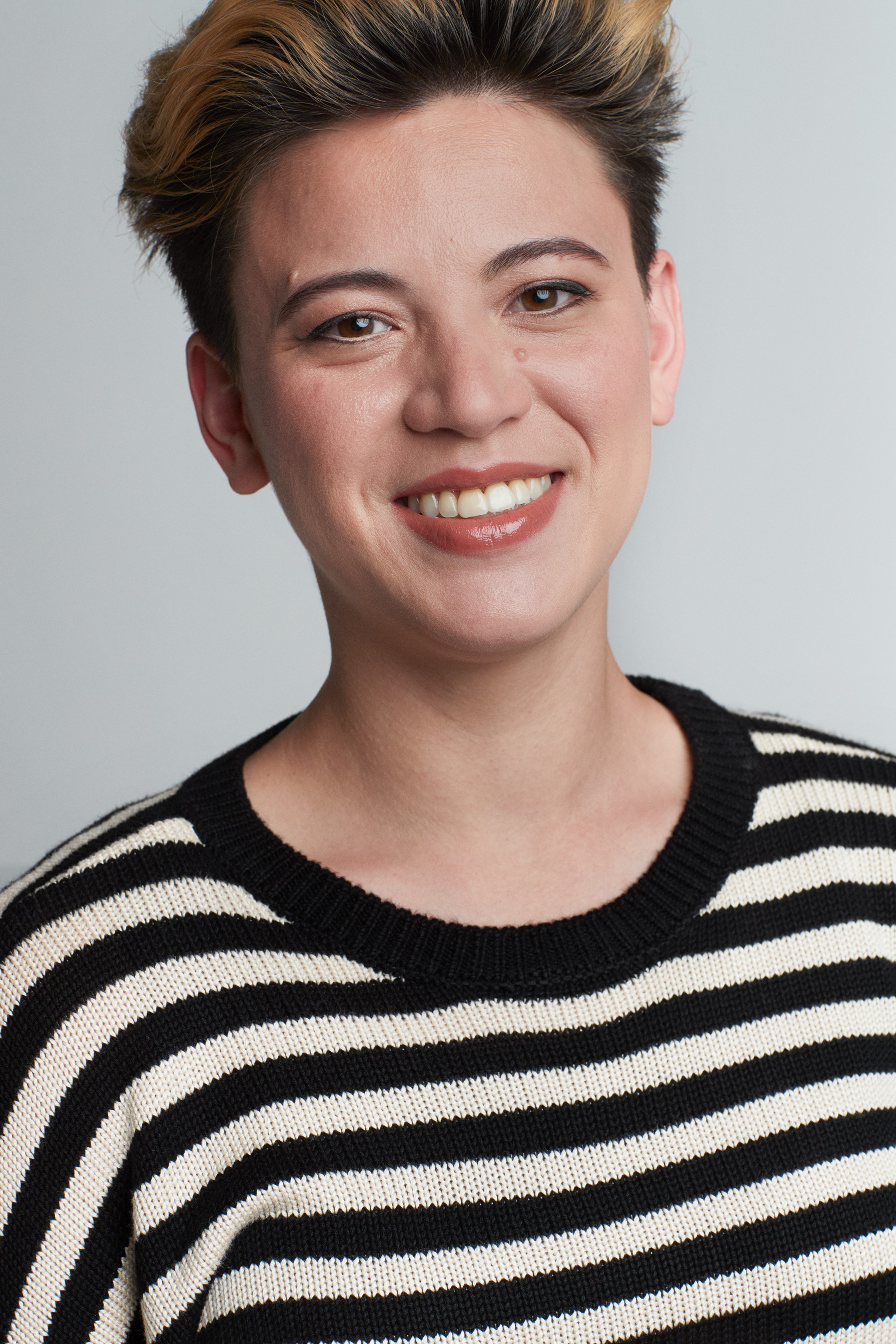
Learn more about Jennifer Truitt
Background of CBS Research/Clinical/Volunteering efforts/achievements
I am a graduate research assistant in the PROSOCIAL Lab at University of Missouri-Kansas City (UMKC), which conducts research on psychotherapy, relationships, intimacy, and loneliness through a behaviorist lens. In my first year of attending ACBS Worldcon, I gave two symposium talks on the application of contextual behavioral science in psychotherapy research and practice. I have also given a guest lecture in an undergraduate course at UMKC to introduce behaviorism to psychology students. I mentor undergraduates and masters students in understanding the science of interpersonal relationships through a radical behaviorist lens.
For my first peer-reviewed publication, I contributed to a chapter on the history of Functional Analytic Psychotherapy that is currently in press. I received a $25,000 grant from The Jed Foundation and Victoria’s Secret PINK to conduct my master’s thesis, which is currently in progress, and to advance the understanding of BATD-R and FEBA. My masters thesis is a treatment study that examines the role of social environment in behavioral activation among a sample of LGBTQ+ young adults who experience loneliness and depressive symptoms. I am comparing a waitlist control condition to Brief Behavioral Activation for the Treatment of Depression (BATD-R) and FAP-Enhanced Behavioral Activation (FEBA). As part of my project, I will provide training to other student therapists and share behavioral activation techniques with local LGBTQ+ organizations.
Autobiography
I am a second-year PhD student in Clinical Psychology, studying with Dr. Daniel Maitland and the PROSOCIAL Lab. I was born and raised in Texas, and received my Bachelor of Arts in Psychology and History from Rice University. After completing my first year of graduate school at Bowling Green State University in Ohio, I moved to University of Missouri-Kansas City to continue my research with Dr. Maitland. I am interested in how contextual behavioral sciences can be leveraged to improve lives, especially among marginalized populations such as LGBTQ+ young adults. When I am not conducting research or seeing therapy clients, I enjoy gardening and writing music. Fun fact: I have had my pilot’s license since I was 17.
Future goals
I hope to have a career in academia where I can conduct research that incorporates clinical practice and encourage future scientists, especially those from marginalized backgrounds, in making the world a better place using the contextual behavioral framework.
Publications
Maitland, D. W. M. & Truitt, J. K. (In Press) The Theoretical Foundations and History of Functional Analytic Psychotherapy. In Li, W., Griffith, G., Shapiro, S., & Zhu, Z. (Eds.) Palgrave Handbook of Third-Wave Psychotherapies. Palgrave Macmillan.
Student Spotlight Award Recipient - Jessica Stark
Student Spotlight Award Recipient - Jessica StarkCongratulations to Jessica Stark on being selected as the Student Spotlight Award winner for May 2018!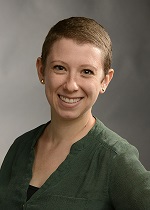
The purpose of this award is to highlight students who are doing important work in the CBS community whether for research, clinical, and/or volunteer-humanitarian efforts.
This is a way to highlight their achievements, let the ACBS community know important work students are doing, and possibly provide a platform for mentoring/collaboration/professional development/conversations around highlighted areas.
Learn more about Jessica:
Background of CBS Research/Clinical/Volunteering efforts/achievements:
I have done various types of work in CBS including clinical work, research, and volunteering, and have also received ongoing training. Clinically, I currently use CBS to inform my internship work at HealthPoint doing primary care behavioral health. The primary population with whom I work in this setting is low-income, including people who are uninsured or underinsured, unemployed, homeless, addicted to drugs, those who have significant medical and mental illness, and new refugees including using interpreters regularly. For research, I worked on Dr. Jonathan Bricker’s team at Fred Hutchinson Cancer Research Center for two years on a study comparing ACT for smoking cessation with typical CBT quit line treatment; in contributing to this research, I provided interventions to primarily low-income, uninsured populations. I also volunteered for two years at South King County Clinic in Seattle providing mental health services, including short interventions such as FACT, to community members who needed free medical, dental, and vision care. Additionally, I have been a student member of ACBS since 2014, was a member of the SIG Review Committee last year, and was the Graduate Student Representative of Washington State Psychological Association for 1.5 years. Lastly, I have attended various CBS-focused conferences including a two-day seminar hosted by the Washington ACBS Chapter with speakers such as Drs. Patty Robinson, Kirk Strosahl, Robert Kohlenberg, and Mavis Tsai, and I have attended multiple online webinars hosted by ACBS’s Dr. D.J. Moran and others.
Autobiography:
I am in my final year towards getting my PsyD at Antioch University Seattle, which has a social justice mission. I have a clinical, empirically-based practice focus to my work, and have a passion working with low-income and underserved populations. I have worked in various clinical settings including in primary care and pediatric clinics, in community mental health, at a school for developmentally differently-abled kids, and an adult psychiatric in-patient facility. I love working with the LGBT community, pregnant and new moms, and individuals on medication assisted treatment for opioid dependence among others, and love being a generalist through the primary care behavioral health (PCBH) model. My dissertation was on video game psychology and what it means for individuals to play the game, The Sims, and find it important to embrace how video games and online communities can contribute to positive identity development. I connected with the Washington State Psychological Association community early in my graduate schooling, connecting to the ACBS community through Dr. Chris McCurry. Since then I have fully embraced using ACT as my main modality for clinical work and conceptualizations, as honed through my training and work with Dr. Jonathan Bricker’s team at Fred Hutchinson Cancer Research Center using ACT for smoking cessation. I have also been fortunate enough to learn about FACT, and its applications in PCBH directly from its creators, Drs. Patty Robinson and Kirk Strosahl. As I plan to graduate in summer 2018, I look forward to seeing what the future holds for me!
Future goals:
I hope to continue to provide CBS-based clinical care to underserved populations through primary care behavioral health.
Student Spotlight Award Recipient - Joanna Kaye
Student Spotlight Award Recipient - Joanna KayeCongratulations to Joanna Kaye on being selected as the Student Spotlight Award winner for February 2018!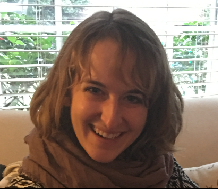
The purpose of this award is to highlight students who are doing important work in the CBS community whether for research, clinical, and/or volunteer-humanitarian efforts.
This is a way to highlight their achievements, let the ACBS community know important work students are doing, and possibly provide a platform for mentoring/collaboration/professional development/conversations around highlighted areas.
Learn more about Joanna:
Background of CBS Research/Clinical/Volunteering efforts/achievements:
My interest in ACT has strongly influenced my research, clinical work, teaching, and volunteering positions. In the realm of research, I became interested in ACT research as the graduate student research coordinator of an RCT in my lab comparing ACT and traditional CBT for social anxiety disorder. For my Master’s thesis, I developed online values clarification and goal-setting programs to determine the extent to which values clarification adds incremental benefit to goal-setting strategies in helping undergraduate freshmen adjust to college. For my doctoral dissertation, I paired my interest in ACT with my interest in exposure therapy. My study aims to reduce the impact of therapists’ discomfort on their clinical decision-making during exposure therapy by incorporating ACT techniques into their training. My hope with this project is that therapists will use ACT techniques to practice willingness to experience discomfort during exposure therapy in the service of their values related to their clinical work, and that ACT strategies will help therapists make more effective clinical decisions.
In my clinical work, I have used ACT with dozens of clients with a range of symptom presentations. I am currently an advanced peer supervisor in our graduate training clinic, where I help supervise graduate students in their delivery of ACT in our mood and anxiety clinic.
Additionally, I am teaching a Master’s-level CBT course that has included a focus on ACT. Finally, I am the Student Representative on the Pennsylvania ACBS Board, where I help to organize ACT-focused training events.
Autobiography:
I grew up in Virginia Beach, VA, and received my BA in Psychology and Spanish from Emory University in Atlanta, GA. I am currently a fourth-year graduate student at Drexel University working with James Herbert and Evan Forman. My clinical and research interests center on acceptance-based treatments and exposure therapy for anxiety disorders. I am drawn to the ACT emphasis on values in all of my clinical work, regardless of whether I am utilizing a full ACT framework. I am interested in the utility of an ACT framework to increase patients’ willingness to engage in difficult behavior change and sustain that behavior change after ending treatment, particularly in the context of exposure therapy for anxiety disorders.
My interest in ACT has also been influenced by my father. He is an anesthesiologist by profession, but has had a passion for mindfulness meditation for many years. I attended meditation meet-up groups with him in high school and college. My interest in ACT was a natural evolution from my experiences with mindfulness meditation in my adolescence. My father is now beginning a second career of sorts by training to become a Mindfulness-Based Stress Reduction teacher, and we often joke about opening a center for mindfulness- and acceptance-based treatments after I finish my training. In my spare time, I love traveling, going to dog parks, trying new restaurants, doing yoga, going on long walks in cute neighborhoods, and hosting dinner parties with friends.
Future goals:
I aim to research how acceptance-based techniques can be used to improve therapists' decision-making.
Student Spotlight Award Recipient - Johannes Freymann
Student Spotlight Award Recipient - Johannes FreymannCongratulations to Johannes Freymann on being selected as the Student Spotlight Award winner for March 2025!
The purpose of this award is to highlight students who are doing important work in the CBS community whether for research, clinical, and/or volunteer-humanitarian efforts.
This is a way to highlight their achievements, let the ACBS community know important work students are doing, and possibly provide a platform for mentoring, collaboration, professional development, and conversations around highlighted areas.
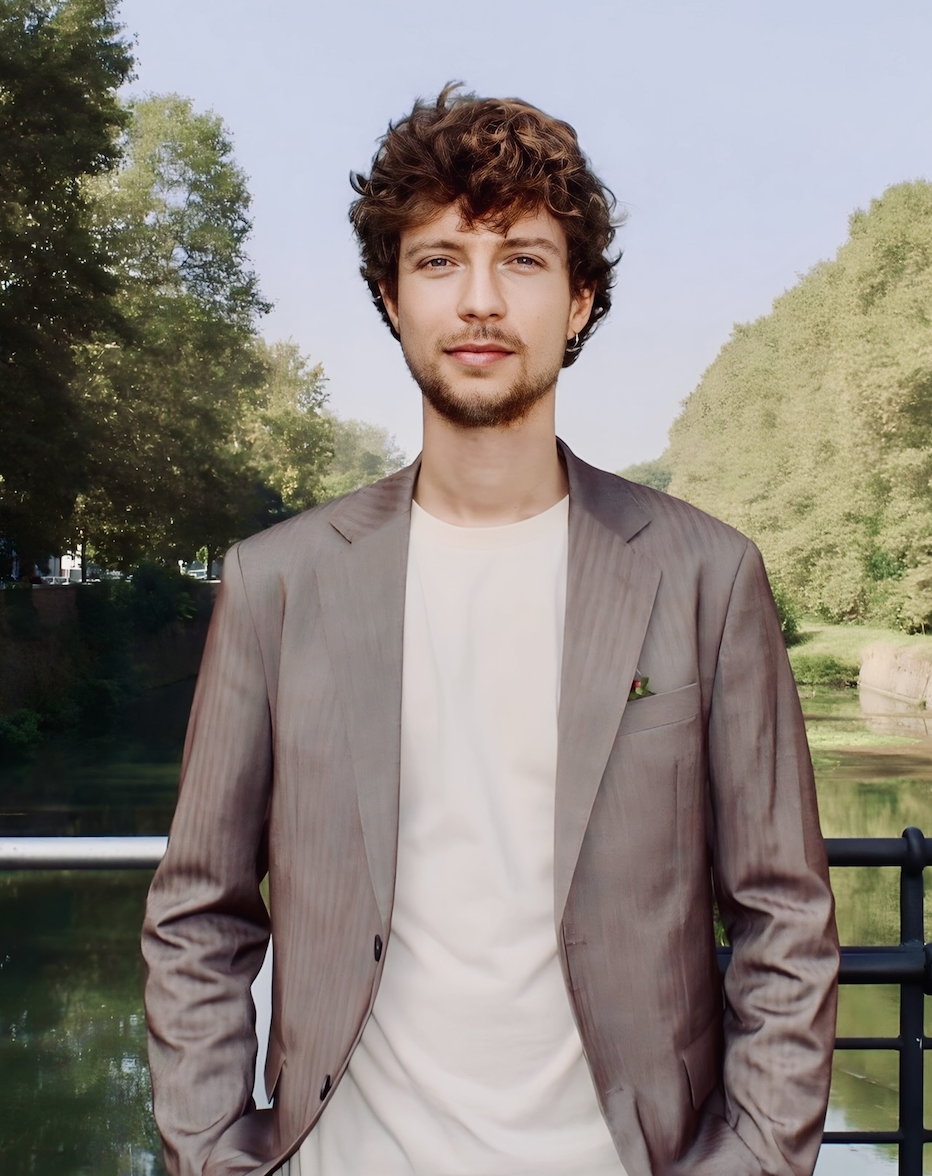
Learn more about Johannes Freymann
Background of CBS Research/Clinical/Volunteering efforts/achievements
2021: Bachelor’s Thesis: Psychological Flexibility in Times of Crisis – Effectiveness of an ACT-Based Video Course During the COVID-19 Pandemic
2023: Research Intern and Therapy Assistant at ACThealthy Lab, focusing on research and therapy with unaccompanied refugee minors
2024: Clinical Internship at a OVID Clinic Berlin, delivering ACT training to staff and patients
2024: Publication of Article in JCBS: Examining Psychological Flexibility in Unaccompanied Refugee Minors: A Network Analysis
2024: Presentation of Research and several workshops at ACBS Conferences in Katowice, Buenos Aires, and Zurich
2024: Research Award from DGKV (German-Speaking Chapter of ACBS)
2023-2024 (current): University of Leipzig: Developing a DNA-V-Based Guide for Teachers to Integrate CBS and ACT into School Curricula in Germany
2023-2024 (current): Licensure Training with Focus on Systemic Psychotherapy and ACT and preparation of PhD project
Autobiography
I’m Johannes Freymann, originally from a small town in eastern Germany. After finishing high school, I spent a year volunteering in Sri Lanka, where I engaged in community service, and assisted in occupational therapy. This experience deeply influenced my decision to pursue a career in psychology. I went on to complete a four-year B.A. in Communication Psychology in Görlitz, Germany, which included an Erasmus semester in Lithuania and an internship with Lufthansa in Singapore. My Bachelor’s thesis focused on the effectiveness of a self-provided ACT-based video course in promoting psychological flexibility during times of crisis, a topic that took on added significance during the COVID-19 pandemic. My curiosity about different cultures then led me to study Clinical, Social, and Intercultural Psychology at the University of Padua, Italy. An internship at the ACThealthy Laboratory in Cyprus allowed me to use network analysis to examine the psychological flexibility of unaccompanied refugee minors in Cyprus. I am currently part of a student lab at Leipzig University, where I am developing a DNA-V guide for teachers and students. I am also training as a psychotherapist, specializing in ACT. Additionally, I serve as a trainer in experiential learning with the European Federation of Psychology Students’ Associations (EFPSA), where I lead sessions on communication, mindfulness, and applied ACT concepts such as DNA-V. Beyond these roles, I am an active member of EFPSA and the MIND Foundation, communities that inspire and support my commitment to advancing the field of psychology and promoting psychological flexibility across diverse contexts.
Future goals (one sentence describing goals in any relevant area)Next year, I plan to continue my licensure training with a focus on systemic therapy and ACT, promote the DNA-V model and guide at various conferences, and begin my PhD in Germany to advance CBS research and foster collaboration within the German-speaking clinical community.
Publications:
https://www.sciencedirect.com/science/article/abs/pii/S2212144724000887
https://dnav.international/article/dna-v-is-integrated-into-high-school-curricula-in-germany-via-openevo/
https://openevo.eva.mpg.de/about/?lang=de
https://dgkv.info/dgkv/vorstand/vorstandswahl-2025/#:~:text=Vorsitzende%3A%20Theresa%20Witting,Johannes%20Freymann%20und%20Lora%20Grozeva
Student Spotlight Award Recipient - Joshua Schultz
Student Spotlight Award Recipient - Joshua SchultzCongratulations to Joshua Schultz on being selected as the Student Spotlight Award winner for June 2019!
The purpose of this award is to highlight students who are doing important work in the CBS community whether for research, clinical, and/or volunteer-humanitarian efforts.
This is a way to highlight their achievements, let the ACBS community know important work students are doing, and possibly provide a platform for mentoring/collaboration/professional development/conversations around highlighted areas.
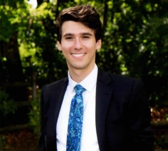 Learn more about Joshua:
Learn more about Joshua:
Background of CBS Research/Clinical/Volunteering efforts/achievements:
I have been studying and practicing Acceptance and Commitment therapy for the past three years in my graduate program, and have been integrating the theory into both my research and clinical placements. I am currently working on my dissertation, which proposes a model for executive coaching using ACT to help leaders cultivate self-compassion, and increase compassion in the workplace culture. I am working with a client, a department head at my university, implementing the ACT coaching model that I am developing. I also use ACT techniques in my current internship placement as a therapist at an inpatient residential drug and alcohol rehabilitation center, where I conduct both individual and group therapy. Through helping my clients identify their values and develop mindfulness skills, I help them take action to accept their demons and act in valued ways. Through developing coping skills and bringing mindful awareness to the choice point, I help my clients get ready for the next phase of their treatment and lives. ACT is an invaluable tool, because it helps me help my clients to stop struggling against themselves.
Autobiography:
I am 25 years old, from Holland, Pennsylvania, and currently live in Philadelphia. I have been studying psychology for the past 8 years, the last 4 in my graduate program. When I am not studying, I am usually spending time with friends and family, and I like to create both art and music. I write poetry and short stories, I paint, and I play the drums in a band which plays shows around the greater Philadelphia area. I am also developing a spiritual practice, grounded in the mindfulness teachings of John Kabat-Zinn and others, as well as my upbringing as a Jewish person. I am growing each day as both a clinician and a human being, and I am excited for the next steps in my life and career.
Future goals:
I hope to work as both an executive coach and therapist, using ACT to help my clients become more compassionate with themselves and others.
Student Spotlight Award Recipient - Julie Petersen
Student Spotlight Award Recipient - Julie PetersenCongratulations to Julie Petersen on being selected as the Student Spotlight Award winner for March 2022!
The purpose of this award is to highlight students who are doing important work in the CBS community whether for research, clinical, and/or volunteer-humanitarian efforts.
This is a way to highlight their achievements, let the ACBS community know important work students are doing, and possibly provide a platform for mentoring, collaboration, professional development, and conversations around highlighted areas.
Learn more about Julie Petersen:
Background of CBS Research/Clinical/Volunteering efforts/achievements: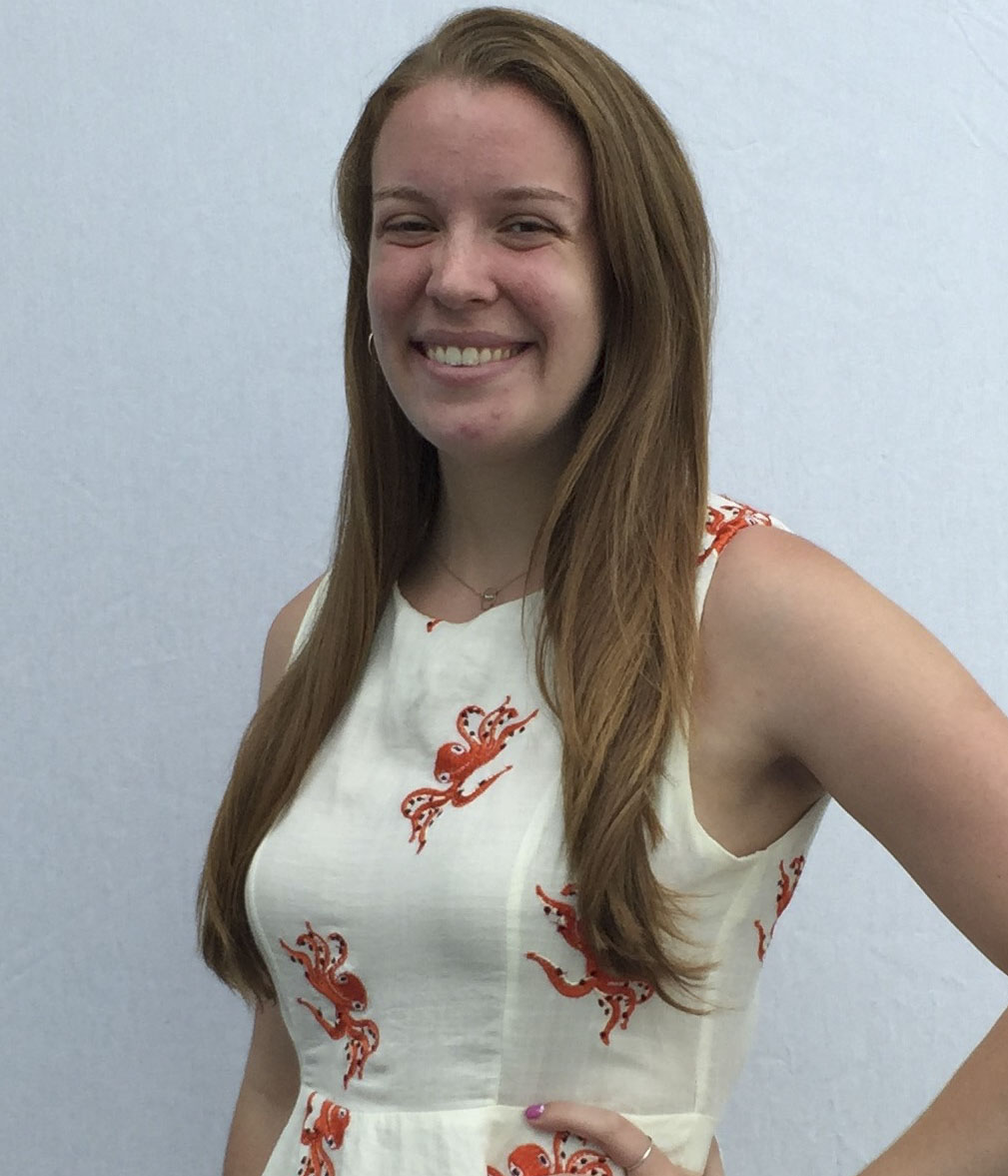
I was first introduced to ACT in graduate school under the mentorship of Dr. Michael Twohig. Once I learned about ACT, I knew I was meant to be an ACT therapist. As I progressed through graduate school, I subsequently focused my research on the adaptation, implementation, and dissemination of ACT for youth across a variety of contexts. For example, my master’s thesis was the first randomized controlled trial (RCT) of DNA-V for adolescents with anxiety; I worked directly with local high schools to implement DNA-V groups into the school day to provide students with extra mental health support. Currently I am working on my dissertation, a RCT of telehealth ACT for adolescents with transdiagnostic health-related anxiety. I also contributed to the creation and testing of ACT Guide for Adolescents, an online, self-help intervention for youth.
Clinically, I am passionate about using acceptance-based approaches like ACT to empower youth to explore and pursue what they find most meaningful. I have worked in an ACT community clinic for the last two years, primarily working with young people. I have also specifically spent the last several months working with undergraduate athletes, collaboratively using ACT to empower them to discover their best selves within and outside of athletic achievement. I am inspired daily by the strength of the young people I work with and strive to use humor and engaging activities to make treatment meaningful and fun, whether it be in a traditional clinic, telehealth, schools, or self-help.
Autobiography:
I grew up in New Jersey, USA, and have a special place in my heart for the Garden State. I completed my undergraduate degree in psychology at Haverford College, where I had my first experiences in psychology research. Before coming to USU for graduate school in clinical psychology, I had the opportunity to gain first-hand experience with treatment research through my role as a research assistant for Dr. Edna Foa at the University of Pennsylvania's Center for the Treatment and Study of Anxiety. Presently, I am a fourth-year doctoral student in the combined clinical/counseling psychology program at Utah State University (USU). I work primarily with Drs. Michael Twohig and Michael Levin. Through USU and my mentors, I fell in love with ACT and have been passionate about acceptance-based therapies ever since. My research at USU is primarily centralized around ACT and obsessive-compulsive-related concerns and anxiety, particularly for children and adolescents. I love working with young people and feel deeply connected to the suffering, power, and imagination of adolescence. I learn from the youth I work with every day and am especially grateful for their willingness and strength. Beyond psychology, I love nail art, reading, music, and reality TV. Everyone in my life knows way more about ACT than they probably ever thought they would—I am grateful for all the love and support I have received from my family, friends, and mentors.
Future goals:
I hope to further research and disseminate ACT for young people in most need of the tools to live life in service of what is most meaningful to them.
Relevant publications:
Petersen, J.M., Hayes, L., Gillard, D., & Ciarrochi, J. (In press). ACT for children and adolescents. In Twohig, M.P., Levin, M.E., & Petersen, J.M. (Eds.), The Oxford Handbook of Acceptance and Commitment Therapy. Oxford University Press.
Twohig, M.P., Levin, M.E., & Petersen, J.M., (In press). The Oxford Handbook of Acceptance and Commitment Therapy. Oxford University Press.
Twohig, M. P., Petersen, J. M., Fruge, J., Ong, C. W., Barney, J. L., Krafft, J., Lee, E. B., & Levin, M. E. (in press). A pilot randomized controlled trial of online-delivered ACT-enhanced behavior therapy for trichotillomania in adolescents. Cognitive and Behavioral Practice.
Petersen, J.M. & Twohig, M.P. (in press). Sexual orientation intrusive thoughts and well-being: The mediating role of psychological inflexibility. Journal of Cognitive Psychotherapy.
Krafft, J., Ong, C.W., Davis, C.H., Petersen, J.M., Levin, M.E., & Twohig, M.P. (in press). An open trial of group acceptance and commitment therapy (ACT) with an adjunctive mobile app for generalized anxiety disorder (GAD). Cognitive and Behavioral Practice.
Ong, C.W., Lee., E.B., Petersen, J.M., Levin, M. E., & Twohig, M.P. (in press). Is perfectionism always unhealthy? Examining the moderating effects of psychological flexibility and self-compassion. Journal of Clinical Psychology.
Petersen, J.M., Durward, C., Levin, M. (2021). Psychological inflexibility as a mediator between weight self-stigma and health-related outcomes. Bulletin of Menninger Clinic, 85(3), 316-330
Ong, C.W., Krafft, J., Panoussi, F., Petersen, J. M., Levin, M. E., & Twohig, M.P. (in press). In-person and online-delivered acceptance and commitment therapy for hoarding disorder: A multiple baseline study. Journal of Contextual Behavioral Science.
Zemestani, M., Salavati, M., Seyedolshohadaii, A., Petersen, J., Twohig, M., & Ghaderi, E. (2020). An Iranian randomized controlled trial of acceptance and commitment therapy (ACT) versus exposure and response prevention (ERP) for patients with obsessive-compulsive disorder on an optimal dose of SSRIs. Behavior Modification, 0145445520982977.
Petersen, J.M., Ong, C.W., Hancock, A., Gillam, R., Levin, M.E., & Twohig, M.P. (2020). An examination of the relationship between perfectionism and neurological functioning. Journal of Cognitive Psychotherapy, 1.
Ong, C. W., Pierce, B. G., Petersen, J. M., Barney, J. L., Fruge, J. E., Levin, M. E., & Twohig, M. P. (2020). A psychometric comparison of psychological inflexibility measures: Discriminant validity and item performance. Journal of Contextual Behavioral Science, 18, 34-47.
Davazdahemami, M. H., Bayrami, A., Petersen, J. M., Twohig, M. P., Bakhtiyari, M., Noori, M., Kheradmand, A. (2019). Effectiveness of acceptance and commitment therapy for death anxiety in Iranian clients diagnosed with OCD. Bulletin of the Menninger Clinic, 1.
Petersen, J. M., Krafft, J., Twohig, M. P., Levin, M. E. (2019). Evaluating the open and engaged components of acceptance and commitment therapy in an online self-guided website: Results from a pilot trial. Behavior Modification. 0145445519878668.
Twohig, M.P., Levin, M.E., & Petersen, J.M., (In press). Introduction to Oxford University Press Handbook of Acceptance and Commitment Therapy. In Twohig, M.P., Levin, M.E., & Petersen, J.M. (Eds.), The Oxford Handbook of Acceptance and Commitment Therapy. Oxford University Press.
Krafft, J., Petersen, J.M., & Twohig, M.P. (In press). Acceptance and commitment therapy for obsessive-compulsive and related disorders. In In D. McKay, J. Abramowitz, & E. Storch (Eds.). Complexities in Obsessive-Compulsive and Related Disorders. New York: Oxford Press.
Twohig, M. P., Ong, C. W., Petersen, J. M., Barney, J. L., & Fruge, J. E. (2020). Acceptance and Commitment Therapy and Exposure Exercises. In M. E. Levin, M. P. Twohig, & J. E. Krafft (Eds.). Innovations in ACT. New Harbinger: Oakland, CA.
Student Spotlight Award Recipient - Kaeyoor Joshi
Student Spotlight Award Recipient - Kaeyoor JoshiCongratulations to Kaeyoor Joshi on being selected as the Student Spotlight Award winner for April 2025!
The purpose of this award is to highlight students who are doing important work in the CBS community whether for research, clinical, and/or volunteer-humanitarian efforts.
This is a way to highlight their achievements, let the ACBS community know important work students are doing, and possibly provide a platform for mentoring, collaboration, professional development, and conversations around highlighted areas.
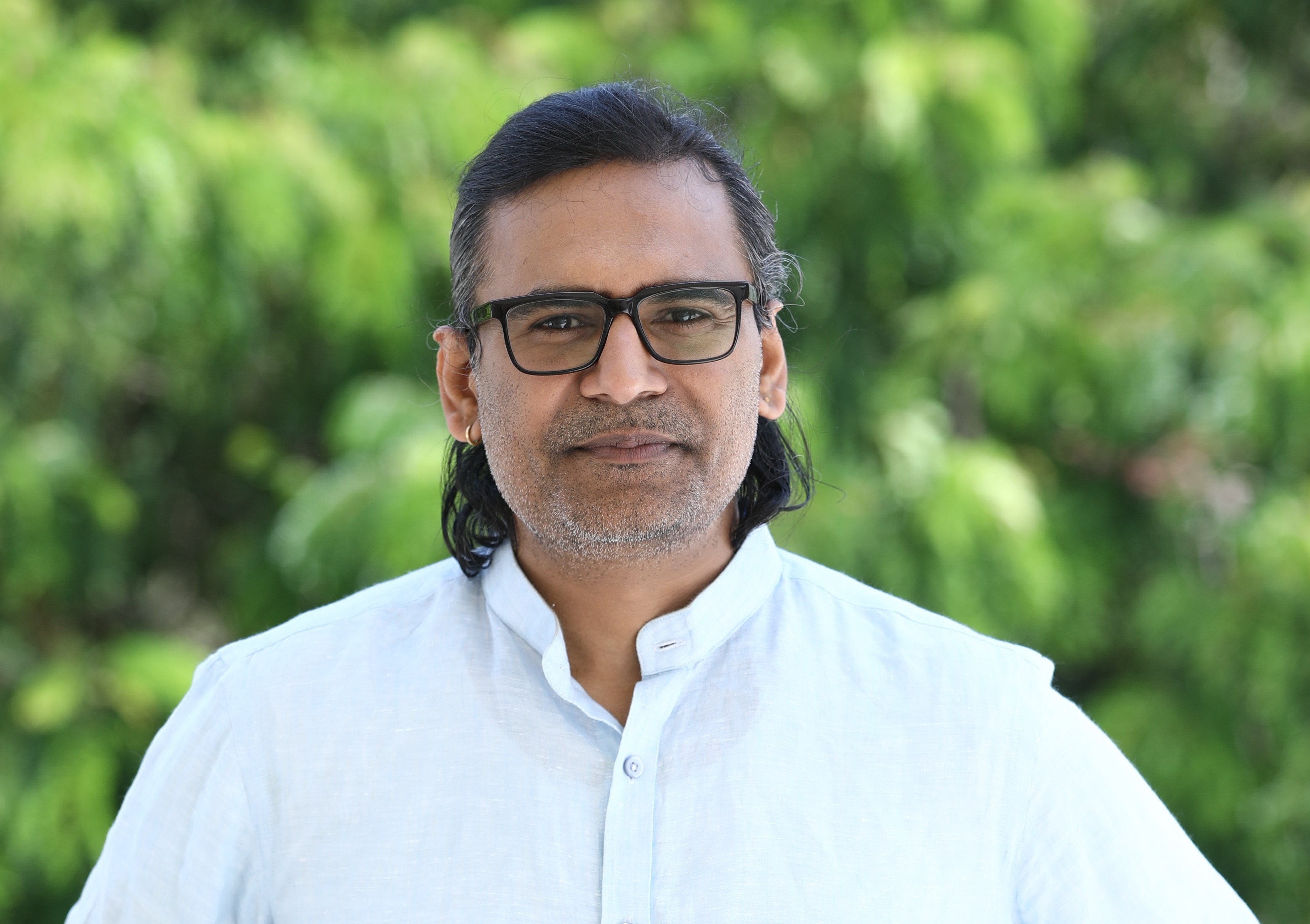
Learn more about Kaeyoor Joshi
Background of CBS Research/Clinical/Volunteering efforts/achievements
I was born and raised in India, where I completed my undergraduate and graduate education in psychology at Maharaja University of Baroda. As a first-generation college student who grew up in poverty, I faced many challenges, and Acceptance and Commitment Therapy (ACT) became a vital source of support during difficult times. The resilience I developed through ACT helped me navigate life's ups and downs, and this personal experience has deeply influenced my work.
After working as a school counselor for three years in India, I moved to the USA to further my education, earning a specialist degree in school psychology and currently pursuing a Ph.D. in Educational Psychology at the University of Nebraska-Lincoln. My work has focused on using ACT with youth and adolescents, particularly refugee school students. The utility of ACT in helping these individuals build resilience has been a cornerstone of my practice.
Since beginning my Ph.D. in 2020, I have focused my research on ACT and emotional regulation, especially among youth in low- and middle-income countries (LMICs). I spend about 4-5 months each year in India, promoting ACT as an intervention tool in school mental health. My collaborators and I have translated several psychological measures and adapted the DNA-V model for use in India, where it is currently being tested with school students. These efforts have contributed to a growing momentum for ACT in western India, raising awareness and encouraging its use among therapists and educators.
Autobiography
I grew up in India as a first-generation college student and completed my undergraduate and graduate studies in psychology before moving to the USA to further my education. ACT has played a critical role in my life, helping me build resilience through challenges, and this is now reflected in my work. My professional experience includes working as a school counselor, promoting ACT for youth and adolescents, and conducting research to expand its application in LMICs and with refugee students.
Future goals
My goal is to continue promoting ACT as a culturally sensitive tool in LMICs, supporting mental health professionals, and helping youth and adolescents build resilience and thrive globally.
PUBLICATIONS
In preparation
Joshii K., Clark C.A.C., Joshi A. C., Joshi H.J. (in-preparation). Examining the relationship between executive functions and psychological flexibility in adolescents in India.
Joshii K., Goel M., Pithva Y., Vyas G., Yakub Z., (in-preparation). Growth curve modeling of acceptance and commitment therapy (ACT) based group intervention among youth in India.
Joshii K, Joshi A.C., Clark C.A.C. (in-preparation) Integration of psychological flexibility as a vital element in school-based mental health screening protocols.
Peer Reviewed Publications
Goel M., Pithva Y., Vyas G., Yakub Z., Keswani K., Joshi K.*, (accepted). Unraveling the intricacies of youth mental health in India. Mind and Society.
Clark C.A.C, de Almeida, P., & Joshi, K. (2024). Preschool children’s heart rate variability across contexts of low and high emotional challenge correlates with their self-regulation performance. Infant and Child Development, 33(1). https://doi.org/10.1002/icd.2507
Simon, J. B., Nail, P. R., Swindle, T., Bihm, E. M., & Joshi, K. J. (2016). Defensive egotism and self-esteem: A cross-cultural examination of the dynamics of bullying in middle school. Self and Identity,16(3), 270-297. doi:10.1080/15298868.2016.1232660.
*Role as a mentor
Student Spotlight Award Recipient - Kevin Davies
Student Spotlight Award Recipient - Kevin DaviesCongratulations to Kevin Davies on being selected as the Student Spotlight Award winner for April 2018!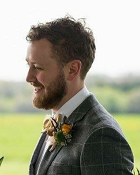
The purpose of this award is to highlight students who are doing important work in the CBS community whether for research, clinical, and/or volunteer-humanitarian efforts.
This is a way to highlight their achievements, let the ACBS community know important work students are doing, and possibly provide a platform for mentoring/collaboration/professional development/conversations around highlighted areas.
Learn more about Kevin:
Background of CBS Research/Clinical/Volunteering efforts/achievements:
I am currently in my second year of the master's program of counseling psychology at UW-Madison, and I was first alerted to ACT as a possible theoretical orientation for my clinical work this past summer. Since then, I have been eating up the literature on Acceptance and Commitment Therapy, and have been using ACT with my clients. Since there are very few colleagues in my program that use ACT, I have essentially trained myself in the approach, using books, podcasts, ACBS resources, and discussions with peers. I have also begun to teach my cohort about ACT and have given presentations on ACT-based interventions and case conceptualizations. I have found Acceptance and Commitment Therapy to be extremely useful in my approach with clients, and in my own personal growth.
Autobiography:
I am a second-year master's student in the Department of Counseling Psychology at the University of Madison-Wisconsin. Currently, I am working directly with individual clients and couples, and I have been working with Dr. Carmen Valdez on research surrounding family-based interventions for Latinx families. My main interests are improving access to mental health services at the community level, along with improving quality of care for typically undeserved populations. Those interests have led me on an exciting career, which has included serving adults with developmental disabilities, providing suicide-prevention crisis aid, and volunteering as a family counselor.
I grew up in Cincinnati, Ohio, but have lived in Wisconsin for about 4.5 years now. When I am not working, I enjoy spending time with friends and family, playing guitar, playing board games, and watching clouds. Moving forward, I have just finished my applications to doctoral programs in clinical and counseling psychology, and I’m interested in working with elderly individuals.
Future goals:
I'm looking forward to further developing my skills and knowledge surrounding CBS, and I aim to engage with the ACBS community!
Student Spotlight Award Recipient - Korena Klimczak
Student Spotlight Award Recipient - Korena KlimczakCongratulations to Korena Klimczak on being selected as the Student Spotlight Award winner for January 2024!
The purpose of this award is to highlight students who are doing important work in the CBS community whether for research, clinical, and/or volunteer-humanitarian efforts.
This is a way to highlight their achievements, let the ACBS community know important work students are doing, and possibly provide a platform for mentoring, collaboration, professional development, and conversations around highlighted areas.
Learn more about Korena Klimczak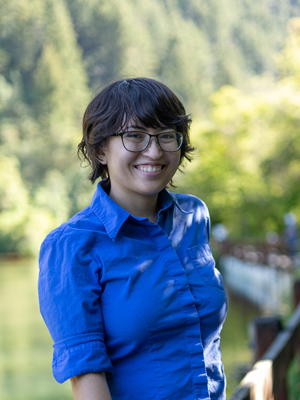
Background of CBS Research/Clinical/Volunteering efforts/achievements:
I became involved with the CBS community in 2019, when I first began graduate school at Utah State University under Dr. Michael Levin’s mentorship. I have since pursued lines of research investigating ACT-based digital mental health interventions, and issues related to adherence, engagement, and implementation. This research includes the development of a novel ACT-based peer coaching intervention to improve adherence to the 10-week online ACT self-help program called ACT Guide. I tested this peer-coaching intervention through an RCT and subsequently implemented it as an available service for Utah State University student users of ACT Guide. I have additionally conducted a meta-analysis on online ACT interventions and have taken lead roles in developing online self-guided ACT-based interventions that are or will be available for public use outside of research contexts. This includes a single-session ACT program that takes 45 minutes to complete called ACT Guide Lite, and an online 6-session ACT program tailored to autistic adults.
I have also provided service to the CBS community through my role as a SIG-leader for the ACTing with Technology SIG over the past two years. In this role, I revamped the SIG website (https://actingwithtech.wordpress.com/) to make it more openly accessible as a resource for researchers and therapists seeking information about technology-supported ACT and CBS work, and have organized online talks, panels, and networking events to facilitate community growth within the SIG. I have also given workshops on ACT, training therapists on ACT more generally as well as on digital tools for enhancing clinical practice.
Autobiography:
I grew up in south Florida and completed my BA in Psychology in Virginia at Old Dominion University in 2019. I have enjoyed my time in Utah over the past five years as a student in the Combined Clinical and Counseling Psychology PhD program at USU with Dr. Michael Levin as my mentor. I have always had a fascination with technology and the internet’s role in culture, society, and the human condition. I ultimately wanted to pursue a career where I can help shape and manifest technologies that support people in living meaningful lives and pursued this through studying psychology. I want to capitalize on technology’s potential to increase the accessibility of mental health resources for all, and to offer new novel tools for helping people live better lives that would not otherwise be possible. This led me to my research interest in clinical applications of technology, with a specific focus on ACT. I care deeply about making the products of research relevant and useful to real-world contexts, and thus prioritize work that translates evidence-based findings to real-life services. I also enjoy implementing advanced statistical methods and rigorous methodology, as these tools can help shed light on making sense of data in interesting ways and make clinical psychology a better science. Outside of work, I love playing games, picking up new hobbies, and doing deep dives into interesting topics, some of these over the past few years including roller skating, mechanical keyboards, speculative evolution, and the history of tattooing!
Future goals:
I hope to use my skills as a clinical psychologist to help implement and improve real-life digital interventions available to the public.
Publications:
Davis, C. H., Klimczak, K.S., Aller, T. B., Twohig, M. P., & Levin, M.E. (In press). Reach, adoption, and maintenance of online acceptance and commitment therapy at a university: An implementation case study. Psychological Services.\
Klimczak, K.S., & Levin, M.E. (2023). Acceptance and commitment therapy. In: Friedman, H.S., Markey, C.H. (Eds.), Encyclopedia of Mental Health (Third Edition), vol. 1. Elsevier, Academic Press, pp. 1–9. https://doi.org/10.1016/B978-0-323-91497-0.00121-1.
Klimczak, K. S., Schwartz, S. E., Donahue, M. L., Capel, L. K., Snow, J. L.*, & Levin, M. E. (2023). Disentangling trait and state psychological inflexibility: A longitudinal multilevel approach. Journal of Contextual Behavioral Science, 29, 13-22. https://doi.org/10.1016/j.jcbs.2023.05.006
Klimczak, K. S., San Miguel, G. S., Mukasa, N. M., Twohig, M. P., & Levin, M. E. (2023). A systematic review and meta-analysis of online Acceptance and Commitment Therapy as a transdiagnostic self-help intervention. Cognitive Behaviour Therapy, 52(3), 269-294. https://doi.org/10.1080/16506073.2023.2178498
Klimczak, K. S., Twohig, M. P., Peacock, G. G., & Levin, M. E. (2023). Using peer-support coaching to improve adherence to online ACT self-help for college mental health: A randomized controlled trial. Behaviour Research and Therapy, 160, 104228. https://doi.org/10.1016/j.brat.2022.104228
Krafft, J., Klimczak, K. S., & Levin, M. E. (2022). Effects of cognitive restructuring and defusion for coping with difficult thoughts in a predominantly white female college student sample. Cognitive Therapy and Research, 46, 86-94. https://doi.org/10.1007/s10608-021-10242-4
Student Spotlight Award Recipient - LAM CHING-YEE
Student Spotlight Award Recipient - LAM CHING-YEECongratulations to LAM Ching Yee on being selected as the Student Spotlight Award winner for August 2023!
The purpose of this award is to highlight students who are doing important work in the CBS community whether for research, clinical, and/or volunteer-humanitarian efforts.
This is a way to highlight their achievements, let the ACBS community know important work students are doing, and possibly provide a platform for mentoring, collaboration, professional development, and conversations around highlighted areas.
Learn more about Ching Yee:
Background of CBS Research/Clinical/Volunteering efforts/achievements:
My PhD study is about developing and examining feasibility of an ACT-based intervention program for promoting psychological wellbeing in adolescent nursing students. Personally, I experienced great challenge during role transition from nurse learner to staff nurse. Now, as a nurse educator, I hope my students would experience an easier role transition by using ACT.
Thanks to Dr Asher's family, the Behavior Therapy Associates, and the ACBS Award Committee, I recently received the Michael J. Asher Student Dissertation Award (First Prize). With the monetary award from this award, I plan to study further on promoting children and adolescents’ psychological wellbeing as well as promoting their psychological flexibility. More, I made ACT-related research presentations via poster and oral presentations at the ACBS World Conferences and other conferences. Currently, I am in the final stage of my PhD study and am preparing manuscripts based on my study findings.
Regarding volunteering efforts, I have been involved in the CBS community since 2020 when I was selected as the Student Representative of ABCS Board. After that, I continue serve the ACBS community as a Co-Chair of Student SIG till now and I join the Research Support, JEDI Team this year. Also, I am a member of Asian SIG and Hong Kong Chapter. About introducing ACT to Chinese community, I served as one of the trainers and developers in a ACT program which focused on parenting, and conducted the “Lunch and Learn - Mental Break” for employees of an international bank in Hong Kong.
Autobiography:
I am a PhD student studying at the School of Nursing, Hong Kong Polytechnic University, Hong Kong. I obtained my Master of Philosophy (MPhil) and Master of Nursing (MNurs) at The University of Hong Kong, and Bachelor of Nursing (BNurs) at the La Trobe University.
My research interests are promoting psychological wellbeing in adolescents and people who might be at risk of suffering. To start with, I focus on applying ACT to promote psychological wellbeing in adolescent nursing students. Thanks to my supervisor, Dr Yim-wah Mak, she brings me to the world of CBS. Where, I find ACT very beneficial, both to myself and others, as it promotes psychological flexibility and sheds light on valued-driven behavior, and it helps people to live with dilemma of human suffering. Other thanks go to my co-supervisor, Dr Sau-fong Leung, she shows me insights from perspectives of mental nursing. This is new experience which I have not learnt during my previous studies in general nursing. Many thanks go to my family, friends and students as they provide me a lot of opportunities in understanding suffering and applying ACT in daily life.
I am passionate in identifying culturally competent approach to facilitate people of different backgrounds to live with their struggles. My next step is to further promote the use of ACT in Hong Kong/Chinese community.
More, I am also a trainer in healthcare simulation and debriefing. In my spare time, I enjoy spending time with my family and friends, and traveling.
Future goals:
My goal is to identify and develop culturally appropriate ACT-based practices for people who are suffering. Thus, I hope to facilitate people to abandon suffering and obtain happiness, and to achieve a valued-driven life.
Relevant publications:
Zhang; X, Ma, H., Lam, C.Y., Ho, G.W.K and Mak, Y.M. Effectiveness of Acceptance and Commitment Therapy on self-care, psychological symptoms, and quality of life in patients with cardiovascular disease: A systematic review and meta-analysis. Journal of Contextual Behavioral Science. (submitted).
Lam, C.Y., Mak, Y.W. and Leung, S.F. The acceptance and commitment therapy for promoting psychological wellbeing in new graduate nurses: a study protocol. (in preparation).
Lam, C.Y., Mak, Y.W. and Leung, S.F. The feasibility and acceptability of ACT-based role transition program for new graduated nurse. (in preparation).
Wong, S. L., Baljit-Kaur, G., Chan, J. H. M., Cheung, A. P. H., Charm, C. Y. C., Fung, K. M., Lam, C. Y., Tong, M. Y. T., Lo, C. K. Y., Tsang, A. Y. K., & Nestel, D. (2021). School-based research agenda on healthcare simulation for nursing education in Hong Kong. BMJ Simulation & Technology Enhanced Learning, 7 (5).
Lam, C.Y., Lo, C.K.Y., and Charm, C.Y.C. (2019). Substitution of traditional clinical experience with simulated clinical experience in pre-licensure nursing programme: a scoping review. In Technological Innovation in Nursing Education and Practice. Hong Kong: OUHK.
Charm, C.Y.C., Lo, C.K.Y., and Lam, C.Y. (2019). Standardized patients in nursing education: challenges ahead. In Technological Innovation in Nursing Education and Practice. Hong Kong: OUHK.
Lo, C.K.Y., Charm, C.Y.C., Lee, C.N.Y., and Lam, C.Y. (2019). Performance in high-fidelity simulation training on respiratory failure management: an evaluation study. In Technological Innovation in Nursing Education and Practice. Hong Kong: OUHK.
Student Spotlight Award Recipient - Lauren Johnson
Student Spotlight Award Recipient - Lauren JohnsonCongratulations to Lauren B. Johnson on being selected as the Student Spotlight Award winner for March 2019!
The purpose of this award is to highlight students who are doing important work in the CBS community whether for research, clinical, and/or volunteer-humanitarian efforts.
This is a way to highlight their achievements, let the ACBS community know important work students are doing, and possibly provide a platform for mentoring/collaboration/professional development/conversations around highlighted areas.
Learn more about Lauren:
Background of CBS Research/Clinical/Volunteering efforts/achievements:
While completing my first clinical practicum, I had the opportunity to receive significant training and supervision in ACT while implementing the intervention with several patients. Following that experience, my interest in CBS continued to grow, which prompted my application to serve as a student representative for the Pennsylvania Board of ACBS. Being a student representative has allowed me to engage with other like-minded individuals interested in enhancing their practice of CBS interventions while also contributing to the goals of increasing student engagement in ACBS, planning training events, and creating a strong CBS community within the greater Philadelphia and surrounding areas. Recently, our chapter initiated an ACT consultation group based on the Portland Model, which has been yet another excellent chance to continue growing as an ACT practitioner through peer-to-peer consultation, skill-building, and other valuable activities. At my current practicum placement, there is a significant focus on utilizing ACT and I have been able to advance my skill-set greatly through the diverse training opportunities available. Outside of individual therapy, I receive supervision from an ACT perspective and will begin co-leading an ACT group in the upcoming month. Additionally, I serve as a therapist for two clinical research studies centered on using ACT for individuals with chronic medical conditions. The first focuses on using ACT to reduce shame, stigma, and depression among individuals living with HIV. The second, ACT with Cystic Fibrosis, focuses on reducing depressive and anxiety symptoms in individuals with CF and uses a telehealth adaptation to enhance accessibility.
My engagement in the CBS community has grown immensely through my position as a student representative for the Pennsylvania Chapter of ACBS, use of ACT in clinical practice with diverse populations, participation in ACT consultation/supervision, and role as a therapist for research studies examining the impact of ACT for individuals with HIV and Cystic Fibrosis. These activities have continued to remind me of the applicability of CBS interventions to a vast number of psychological and health-related conditions as well as enhanced my ability to effectively apply ACT to address the diverse challenges that my patients face. I plan to continue advancing my knowledge in CBS through ongoing engagement in my current activities, starting to co-lead an ACT group, and seeking to present CBS-related research at the 2019 ACBS conference.
Autobiography:
I was born in Washington, D.C., but grew up in the suburbs of Atlanta, GA. I received my BA from Vanderbilt University where I triple-majored in Psychology, Sociology, and Philosophy. Subsequently, I completed a Master of Education in Human Development and Psychology at Harvard University. Currently, I am a third-year clinical psychology PhD student at Drexel University working with Dr. Arthur Nezu and Dr. Christine Maguth Nezu. My clinical and research interests center around trauma and suicide, with a particular focus on military and veteran populations. Given my significant interest in military mental health, I decided to pursue military service and recently commissioned into the Air Force. Upon completion of my doctoral studies, I will begin my active duty service as an Air Force clinical psychologist. Over the past couple years, my research, clinical, and volunteer experiences focused on ACT have been immensely beneficial in adding a powerful intervention to my clinical toolbox. I believe my continued efforts to grow as an ACT practitioner will have significant value as I currently treat and will continue to treat military personnel. Stepping outside of my school-related responsibilities, I engage in numerous activities in support of a values-driven life. I enjoy reading (especially books that are adapted into films), doing yoga, travelling, eating seafood, and hanging out with my adorable Burmese cat, Tilly.
Future goals:
I have a clinical interest in utilizing ACT to address the mental health needs of military personnel and a burgeoning research interest in examining ACT principles and strategies to enhance the treatment of moral injury and/or PTSD within military and veteran populations.
Student Spotlight Award Recipient - Lynn Farrell
Student Spotlight Award Recipient - Lynn FarrellCongratulations to Lynn Farrell on being selected as the Student Spotlight Award winner for December 2018!
The purpose of this award is to highlight students who are doing important work in the CBS community whether for research, clinical, and/or volunteer-humanitarian efforts.
This is a way to highlight their achievements, let the ACBS community know important work students are doing, and possibly provide a platform for mentoring/collaboration/professional development/conversations around highlighted areas.
Learn more about Lynn:
Background of CBS Research/Clinical/Volunteering efforts/achievements:
I first came across CBS research through an introduction to Relational Frame Theory (RFT) and the Implicit Relational Assessment Procedure (IRAP) during my undergraduate degree in Maynooth University. This inspired me to research implicit relational responding, specifically how we implicitly relate gender to Science, Technology, Engineering and Math (STEM) fields. Following this research path led me to University College Dublin (UCD) where I became a member of the CBS lab there, led by Dr. Louise McHugh. Here, I have had the opportunity to collaborate on a number of other research projects including examinations of cyberbullying, citation analysis and publication trends. I received a postgraduate scholarship from the Irish Research Council to continue pursuing my research into the nature and malleability of gender-STEM bias using the IRAP. To date I have published two papers on this topic in the JCBS and have disseminated this work both nationally and internationally. Along with a diverse team of inspiring fellow RFT researchers, I’ve been involved in the development and delivery of a workshop aimed at helping others to conduct RFT research and form research collaborations. This workshop was most recently delivered at the ACBS World Conference in Seville (2017). I am also currently one of the student representatives on the board for the Women in ACBS SIG, a position that has broadened my knowledge of how a CBS-based approach can contribute to social change.
Autobiography:
I’m from Dublin, Ireland and was the first in my family to graduate from university when I achieved my BA in Psychology from Maynooth University. My introduction to RFT changed how I approached research and topics of interest to me in ways I had never imagined. While working in UCD I was fortunate enough to be invited to join the CBS lab there. In my time as a member of this wonderful lab I have been introduced to some of the incredible people behind CBS research and its many diverse strands, including an introduction to ACT. Though I may never be the first to volunteer for ACT role-play exercises (“experiential avoidance!” I hear you cry), I do try to incorporate ACT consistent techniques into my life and live in accordance with my values. I’ve made some wonderful friends and have had the support of incredible mentors within the CBS community. My recent involvement in the Women in ACBS SIG has only strengthened this sense of community. I hope to continue to develop as a researcher and contribute to research that is both meaningful and useful, particularly in the vast area of equality. I am currently trying to develop interventions that strengthen positive relations between women and STEM to counter stereotypes within this domain. I have much still to learn but am grateful for the opportunity to do so with curiosity and compassion within the ACBS community.
Future goals:
I hope to continue to research and promote issues relevant to equality and diversity and to continue to develop as a researcher within the ACBS community.
Relevant publications:
Farrell, L. & McHugh, L. (2017). Examining gender-STEM bias among STEM and non-STEM students using the Implicit Relational Assessment Procedure (IRAP). Journal of Contextual Behavioural Science. DOI: 10.1016/j.jcbs.2017.02.001 https://www.sciencedirect.com/science/article/pii/S2212144717300042
Farrell, L., Cochrane, A., & McHugh, L. (2015). Exploring attitudes towards gender and science: The advantages of an IRAP approach versus the IAT. Journal of Contextual Behavioural Science, 4(2), 121-128. DOI: 10.1016/j.jcbs.2015.04.002 https://www.sciencedirect.com/science/article/pii/S2212144715000204
O’Connor, M., Farrell, L., Munnelly, A., & McHugh, L. (2017). Citation analysis of relational frame theory: 2009–2016. Journal of Contextual Behavioral Science, 6(2), 152-158. https://www.sciencedirect.com/science/article/pii/S2212144717300339
Munnelly, A., Farrell, L., O’Connor, M., & McHugh, L. (2017). Adolescents’ Implicit and Explicit Attitudes Toward Cyberbullying: an Exploratory Study Using the Implicit Relational Assessment Procedure (IRAP) and Self-Report Measures. The Psychological Record, 1-10. https://link.springer.com/article/10.1007/s40732-017-0261-0
Student Spotlight Award Recipient - Maria Coimbra
Student Spotlight Award Recipient - Maria CoimbraCongratulations to Maria Coimbra on being selected as the Student Spotlight Award winner for September 2025!
The purpose of this award is to highlight students who are doing important work in the CBS community whether for research, clinical, and/or volunteer-humanitarian efforts.
This is a way to highlight their achievements, let the ACBS community know important work students are doing, and possibly provide a platform for mentoring/collaboration/professional development/conversations around highlighted areas.
Learn more about Maria:
Background of CBS Research/Clinical/Volunteering efforts/achievements:
I began studying CBS in 2020, during my final year as a Master’s student in Coimbra, Portugal. My internship and thesis focused on applying CBS to clinical and health psychology, specifically studying Orthorexia Nervosa (ON). This work led to the development and publication of the first ON assessment measure for the Portuguese population and my participation in the International Consensus for ON. Since then, I’ve collaborated on various research and clinical projects with populations such as those with chronic illnesses, at-risk youth, homelessness, disordered eating, and body dysmorphia (BDD).
In 2022, I launched my Ph.D. project, “When the Mirror is Wrong”, the first to study BDD in Portugal, aiming to develop and validate a new ACT and compassion-based intervention (Mind-over-Mirror) for adults with BDD symptoms. This has been my main focus, aligning my research, clinical work, and education. Hence, I also earned a post-graduate diploma in third-generation therapies, expanded my clinical work through supervision and peer collaboration, and published 14 research papers, most expanding CBS knowledge. Recently, we published a new Body Image Flexibility scale (Psy-Flex-BI). In parallel, I’ve dedicated my time to a non-profit organization supporting youth from different socioeconomic backgrounds, serving as National Coordinator for three years. Now in the third year of my Ph. D., aiming to test the feasibility and preliminary efficacy of the Mind-over-Mirror intervention while continuing my work and contribution within the community.
In what ways do you contribute to the CBS community (through your clinical, volunteer or research work)?I am honored to apply for the ACBS Student Spotlight Award in recognition of my commitment to advancing contextual behavioral science, particularly in the domains of body image, eating behavior, and with at-risk youth. I have chosen to highlight the following contributions:
1. Research and Development of Psychological Flexibility Measures
-Developed and validated two novel psychological flexibility measures: Psy-Flex-BI (for body image) and AFQ-Y-P (for youth).
-Published 14 peer-reviewed journal articles and 8 poster/oral presentations, 17 of which in the CBS field.
2. Innovation in Clinical Interventions
- Designed and implemented the Mind-over-Mirror intervention, the first ACT- and compassion-based group treatment for BDD;
- Integrated neuropsycholiogical and neuroimaging data (through fNIRS) as assessment measures of the Mind-over-Mirro intervention.
- Collaborated on the international consensus project defining Orthorexia Nervosa, integrating ACT-informed perspectives on disordered eating.
- Collaborated in different projects working with CBS prcesses and interventions.
3. Education, Supervision, and Teaching
- Lecturer in the Advanced Specialization in Eating Disorders (CRIAP Institute).
- Collaborates in the Supervision and mentoring of Master’s students Internships and Dissertation with a focus on contextual-behavioral research and interventions.
4. Clinical Practice and Application of CBS in Therapy
- Provided ACT- and CFT-based psychotherapy for individuals experiencing body image distress, disordered eating, and anxiety-related conditions.
- Applied contextual behavioral science principles in clinical settings, bridging research with direct patient care.
- Collaborates with colleagues in supervision and intervision groups, focusing on sharing and learning hands-on knowledge on contextual-behavioral intervention tools and techniques.
5. Community Engagement and ACT-Based Outreach
- Led training programs for new volunteers and professionals working with at-risk youth, integrating ACT principles into community-based groups.
- Organized and presented research findings at international conferences, contributing to the dissemination of ACT-based approaches in body image and eating disorders.
Autobiography:
I was born in Coimbra (yes, like my last name), Portugal, and grew up in a rural village nearby. I spent most of my academic life in Coimbra before briefly moving to Lisbon at the start of my career. However, I soon returned to pursue my Ph.D. with CINEICC at FPCE-UC.
As a Clinical Psychologist and Ph.D. candidate, I am dedicated to developing contextual-behavioral interventions across diverse populations and settings. My research and clinical work primarily focus on body image and eating behavior, leading to multiple peer-reviewed publications, including a new body image flexibility measure - the Psy-Flex-BI.
My Ph.D. project, When the Mirror is Wrong, is the first study on Body Dysmorphic Disorder (BDD) in Portugal. It involves developing and implementing the Mind-over-Mirror intervention, an innovative ACT- and compassion-based group intervention for adults with BDD. By integrating clinical and basic psychology, the project also incorporates neuropsychological tasks and neuroimaging methods (fNIRS) to enhance assessment. This research is supported by an individual grant from the Foundation for Science and Technology.
Beyond academia, I have been deeply involved in community service for over a decade, volunteering with a national nonprofit dedicated to bridging together youth from different socioeconomic backgrounds. Previously, I earned a Master’s degree in Clinical Psychology with a subspecialization in Cognitive and Behavioral Interventions and a post-graduate diploma in third-generation therapies (Mindfulness, CFT, ACT). Before pursuing Psychology, I once dreamed of becoming a primatologist, driven by a lifelong fascination with animals—especially orangutans and chimpanzees, which still stands today.
Future:
I hope to continue my clinical and research work, perhaps focusing more on teaching and directly working on the development and facilitation of CBS tools and programmes for at-risk youth.
Links to any relevant publications you have participated in:
1. Coimbra, M., Cunha, M., Ganho-Ávila, A., & Ferreira, C. (2025). Navigating body image flexibility: Psy-Flex scale for body image and its utility in differentiating severity levels of disordered eating and body dysmorphia symptomatology. Eating Behaviors ,57. https://doi.org/10.1016/j.eatbeh.2025.101969
2. Santos-Pereira, G., Coimbra, M., & Ferreira, C. (2024). From shame to dysmorphic concern and anxiety: the role of body image-related psychological flexibility. Clinical Psychologist, 28(3), 243–251. https://doi.org/10.1080/13284207.2024.2390398
3. Saraiva, M., Oliveira, S., Coimbra, M., & Ferreira, C. (2024). Understanding sport anxiety among competitive athletes: the role of shame, fear of self-compassion and self-criticism. International Journal of Sport and Exercise Psychology, 1–19. https://doi.org/10.1080/1612197X.2024.2308861
4. Mendes, A. L., Coimbra, M., Canavarro, C., & Ferreira, C. (2024). How do early affiliative memories explain body image shame? A 12-month longitudinal study in adolescent girls. Appetite, 200. https://doi.org/10.1016/j.appet.2024.107576
5. Oliveira, M.F., Coimbra, M. & Ferreira, C. (2024). How does the experience of shame impact body dysmorphic symptomatology? Exploring the role of mindfulness and body image-related cognitive fusion. Current Psychology, 43, https://doi.org/10.1007/s12144-023-05385-4
6. Matos, M., Coimbra, M., & Ferreira, C. (2023). When body dysmorphia symptomatology meets disordered eating: The role of shame and self-criticism. Appetite, 186. https://doi.org/10.1016/j.appet.2023.106552.
7. Donini, L.M., Barrada, J.R., Barthels, F. et al. (2022). A consensus document on definition and diagnostic criteria for orthorexia nervosa. Eating and Weight Disorders 27, 3695–3711. https://doi.org/10.1007/s40519-022-01512-5
8. Mendes, A.L., Coimbra, M., Canavarro, M.C. et al. (2022). The powerful effect of body image inflexibility on the explanation of eating psychopathology severity. Eating and Weight Disorders. https://doi.org/10.1007/s40519-021-01233-1
9. Cunha, M., Oliveira, S., Coimbra, M., & Ferreira, C. (2022). Assessing Psychological Inflexibility in Adolescents: A Validation Study of the Portuguese Short Version of the Avoidance and Fusion Questionnaire for Youth. Child Youth Care Forum 52, 123–138. https://doi.org/10.1007/s10566-022-09679-9
10. Coimbra, M., Paixão, C., & Ferreira, C. (2022). Exploring eating and exercise-related indicators during COVID-19 quarantine in Portugal: concerns and routine changes in women with different BMI. Eating and Weight Disorders, 27. https://doi.org/10.1007/s40519-021-01163-y
11. Coimbra, M. & Ferreira, C. (2021) Making the leap from healthy to disordered eating: the role of intuitive and inflexible eating attitudes in orthorexic behaviours among women. Eating and Weight Disorders, 26, 1793–1800. https://doi.org/10.1007/s40519-020-00998-1
12. Coimbra, M., & Ferreira, C. (2021). Understanding the omnivore, vegetarian, vegan, and paleo dietary patterns: How they differ in disordered eating indicators. Revista Portuguesa De Investigação Comportamental E Social, 7(1), 41–51. https://doi.org/10.31211/rpics.2021.7.1.205
13. Ferreira, C., Matos-Pina, I., Cardoso, A., Coimbra, M., & Oliveira, S. (2021). Can the lack of early memories of warmth and safeness explain loneliness and quality of life? A community sample study on young and middle-aged Portuguese adults. Current Psychology. https://doi.org/10.1007/s12144-021-01649-z
14. Ferreira, C. & Coimbra, M. (2021). To further understand orthorexia nervosa: DOS validity for the Portuguese population and its relationship with psychological indicators, sex, BMI and dietary pattern. Eating and Weight Disorders, 26. https://doi.org/10.1007/s40519-020-01058-4
Student Spotlight Award Recipient - Marianna Zacharia
Student Spotlight Award Recipient - Marianna ZachariaCongratulations to Marianna Zacharia on being selected as the Student Spotlight Award winner for March 2024!
The purpose of this award is to highlight students who are doing important work in the CBS community whether for research, clinical, and/or volunteer-humanitarian efforts.
This is a way to highlight their achievements, let the ACBS community know important work students are doing, and possibly provide a platform for mentoring, collaboration, professional development, and conversations around highlighted areas.
Learn more about Marianna Zacharia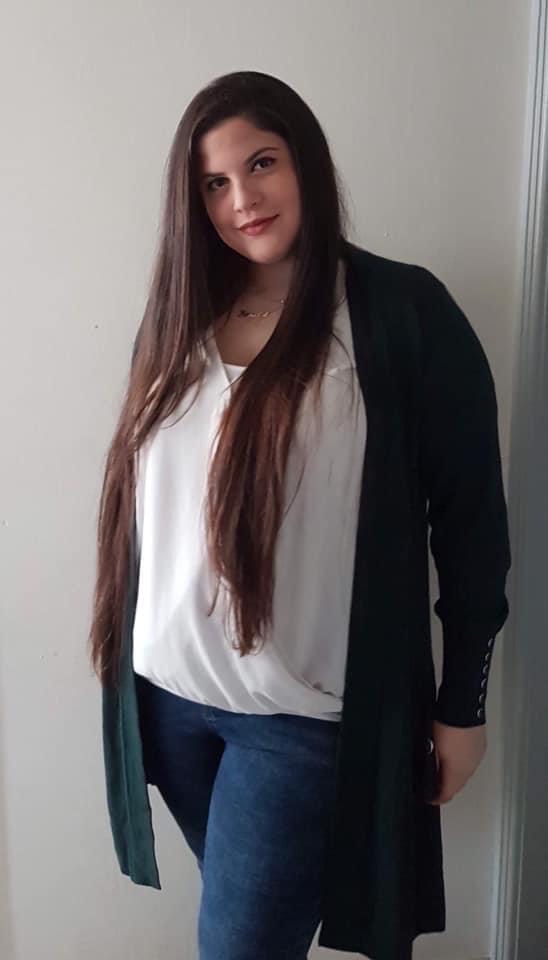
Background of CBS Research/Clinical/Volunteering efforts/achievements:
I am a member of the ACThealthy: Clinical Psychology and Behavioral Medicine laboratory, supervised by Dr Maria Karekla since 2016. Thanks to my supervisor, I have been involved with various projects at ACThealthy laboratory, particularly in the ALGEA project for chronic pain and a smoking cessation project. I also provided individual interventions for a project on internal cues and drug dependency based on ACT. I have participated in the ACBS conferences since 2018 by presenting posters, panels, and symposia and several of these papers have been published. Thanks to the Association of Contextual Behavioral Science, I have been awarded the 2020 - 2021 ACBS Research Development Grant, which enabled me to conduct my PhD research project, an Intervention for female breast CANcer: Acceptance and Commitment Therapy (I-CAN-ACT) for depression and physical pain. I am currently in the process of data analysis and write-up of my thesis.
Through my clinical placements, I have been trained in the use of ACT and other behavioral therapies (DBT) and use the CBS principles when providing psychological support to people with cancer and their families as well as individuals with disabilities, which are the populations I mostly work with.
Regarding volunteering, I was selected as the Student Representative of the ABCS Board in 2021-2022. Also, I served as the student representative of the Greece and Cyprus chapter and now as a member of the chapter. Additionally, I was a member of the organizing committee for the ACBS conference in July 2023 in Nicosia.
Autobiography:
I am a doctoral student in Clinical Psychology at the University of Cyprus and a Registered Clinical Psychologist working in palliative care at the Cyprus Association of Cancer Patients and Friends providing psychological support to people with cancer and their families. I obtained a First-Class Honours BSc Degree in Psychology from the University of Southampton in 2012. Subsequently, I completed a three-year MSc degree in Clinical Psychology at the University of Nicosia in Cyprus, with a GPA of 4/4. My MSc thesis was on risk and resilience factors for post-traumatic stress disorder symptoms in Cypriot police officers. I worked as a trainee clinical psychologist at the Centre for Therapy, Training and Research of the University of Nicosia (K.E.S.Y), at PASYKAF, the Hostel and Day Center “St. Catherine”, at Somateio Skapaneas (for people with disabilities), at the Adult Day Care Centre for Disabled from Communities District Morphou (for people with disabilities) and at the Psychiatric Hospital of Athalassa in Cyprus. I also provided individual psychotherapy to adults and parental counseling at the Counselling Center of the Municipality of Aglantzia, the Breast Center of Cyprus, as well as psychometric assessments to students at the Mental Health Center of the University of Cyprus.
As a researcher, I am particularly interested in the effectiveness of psychotherapeutic interventions in women with breast cancer. Thus, my thesis focused on the development of a brief Acceptance and Commitment Therapy-based intervention for improving the quality of life of women with breast cancer who experience depressive symptoms or sadness and physical pain.
Future goals:
I hope that my thesis, the I-CAN-ACT project, will improve the psychological treatment currently offered for women with breast cancer by targeting the processes that are more related with improved treatment effects and that it will help in developing prevention programs to facilitate better physical pain management and diminish the likelihood of developing psychopathology in this cancer population. My goal is to contribute at least to some extent in alleviating people’s suffering and aiding them in achieving a valued-driven meaningful life.
Publications:
▪ Zacharia, M., & Karekla, M. (2022). The Role of Psychologists and Psychological Approaches in Cancer Care. In A. Kassianos (Ed.), Handbook of Quality of Life in Cancer (pp. 311-337). Springer Nature Switzerland AG, Cham.
▪ Zacharia, M., & Karekla, M. (2021). The Acceptance and Commitment Therapy Perspective: Case Conceptualization and Treatment of Depression in Cancer. In C. Charis & G. Panayiotou (Eds.), Depression conceptualization and treatment (pp. 123-147). Cham, Switzerland: Springer Nature Switzerland AG. https://doi.org/10.1007/978-3-030-68932-2_9
▪ Zacharia, M., Ioannou, M., Theofanous, A., Vasiliou, V. S., & Karekla, M. (2021). Does Cognitive Fusion show up similarly across two behavioral health samples? Psychometric properties and invariance of the Greek–Cognitive Fusion Questionnaire (G-CFQ). Journal of Contextual Behavioral Science, 21, 212-221.
▪ Gloster, A. T., Zacharia, M., & Karekla, M. (2020). Psychological aid for frontline healthcare workers. Clinical Neuropsychiatry, 17(4), 253-254.
▪ Theofanous, A., Ioannou, M., Zacharia, M., Georgiou, S. N., & Karekla, M. (2020). Gender, Age, and Time Invariance of the Child and Adolescent Mindfulness Measure (CAMM) and Psychometric Properties in Three Greek-Speaking Youth Samples. Mindfulness, 1- 10. https://doi.org/10.1007/s12671-020-01350-5
▪ Karekla, M., Zacharia, M., & Koushiou, M. (2018). Accept Pain for a Vital Life: Acceptance and Commitment Therapy for the Treatment of Chronic Pain. In C. Charis & G. Panayiotou (Eds.), Somatoform and Other Psychosomatic Disorders (pp. 163-191). Cham, Switzerland: Springer Nature Switzerland AG.
Student Spotlight Award Recipient - Niloofar Tavakoli
Student Spotlight Award Recipient - Niloofar TavakoliCongratulations to Niloofar Tavakoli on being selected as the Student Spotlight Award winner for July 2021!
The purpose of this award is to highlight students who are doing important work in the CBS community whether for research, clinical, and/or volunteer-humanitarian efforts.
This is a way to highlight their achievements, let the ACBS community know important work students are doing, and possibly provide a platform for mentoring, collaboration, professional development, and conversations around highlighted areas.
Learn more about Niloofar Tavakoli: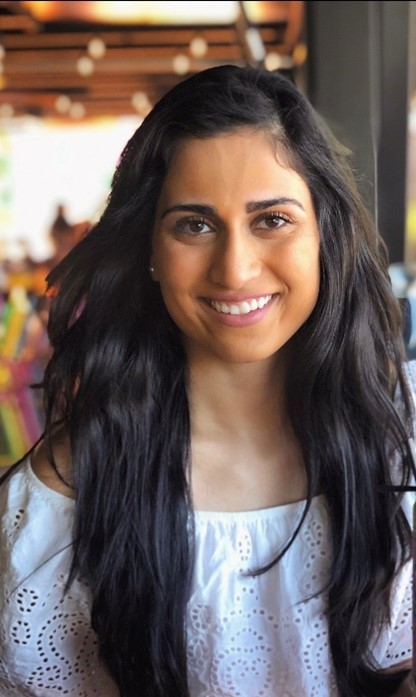
Background of CBS Research/Clinical/Volunteering efforts/achievements:
I have engaged in CBS related research and clinical work by providing ACT-based interventions in a VA setting, academic-medical institution, and research-based interventions. I am currently completing my practicum training at the Houston VA working in the General Mental Health Clinic and Pain Evaluation Center providing ACT-based interventions to Veterans who experience behavioral health concerns. As a research interventionist, I am providing an ACT-based smoking cessation intervention for Latinx individuals who also experience depression and/or anxiety. In this regard, I also assisted with the development of the participant as well as the counselor manuals. Previously, I have worked at an academic-medical setting providing ACT for substance use disorders for ethnic minority individuals. In this setting, I also provided group-based ACT intervention for individuals at risk for HIV. Scholastically, I have led or co-authored two manuscripts and four presentations relevant to CBS. Topics included psychological inflexibility in regard to anxiety-related experiences and psychometric work on the utility of the AAQ-II in an ethnically diverse sample.
Autobiography:
I am a second-year doctoral student in the Health Psychology track of the Counseling Psychology program at the University of Houston (UH). Born in Iran and raised in Houston, I completed both my B.S. in Psychology and M.Ed. in Counseling at UH. I currently hold a license to independently practice as a Licensed Professional Counselor (LPC) in the state of Texas. My research interests include anxiety, smoking/substance abuse, and psychological flexibility/inflexibility among ethnic minority individuals; with a special interest in creating culturally tailored psychological and health-related interventions. I am currently a graduate scholar in a partnership between UH and M.D Anderson Cancer Center to reduce cancer-related disparities among ethnic minorities, in which I am a research assistant and interventionist on an ACT-based smoking program for Latinx who experience anxiety/depression. I am completing my practicum training at the Michael E DeBakey Veteran Affairs Medical Center. This fall, I trained in the Pain Evaluation Center and provided CBT and ACT for chronic pain. Currently, I am in the General Mental Health Clinic providing CBT and Interpersonal Therapy for depression, in addition to co-facilitating two groups. In regard to service, I serve as APA Division 17- Counseling Psychology student representative at UH. In pursuit of my goals to become a more informed and prepared clinician and researcher, I have received formal training as a Tobacco Treatment Specialist as well as an Acceptance and Commitment Therapist. In my spare time, I enjoy working out, spending time with family/friends, playing with my puppy, and traveling.
Future goals:
My goal is to become a well-rounded clinician and researcher in the area of contextual behavioral science, focusing on the role of psychological flexibility/inflexibility on behavioral health related concerns among ethnic minorities.
Relevant publications:
Tavakoli, N., Broyles, A., Reid, E. K., Sandoval, J. R., & Correa-Fernández, V. (2019). Psychological inflexibility as it relates to stress, worry, generalized anxiety, and somatization in an ethnically diverse sample of college students. Journal of Contextual Behavioral Science, 11, 1-5. ISSN 2212-1447. https://www.sciencedirect.com/science/article/abs/pii/S2212144718301698
Correa-Fernández, V., McNeel, M. M., Sandoval, J. R., Tavakoli, N., Kahambwe, J. K., & Kim, H. (2020). Acceptance and Action Questionnaire II: Measurement invariance and associations with distress tolerance among an ethnically diverse university sample. Journal of Contextual Behavioral Science, 17, 1-9. ISSN 2212-1447. https://www.sciencedirect.com/science/article/abs/pii/S2212144719302911
Langdon, K. J., Bakhshaie, J., Lopez, A., Tavakoli, N., Garey, L., Raines, A.M., Kauffman, B. Y., Schmidt, N. B., & Zvolensky, M. J. (2018). Anxiety Sensitivity Physical and Cognitive Concerns in Relation to Smoking-Oriented Cognition: An Examination among Treatment-Seeking Adults Who Smoke. Journal of Addiction Medicine, 12(3), 212–219. https://www.ncbi.nlm.nih.gov/pmc/articles/PMC5970020/
Correa-Fernández, V., Tavakoli, N., Motsenbocker, M., & Kim, H. (2021). Hispanics/Latinos' Cigarette and E-cigarette Use: Behavioral and Self-rated Health. American Journal of Health Behavior, 45(1), 95-110. https://www.ingentaconnect.com/contentone/png/ajhb/2021/00000045/00000001/art00008
Student Spotlight Award Recipient - Raul Vaz Manzione
Student Spotlight Award Recipient - Raul Vaz ManzioneCongratulations to Raul Vaz Manzione on being selected as the Student Spotlight Award winner for September 2018!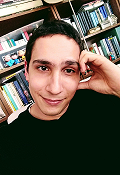
The purpose of this award is to highlight students who are doing important work in the CBS community whether for research, clinical, and/or volunteer-humanitarian efforts.
This is a way to highlight their achievements, let the ACBS community know important work students are doing, and possibly provide a platform for mentoring/collaboration/professional development/conversations around highlighted areas.
Learn more about Raul:
Background of CBS Research/Clinical/Volunteering efforts/achievements:
I started researching in CBS last year (2017) at the RFT Lab at Centro Paradigma, where I received a scholarship for my specialization course to work as an RFT-researcher, and I've worked with Roberta Kovac, my clinical supervisor and fellow researcher, in her Doctoral thesis which is called "Measuring effects of ACT interventions on the transformation of function in arbitrarily related stimuli". I've also translated Steven C. Hayes 1984 paper - Making Sense of Spirituality (the translation is in press) which is part of my ongoing effort to bring important CBS material to non-English speakers that are interested in CBS here in Brazil. I've translated Matthieu Villatte powerpoint presentation to Brazilian Portuguese on a workshop he ministered in São Paulo. As for my own basic CBS research project this year I am running a research, which is part of my specialization thesis, on examining the reinforcing properties of Relational Coherence under the framework of the MDML and DAARRE models. I’m an ACT Therapist working at private practice and I write to a behavior analysis blog called Portal Comporte-se: Psicologia Científica, where I make blog posts about ACT and RFT to the website’s ACT column. I’ve attended to my first ACBS World Conference in Sevilla, 2017, and been to ACT and CBS-related trainings, both in Brazil and International, with names such as Steve Hayes, Kelly Wilson, Kirk Strosahl, Matthieu Villatte, Robert Kohlenberg, Mavis Tsai and others. Currently I'm working as the Student Representative at the ACBS Brazil Chapter.
Autobiography:
My name is Raul Manzione and I'm a CBS student/researcher/practitioner coming from a strong (and somewhat conservative) behavior analytic/Skinnerian background. I first got in touch with behavior analysis and Radical Behaviorism back in 2011 and with CBS back in 2015, where I've first heard about ACT from my supervisor at the time, Cássia Thomaz. Ever since I've heard of it I started my [never-ending] journey into the universe of CBS and focusing on ACT and RFT. I've also helped organizing behavior analytic/CBS events here in Brazil. I was able to meet very important CBS-practitioners here in Brazil which helped me a lot (and still do) to my formation. I attended to my first ACBSWorldcon in Sevilla, Spain, and been to ACT/RFT trainings both there and here in Brazil. I try to be very active in the Brazilian CBS community with the goal of "spreading the word" to Brazilian Psychologists and Health Professionals. I am an ACT Therapist working at private practice and an RFT-researcher at Centro Paradigma de Ciências do Comportamento.
Future goals:
For my future goals: For next year (2019) I plan to keep studying and researching on the Relational Coherence topic; I also plan to apply to do my Masters and PhD on it and next year I plan to apply to the Peer-Reviewed ACT Trainer program so I can run ACT Trainings here in Brazil and the last, but not least, future goal of mine is to write an ACT book (or help to write one).
Relevant publications:
https://www.comportese.com/2017/12/o-valor-da-dor
Student Spotlight Award Recipient - Samuel Spencer
Student Spotlight Award Recipient - Samuel SpencerThe purpose of this award is to highlight students who are doing important work in the CBS community whether for research, clinical, and/or volunteer-humanitarian efforts.
This is a way to highlight their achievements, let the ACBS community know important work students are doing, and possibly provide a platform for mentoring, collaboration, professional development, and conversations around highlighted areas.
Congratulations to Samuel Spencer on being selected as the Student Spotlight Award winner for September 2022!
Learn more about Samuel Spencer: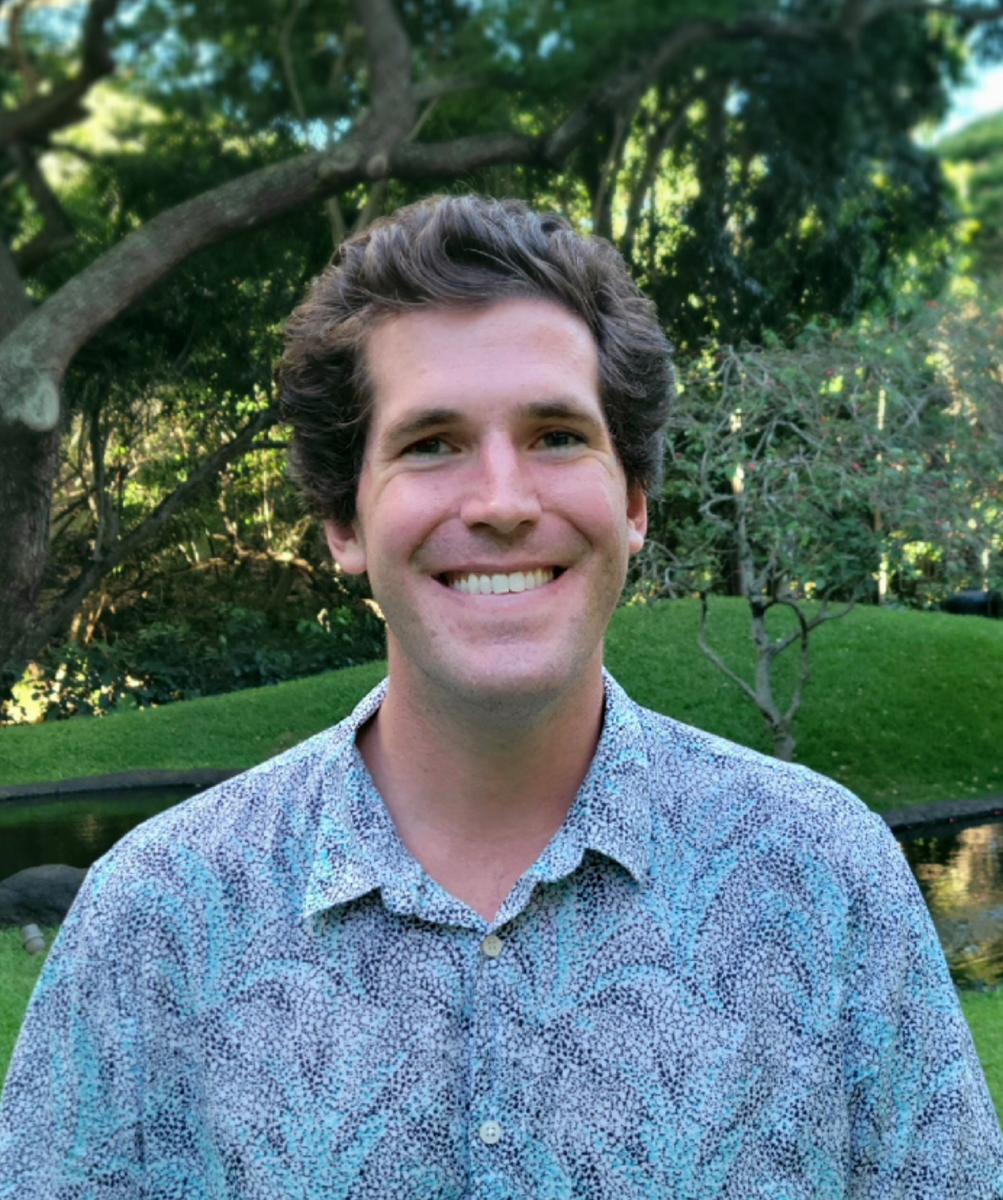
Background of CBS Research/Clinical/Volunteering efforts/achievements:
I can fondly recall pivotal moments in my early graduate school years of reading behavior analysis literature and learning about the interesting historical juxtaposition of ‘acceptance vs. change’ within the ‘third wave’ movement. These early experiences ignited in me a profound interest in understanding the mechanisms of both psychopathology and well-being. During graduate school, I have had many opportunities to pursue these interests from a contextual behavioral science (CBS) framework, with a particular focus on acceptance and commitment therapy (ACT). My current research, working under the mentorship of Dr. Akihiko Masuda at the University of Hawaii, focuses mainly on investigating ACT within a process-based therapy framework, applied to transdiagnostic mental and behavioral health concerns centered around the generalized processes of engaged living and experiential avoidance. We are quite fortunate to have this research supported by an ACBS Research Development Grant (2021). I also conduct quantitative- and psychometric-based research on the relationships among CBS-related constructs and psychological health and vulnerability factors, and how these constructs can be most optimally assessed, especially within culturally diverse contexts. Lastly, I have enjoyed pursuing research and clinical work focused on furthering our understanding and practice of cultural competence, humility, and culturally sensitive adaptations to contextual CBTs- a pressing concern within our multiculturally diverse world. In addition to research, I have also enjoyed serving as a founding member on the board of directors of our newly formed local Hawaii ACBS chapter (est. 2019), as well as regularly organizing panel discussions and symposia at ACBS World Conferences.
Autobiography:
Born and raised in Minnesota, I received a B.S. in psychology and an M.A. in clinical psychology from Minnesota State University, Mankato. I have since traded in my winter parka for beach gear, and currently reside in Honolulu, Hawaii where I am a clinical psychology Ph.D. candidate at the University of Hawai'i at Mānoa working under the mentorship of Dr. Akihiko Masuda. I will be completing my pre-doctoral internship during the 2022-2023 training year at Baylor College of Medicine OCD and Related Disorders Track in Houston, Texas. My research interests broadly include acceptance and commitment therapy (ACT), psychotherapy process and outcome research, measurement of contextual behavioral science (CBS)-related constructs, and historical and philosophical traditions of CBT and CBS. My dissertation research focuses on examining the mechanisms of change within process-based ACT for transdiagnostic mental and behavioral health concerns and working to improve assessment and measurement of key process and outcome variables. In my clinical work, I utilize an empirically supported process-based CBT framework and empathic therapeutic connection, along with a focus on cultural humility and competency, to assist individuals in overcoming suffering and pursuing values-based living. While I appreciate the broad utility of a transdiagnostic, process based therapeutic approach, much of my clinical training experiences to date have focused on exposure techniques for anxiety disorders, as well as values-based behavioral activation for depression, along with a focus on multiculturalism. I am also actively involved in ACBS at local and international levels, regularly teach undergraduate psychology classes, and enjoy mentoring students.
Future goals:
My future goals involve pursuing an academic career that involves pursuing research that aids our understanding and alleviation of psychological struggles and training the next generation of researchers and behavioral health providers to further those ends.
Relevant publications:
Jo, D., Spencer, S. D., & Masuda, A. (2022). Mindfulness as a moderator of the relationship between engaged living and depression in emerging adulthood. Mindfulness, 13(2), 742 – 750. https://doi.org/10.1007/s12671-022-01831-9
Spencer, S. D., Pokhrel, P., Helm, S., Wilczek, K., Galimov, A., & Sussman, S. (2021). Emerging adulthood attributes and substance use in a sample of Asian and Native Hawaiian and Other Pacific Islander college students. Asian American Journal of Psychology. https://doi.org/10.1037/aap0000254
Hashimoto, K., Muto, T., Spencer, S. D., & Masuda, A. (2020). Mitigating behavioral assimilation to age stereotypes: A preliminary analogue investigation of a contextual behavioral science approach. Journal of Contextual Behavioral Science, 18, 48 – 52. https://doi.org/10.1016/j.jcbs.2020.08.006
Martin, T. J., Spencer, S. D., & Masuda, A. (2020). Mindfulness mediates the relationship between mental health self-stigma and psychological distress: A cross-sectional study. Current Psychology. DOI:10.1007/s12144-020-01050-2
Jo, D., Spencer, S. D., & Masuda, A. (2020). Mindfulness attenuates the positive association between disordered eating cognition and disordered eating behavior in a sample of college women. Current Psychology. DOI:10.1007/s12144-020-00969-w
Masuda, A., Barile, J., Spencer, S. D., Juberg, M., Martin, T. J., & Vibell, J. F. (2020). Mindful awareness moderates the association between psychological inflexibility and distress variables: A cross-sectional investigation. Journal of American College Health, 70(2), 607 – 614. DOI: 10.1080/07448481.2020.1759607
Hill, M. L., Schaefer, L. W., Spencer, S. D., & Masuda, A. (2020). Compassion-focused acceptance and commitment therapy for women with restrictive eating and problematic body-checking: A multiple baseline across participants study. Journal of Contextual Behavioral Science, 16, 144 – 152. https://doi.org/10.1016/j.jcbs.2020.04.006
Spencer, S. D., & Masuda, A. (2020). Acceptance and commitment therapy as a transdiagnostic approach to treatment of behavioral health concerns: A concurrent multiple baseline design across participants. Clinical Case Studies, 19(3), 163 – 179. DOI: 10.1177/1534650119897412
Spencer, S. D., Buchanan, J. A., & Masuda, A. (2019). Preliminary findings from a comparison of brief acceptance- and control-based interventions for reducing experiential avoidance in socially-anxious individuals. Behavior Modification, 44(6), 841 – 864. https://doi.org/10.1177/0145445519854321
Juberg, M., Spencer, S. D., Martin, T. J., Vibell, J. F., de Costa Ferro, A., Kam, B. R., & Masuda, A. (2019). A mindfulness-based intervention for college students, faculty, and staff: A preliminary investigation. Clinical Case Studies, 18(3), 185 – 199. DOI:10.1177/1534650119836166
Haynes, S. N., Spencer, S. D., Laba, T. M. (in press). Principles and practices of behavioral assessment. In M. Bagby & G. Asmundson (Eds.) Comprehensive clinical psychology, 2nd Ed. Elsevier.
Masuda, A., Morgan, L., Spencer, S.D., Oina’au, J., & Jo, D. (in press). Cultural adaptations of acceptance and commitment therapy. In Twohig, M.P., Levin, M.E., & Petersen, J.M. (Eds.), The Oxford Handbook of Acceptance and Commitment Therapy. Oxford University Press.
Masuda, A., & Spencer, S. D. (in press). Advantages of third wave behavior therapies. In W. T. O’Donohue & A. Masuda (Eds.) Behavior therapy: First, second, and third waves.
Student Spotlight Award Recipient - Sebastian Garcia-Zambrano
Student Spotlight Award Recipient - Sebastian Garcia-ZambranoCongratulations to Sebastian Garcia-Zambrano on being selected as the Student Spotlight Award winner for February 2021!
The purpose of this award is to highlight students who are doing important work in the CBS community whether for research, clinical, and/or volunteer-humanitarian efforts.
This is a way to highlight their achievements, let the ACBS community know important work students are doing, and possibly provide a platform for mentoring, collaboration, professional development, and conversations around highlighted areas.
Learn more about Sebastian Garcia-Zambrano:
Background of CBS Research/Clinical/Volunteering efforts/achievements:.jpg)
As part of his studies in the United States, Sebastian joined the SIU Center for Autism and Spectrum Disorders (CASD), where he was part of a team focused on verbal behavior, social skills, and Acceptance and Commitment Training for children and adolescents diagnosed with ASD.
He considered that the most significant achievement is to improve the quality of life of individuals with disabilities through the use of Acceptance and Commitment Training. His thesis was focused on the evaluation of the effects of deictic framing and defusion on the rate of verbalizations associated with self-as-context in individuals with disabilities. Results were presented at the 2018 ACBS conference and published in the JCBS in 2019. Moreover, he conducted a study with Dr. Mark Dixon, Dr. Becky Barron, and Dr. Natalia Baires to evaluate the effects of ACT-based exercises before the session on staff rigidity and positive interactions among therapists for children with ASD. Results of this study were presented at the 2019 ABAI conference.
In addition, he conducted a study under the supervision of Dr. Shane Koch to evaluate the feasibility of an RFT-based codification of relational frames. Results are under review in the JCBS. As an extension of this study, he is working on the development of a computer-based program to code spatial, temporal, and conditional frames.
Also, he helped Dr. Natalia Baires in the design and reliability measurement of a cultural adaptation of ACT for Hispanic/Latinx caregivers of children with autism. This study was a partial fulfillment of the requirements for the degree of Doctor of Philosophy for Dr. Natalia Baires and it was presented in the 2020 Virtual Congress of the Iberoamerican Society of Psychology.
Currently, he is developing a protocol to extend previous studies on perspective-taking under the supervision of Dr. Shane Koch. He wants to connect the latest findings on Contextual Behavioral Science with the current status of cognitive research on "Theory of Mind". Also, he is working on the development of an RFT-based protocol to evaluate deictic frames involved in visual, emotional, and cognitive perspective-taking skills.
Autobiography:
Sebastian Garcia-Zambrano is a Colombian doctoral candidate at the School of Psychological and Behavioral Sciences, Southern Illinois University Carbondale. He is part of the lab of Dr. Shane Koch, and his research interests are verbal behavior, self-awareness, and Relational Frame Theory. He studied his masters at Southern Illinois University under the supervision of Dr. Ruth Anne Rehfeldt and his bachelor's at Konrad Lorenz Fundación Universitaria in Bogotá, Colombia.
Sebastian has been working for more than ten years with individuals with disabilities and is currently working at a residential facility. He started his professional life by providing behavioral services to children and adolescents diagnosed with autism at an agency called Horizontes ABA in Bogotá, Colombia. Then, Sebastian moved to the United States to study under the supervision of Dr. Rehfeldt. He joined the SIU Center for Autism and Spectrum Disorders (CASD), where he was part of a team focused on verbal behavior, social skills, and Acceptance and Commitment Training for children and adolescents.
Currently, he is developing a protocol to extend previous studies on perspective-taking under the supervision of Dr. Shane Koch. He wants to connect the latest findings on Contextual Behavioral Science with the current status of cognitive research on "Theory of Mind". Currently, he is working on the development of an RFT-based protocol to evaluate deictic frames involved in visual, emotional, and cognitive perspective-taking skills.
Future goals:
My goal is to extend previous studies on perspective-taking and connect the field with traditional perspectives on perspective-taking. I am also working on a project to develop a computer-based program to identify relational frames from transcripts and discourses.
Relevant publications:
https://www.researchgate.net/profile/Sebastian_Garcia-Zambrano
Book Chapters
Garcia, Y., Rosales, R., & Garcia-Zambrano, S., Rehfeldt, R.A. Basic Verbal Behavior (2020). In M. J. Fryling, R.A. Rehfeldt, J. Tarbox, & L. Hayes (Eds.), Applied behavior analysis of language and cognition: Core concepts and principles for practitioners. Oakland, CA: New Harbinger.
Peer-Reviewed Publications
García- Zambrano, S., Rehfeldt, R. A., Hertel, I. P., Boehmert, R. (2019). Effects of deictic framing and defusion on the development of self-as-context in individuals with disabilities. Journal of Contextual Behavioral Science, 12, 55-58. https://www.sciencedirect.com/science/article/pii/S2212144718302047
García, Y. A., Cristiano, L., & García, S. (2013). Development of language in children: A behavior analysis perspective. Horizontes Pedagógicos, 15(1), 8.
Works under Review
Tilden, V., Barron, B., Dixon, M.R., & García-Zambrano, S. (under review). Effects of mindfulness and ACT-based exercises on positive interactions among therapists for children with Autism Spectrum Disorder. Journal in Contextual Behavioral Science.
García-Zambrano, S., Baires, N. A., Catrone, R. G, Goyal, M. K., Hinman, J. M., Babbra, A. S., & Koch, D. S. (under review). A Preliminary Analysis on the Reliability of Coding Political Discourses According to Relational Frames. Journal in Contextual Behavioral Science.
Baires, N., García-Zambrano, S., & Koch, D. S. (under review). Missing Identities: Who is Participating in Teaching Behavior Analysis within Higher Education? Behavior Analysis in Practice.
Britwum, K., García-Zambrano, S., Baires, N. A., Koch, D. S. (under review). Policing and Values: A Behavioral Conceptualization of the Values that Influence actions of Police. Behavior Analysis in Practice.
Student Spotlight Award Recipient - Sérgio Andrade Carvalho
Student Spotlight Award Recipient - Sérgio Andrade CarvalhoCongratulations to Sérgio Andrade Carvalho on being selected as the Student Spotlight Award winner for April 2019!
The purpose of this award is to highlight students who are doing important work in the CBS community whether for research, clinical, and/or volunteer-humanitarian efforts.
This is a way to highlight their achievements, let the ACBS community know important work students are doing, and possibly provide a platform for mentoring/collaboration/professional development/conversations around highlighted areas.
Learn more about Sérgio:
Background of CBS Research/Clinical/Volunteering efforts/achievements:
I have started studying CBS in 2010, as a Masters student at University of Coimbra, Portugal. My master thesis was supervised by José Pinto-Gouveia, and we explored the relationship between socialization of emotions, emotional schemas, cognitive fusion and psychopathological symptoms in the general population. After completing my Masters and with a newly discovered interest in ACT, I went to Edinburgh for 5-month and learnt with David Gillanders more about CBS research and ACT with chronic pain patients. I have been conducting research on the efficacy of CBS-based interventions in different health conditions (psychosis, binge eating in obesity, chronic pain), and on the relationship between psychological processes and health outcomes. I am a research member of projects that are testing ICT-delivered contextual-behavioral interventions (for binge eating and chronic pain), including an Horizon2020 European consortium (NoHoW) that is developing and testing the efficacy of an ICT-delivered multi-center intervention for weight-loss maintenance. I have been particularly interested in self-compassion, and I am a member of an international project that explores cross-cultural differences in the meaning and experience of compassion. I am currently on the 3rd year of my PhD, which has two main goals: 1) to test the adding value of two self-compassion sessions in a 6-session ACT group intervention for women with chronic pain (COMP.ACT), and 2) to better understand the relationship between self-compassion and ACT core processes, through both cross-sectional and three-wave 1-year longitudinal designs. Several papers on this have been published or are currently under review.
Autobiography:
I was born on an island (São Miguel) of a beautiful Portuguese archipelago (Azores). In 2006, I went to Coimbra, a city at the heart of Portugal mainland, to study Psychology, which was a transformative experience, both at an academic and personal level. I´m a 3rd year PhD student in Clinical Psychology, and I am currently developing my research on self-compassion and ACT in chronic pain. I have found CBS to be a useful tool that has enriched my interpersonal relationships, and shifted my understanding of what being human is all about. Since my graduation in 2011, I have been conducting research on CBS, and have recently embraced the challenge of being a partner of a private practice organization (https://gabinetepsicologiacoimbra.com) that provides different educational and clinical services, including transfer knowledge on mental health literacy to the general population. In addition to my PhD studies, I am also part of several projects, including on CBS and Gender and Sexual Minorities, which interests me both as a researcher and as an activist. In addition to studying clinical psychology, the recent global political events have made me very interested in the interface between CBS and politics, particularly on the evolutionary basis for group-thinking, and both the potential and limitations of interpersonal-level social change. I am an avid consumer of music (from Progressive Metal to Soul and Spirituals), a lover of books (from poetry to science communication), and a proud uncle of two smart, beautiful and overly-active 6-year old kids.
Future goals:
In addition to continuing doing research on clinical psychology, after completing my PhD, I am very much interested in exploring CBS as a science-based route for social change, especially the use of evidence-based knowledge as tools for social justice, and more specifically to develop research that integrates social psychology topics (e.g. social representation) and CBS as useful lenses to understand the role of identity and discrimination, and promoting social acceptance of diversity.
Relevant publications:
- https://estudogeral.sib.uc.pt/handle/10316/47269 [Petrocchi, N., Matos, M., Carvalho, S. & Baiocco, R. (2016). Compassion-Focused Therapy in the Treatment of Shame-Based Difficulties in Gender and Sexual Minorities. In Skinta, M.D. & Curtin, A. (2016), Mindfulness and Acceptance for Gender and Sexual Minorities. Oakland, CA: Context Press. 1st Edition, pp. 69-86.]
- https://www.sciencedirect.com/science/article/pii/S2212144718301509 [Carvalho, S.A., Palmeira, L., Gillanders, D., Pinto-Gouveia, J., & Castilho, P. (2018). The utility of the valuing questionnaire in chronic pain. Journal of Contextual Behavioral Science, 9, 21-29. doi: 10.1016/j.jcbs.2018.06.002]
- https://www.tandfonline.com/doi/full/10.1080/00223980.2018.1507990 [Carvalho, S.A., Pinto-Gouveia, J., Gillanders, D., & Castilho, P. (2018). Pain and depressive symptoms: exploring cognitive fusion and self-compassion in a moderated mediation model. The Journal of Psychology: Interdisciplinary and Applied. doi: 10.1080/00223980.2018.1507990]
- https://www.research.ed.ac.uk/portal/en/publications/an-implementation-trial-of-actbased-bibliotherapy-for-irritable-bowel-syndrome(ae011e00-1616-454e-afdb-87548294c3cd).html [Gillanders, D., Ferreira, N. B., Angioni, E., Carvalho, S. A., & Eugenicos, M. P. (2017). An Implementation Trial of ACT-Based Bibliotherapy for Irritable Bowel Syndrome. Journal of Contextual Behavioral Science, 6(2), 172-177. doi: 10.1016/j.jcbs.2017.04.006].
- http://self-compassion.org/wp-content/uploads/2017/01/Pinto-Gouveia2016.pdf [Pinto-Gouveia, J., Carvalho, S., Palmeira, L., Castilho, P., Duarte, C., Ferreira, C., Duarte, J., Cunha, M., Matos, M. & Costa, J. (2016). Incorporating psychoeducation, mindfulness and self-compassion in a new program for binge eating (BEfree): exploring processes of change. Journal of Health Psychology. Epub ahead of print. doi: 10.1177/1359105316676628].
- https://core.ac.uk/download/pdf/94982315.pdf [Lapa, T. A., Carvalho, S., Viana, J. S., Ferreira, P. L., & Pinto-Gouveia, J. (2016). Stressors in anaesthesiology: development and validation of a new questionnaire: A cross-sectional study of Portuguese anaesthesiologists. European Journal of Anaesthesiology (EJA), 33(11), 807-815. doi: 10.1097/EJA.0000000000000518].
- https://estudogeral.sib.uc.pt/handle/10316/47036?locale=pt_PT [Baião, R., Gilbert, P., McEwan, K., & Carvalho, S. (2015). Forms of self‐criticising/attacking & self‐reassuring scale: Psychometric properties and normative study. Psychology and Psychotherapy: Theory, Research and Practice, 88(4), 438-452. doi: 10.1111/papt.12049].
Student Spotlight Award Recipient - Tao Zhang
Student Spotlight Award Recipient - Tao Zhang
Congratulations to Tao Zhang on being selected as the Student Spotlight Award winner for April 2026!
The purpose of this award is to highlight students who are doing important work in the CBS community whether for research, clinical, and/or volunteer-humanitarian efforts.
This is a way to highlight their achievements, let the ACBS community know important work students are doing, and possibly provide a platform for mentoring/collaboration/professional development/conversations around highlighted areas.
Learn more about Tao Zhang:
Background of CBS Research/Clinical/Volunteering efforts/achievements:
I have been engaged in Acceptance and Commitment Therapy (ACT)-related clinical and research work for four years. I was first introduced to ACT during my M.Phil. and was drawn to its values-oriented and non-judgmental approach to supporting people in distress. Since then, I have actively pursued ACT learning and practice, completing multiple international and local trainings. During my M.Phil., I developed and evaluated a digital psychological intervention for cancer patients in China. I later contributed to ACT-based digital projects, including a program for trauma survivors and a just-in-time intervention for college students. These experiences strengthened my commitment to integrating CBS with digital technology to expand access to mental health care.
I am currently a second-year Ph.D. student at The Hong Kong Polytechnic University, where my research focuses on digital ACT interventions for suicide prevention. I led a systematic review and meta-analysis examining ACT for suicidal thoughts and behaviors, which showed significant reductions in suicide-related outcomes. This work was published in Psychotherapy and Psychosomatics. In the next phase of my doctoral research, I will develop a culturally adapted digital ACT intervention for suicide prevention in China and evaluate its effectiveness and mechanisms through a randomized controlled trial.
I have presented my ACT-related work at international conferences, and related findings have been published in multiple peer-reviewed journals. Moving forward, I am committed to advancing culturally adapted digital ACT interventions in low- and middle-income countries and Eastern cultural contexts to improve access to effective, evidence-based psychological support for individuals in resource-limited settings.
Autobiography
I grew up in a small northern Chinese city where mental health resources were limited. Before reaching adulthood, I had very few opportunities to learn about or receive psychological support simply because such services were not readily available in my community. Later, as a first-generation college student, moving to Shanghai for my undergraduate studies gave me my first direct experience of how access to mental health resources can vary widely across regions. This realization inspired my commitment to improving mental health accessibility and guided me toward becoming a helping professional.
During my undergraduate years, I took my first counseling course and was deeply moved by the meaningful changes psychological support can create. While pursuing my M.Phil. in Clinical Psychology, I encountered Acceptance and Commitment Therapy. I was drawn to how ACT helps people connect with meaning and live a full, values-driven life even in the presence of pain. This experience sparked my long-term dedication to ACT and CBS, eventually motivating me to pursue a Ph.D. at Hong Kong Polytechnic University to explore their potential in alleviating distress and promoting well-being.
Outside my academic and clinical work, I enjoy table tennis, running, and hiking. As a former national second-level table tennis athlete in China, I learned to approach challenges with curiosity, persistence, and vitality—qualities that continue to shape both my research journey and personal life. Moving forward, I hope to live with openness and compassion and support others in doing the same.
Future goals:
I hope to continue my work in ACT-based suicide prevention while contributing to the cultural adaptation of CBS in Eastern cultural contexts and low- and middle-income countries, and to further develop and facilitate accessible, evidence-based digital interventions for communities with limited mental health support.
Links to relevant publications:
1. Zhang, T., Hui, B. P. H., Ducasse, D., Li, Y., Wang, Y., Hu, J., Tang, W. T. C., & Ke, Y. (2025). Efficacy of Acceptance and Commitment Therapy for Suicide and Self-harm: A Systematic Review and Meta-analysis. Psychotherapy and Psychosomatics, 1–28. https://doi.org/10.1159/000548398
2. Zhang, T., Feng, W., Sun, Y., Li, Y., Hu, J., Du, X., Lai, L., Ke, Y., Hui, B. P. H., & Ren, Z. (2025). Feasibility, acceptability, and effectiveness of an asynchronous, internet-delivered acceptance and commitment therapy for people living with cancer: A pilot randomized controlled trial using mixed methods. Computers in Human Behavior Reports, 100859. https://doi.org/10.1016/j.chbr.2025.100859
3. Zhang, T., Ren, Z., Wakefield, C. E., Hui, B. P. H., Akechi, T., Shi, C., Du, X., Chen, W., Lai, L., Zhao, C., Li, Y., & Zhou, Y. (2025). Are digital psychological interventions for psychological distress and quality of life in cancer patients effective? A systematic review and network meta-analysis. Clinical Psychology Review, 115, 102520. https://doi.org/10.1016/j.cpr.2024.102520
4. Zhang, T., Wakefield, C. E., Ren, Z., Chen, W., Du, X., Shi, C., Lai, L., Zhao, C., Gao, Y., Chen, Z., Zhou, Y., Wu, T., & Cai, M. (2023). Effects of digital psychological interventions on physical symptoms in cancer patients: A systematic review and meta-analysis. General Hospital Psychiatry, 84, 47–59. https://doi.org/10.1016/j.genhosppsych.2023.05.016
5. Hui, B. P. H., Zhang, T., Ho, J. C. F., Cheng, S. K. L., Li, C., Wong, R., & Chen, S. X. (2025). Promoting prosocial behavior and well-being in adolescents through a gamified virtual reality intervention: A randomized controlled trial protocol. Internet Interventions, 100883. https://doi.org/10.1016/j.invent.2025.100883
6. Li, Y., Liu, Y., Liu, X., Zhang, T., Guo, Z., Lai, L., Zhao, J., Cheng, Y., & Ren, Z. (2025). Digital Psychological Interventions for Adults in the COVID-19 Pandemic: A Systematic Review and Meta-Analysis. Health Psychology Review, 1–17. https://doi.org/10.1080/17437199.2025.2493903
7. Li, Y., Liu, X., Guo, Z., Lai, L., Bryant, R. A., Zhang, T., Song, H., Mi, T., & Ren, Z. (2025). Comparative Efficacy and Attrition Rates of Psychosocial Interventions for Individuals Affected by the COVID‐19 Pandemic: A Network Meta‐Analysis. Stress and Health, 41(6), e70124. https://doi.org/10.1002/smi.70124
8. Shi, C., Zhang, T., Du, X., Lu, S., & Witthöft, M. (2024). Efficacy of internet-based psychological interventions for pathological health anxiety: A three-level meta-analysis of randomized controlled trials. General Hospital Psychiatry, 87, 77–82. https://doi.org/10.1016/j.genhosppsych.2024.02.001
9. Guo, Y., Liu, Y., Zhang, T., Ruan, J., Liu, S., & Ren, Z. (2024). Intrinsic disruption of white matter microarchitecture in major depressive disorder: A voxel-based meta analysis of diffusion tensor imaging. Journal of Affective Disorders, 363, 161–173. https://doi.org/10.1016/j.jad.2024.07.050
10. Du, X., Lai, L., Shi, C., Guo, Z., Han, J., Zhang, T., & Ren, Z. (2024). Internet-based cognitive bias modification of interpretation in health anxiety: A randomized controlled trial. Acta Psychologica Sinica, 56(10), 1351. https://doi.org/10.3724/SP.J.1041.2024.01351
11. Du, X., Witthöft, M., Zhang, T., Shi, C., & Ren, Z. (2023). Interpretation bias in health anxiety: A systematic review and meta-analysis. Psychological Medicine, 53(1), 34–45. https://doi.org/10.1017/S0033291722003427
12. Zhang, L., Zhang, T., Ren, Z., Jiang, G., Zhang, L., Zhang, T., Ren, Z., & Jiang, G. (2023). Predicting compassion fatigue among psychological hotline counselors using machine learning techniques. Current Psychology, 42(5), 4169–4180. https://doi.org/10.1007/s12144-021-01776-7
13. Shi, C., Taylor, S., Witthöft, M., Du, X., Zhang, T., Lu, S., & Ren, Z. (2022). Attentional bias toward health-threat in health anxiety: A systematic review and three-level meta-analysis. Psychological Medicine, 52(4), 604–613. https://doi.org/10.1017/S0033291721005432
14. Cheng, Q., Shi, C., Yan, C., Ren, Z., Chan, S. H.-W., Xiong, S., Zhang, T., & Zheng, H. (2022). Sequential multiple mediation of cognitive fusion and experiential avoidance in the relationship between rumination and social anxiety among Chinese adolescents. Anxiety, Stress, & Coping, 35(3), 354–364. https://doi.org/10.1080/10615806.2021.1955864
15. Shi, C., Ren, Z., Zhao, C., Zhang, T., & Chan, S. H.-W. (2021). Shame, guilt, and posttraumatic stress symptoms: A three-level meta-analysis. Journal of Anxiety Disorders, 82, 102443. https://doi.org/10.1016/j.janxdis.2021.102443
Student Spotlight Award Recipient - Ti Hsu
Student Spotlight Award Recipient - Ti HsuCongratulations to Ti Hsu on being selected as the Student Spotlight Award winner for February 2025!
The purpose of this award is to highlight students who are doing important work in the CBS community whether for research, clinical, and/or volunteer-humanitarian efforts.
This is a way to highlight their achievements, let the ACBS community know important work students are doing, and possibly provide a platform for mentoring, collaboration, professional development, and conversations around highlighted areas.
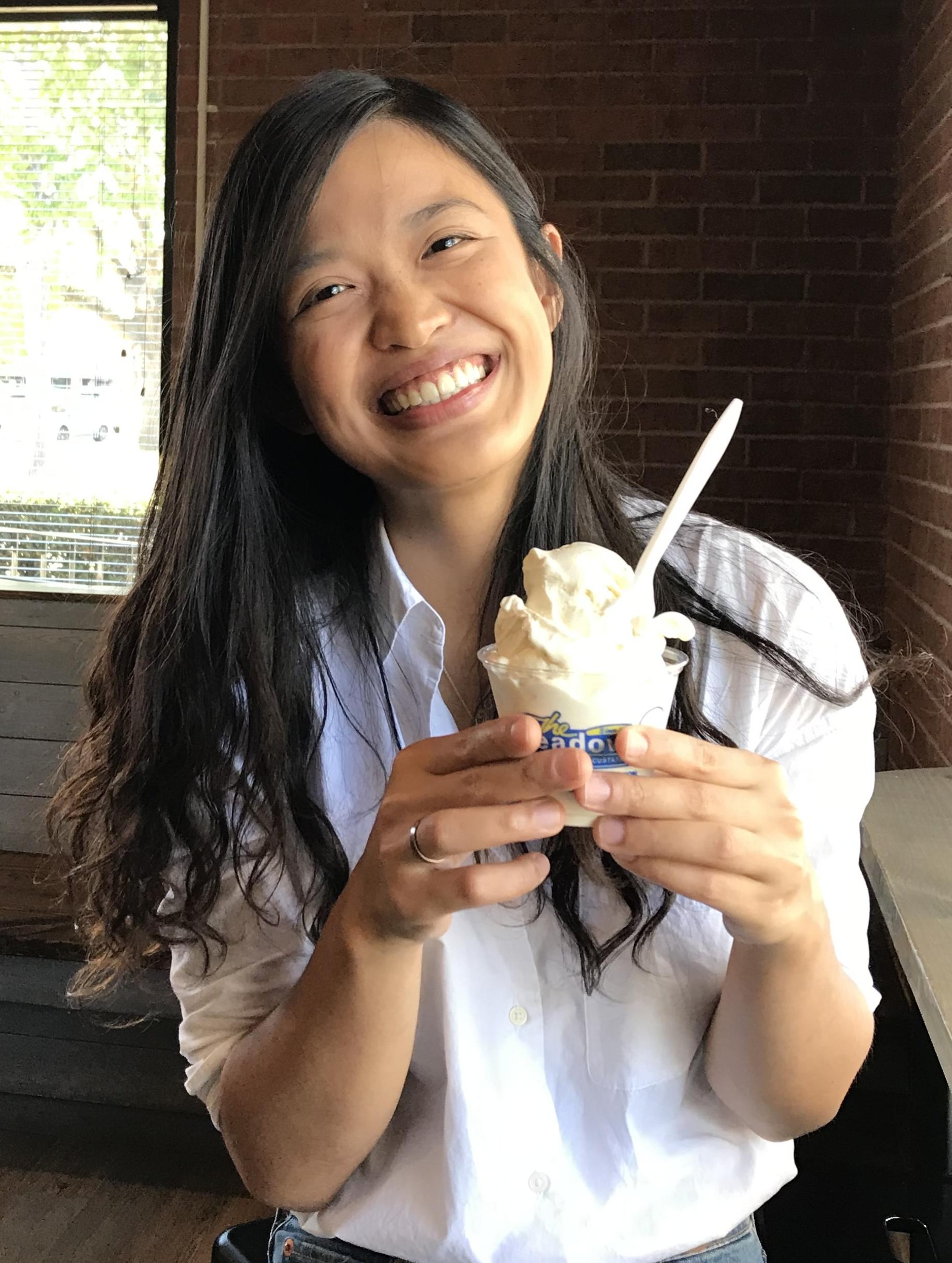
Learn more about Ti Hsu
Background of CBS Research/Clinical/Volunteering efforts/achievements
I was introduced to the CBS community in 2020, when I began doctoral studies at the University of Iowa under the mentorship of Dr. Emily Thomas. Since then, I have pursued a program of research focused on: (1) using advanced quantitative methods to improve self-report measures of cognitive and emotional processes, with a special focus on psychological flexibility; and (2) exploring associations between such processes and health and psychosocial outcomes in at-risk emerging adults. This work includes a study examining whether self-report and behavioral assessments of distress tolerance are assessing the same construct, as well as a three-level systematic review and meta-analysis on the effects of ACT on undergraduate student psychological flexibility. I have also published work focused on the development and validation of a short-form, multidimensional measure of psychological flexibility. My dissertation focuses on the instrument’s continued refinement with a novel item response format, and will also investigate whether the instrument is invariant across respondents with previous psychotherapy experience versus those with no previous experience. I have also contributed to work investigating the psychometric properties of two psychological flexibility measures in a sample of older adults. I have presented poster and oral presentations at the 2021 and 2022 ACBS World Conferences, as well as CBS-related poster presentations at the 2023 annual convention of the association for psychological science (APS), and at the 2024 graduate student conference of the Society of Multivariate Experimental Psychology (SMEP). In addition, I serve as a student member of the JCBS editorial board.
Autobiography
I grew up in Tainan, Taiwan, and Columbus, Ohio. I received my BA in liberal arts from St. John’s College, and my MS in experimental psychology from William & Mary, where I explored biopsychosocial mechanisms contributing to the effects of stress on psychopathology, and how mindfulness interacts with disordered eating behaviors to affect food intake. Currently, I am a fifth-year doctoral student in the clinical science program at the University of Iowa. My current research focuses on different cognitive and emotional processes that contribute to risk and resilience for psychopathology, and how self-report instruments used to measure them can be improved and refined for use in different research and clinical contexts. This work is informed by my training in and experiences in delivering ACT. I also have a strong interest in quantitative methods, and have received training in generalized linear models, longitudinal multilevel models, factor analysis, item response theory, structural equation modeling, and network analysis. I believe that these methods can help us better understand how different cognitive and emotional processes should be assessed, as well as capture their dynamic nature over time. Outside of work, I enjoy going on runs and engaging in other outdoor activities such as hiking and backpacking. Other hobbies include watercolor painting, houseplant keeping, and searching for good food.
Future goals
I hope to continue building a program of research focused on improving self-report measures of psychological flexibility and other psychological processes while exploring associations between these constructs and psychosocial outcomes in emerging adults.
Publications:
Hsu, T., Hoffman, L., Thomas, E.B.K. (accepted). Measurement invariance and confirmatory measurement modeling of a psychological flexibility questionnaire across Likert and Expanded response formats. Multivariate Behavioral Research.
Hsu, T. , Adamowicz, J. L., & Thomas, E. B. K. (2023). The effect of acceptance and commitment therapy on the psychological flexibility and inflexibility of undergraduate students: A systematic review and three-level meta-analysis. Journal of Contextual Behavioral Science, 30, 169–180. https://doi.org/10.1016/j.jcbs.2023.10.006
Hsu, T. , Hoffman, L., Thomas, E.B.K. (2023) Confirmatory measurement modeling and longitudinal invariance of the CompACT-15: A short-form assessment of psychological flexibility. Psychological Assessment, 35(5), 430–442. https://doi.org/10.1037/pas0001214
Hsu, T. , Thomas, E. B. K., Welch, E. K., O'Hara, M. W., & McCabe, J. E. (2023). Examining the structure of distress tolerance: Are behavioral and self-report indicators assessing the same construct? Journal of Contextual Behavioral Science, 27, 143–151. https://doi.org/10.1016/j.jcbs.2023.02.001
Adamowicz, J. L., Thomas, E. B. K., Hsu, T., Denburg, N. L., & Roche, A. I. (2022). A preliminary investigation into the factor structure of two psychological flexibility measures in a sample of community-dwelling older adults. Clinical Gerontologist, 1–13. https://doi.org/10.1080/07317115.2022.2131496
Student Spotlight Award Recipient - Wang Fenfen
Student Spotlight Award Recipient - Wang FenfenCongratulations to Wang Fenfen on being selected as the Student Spotlight Award winner for May 2017!
The purpose of this award is to highlight students who are doing important work in the CBS community whether for research, clinical, and/or volunteer-humanitarian efforts. This will be a way to highlight their achievements, let the ACBS community know important work students are doing, and possibly provide a platform for mentoring/collaboration/professional development/conversations around highlighted areas.
Learn more about Wang:
Background of CBS Research/Clinical/Volunteering efforts/achievements:
I have been learning CBS, conducting related studies and disseminating ACT and RFT since 2015 when I started working with Dr. Zhu Zhuohong for Master’s degree.
Over the past nearly two years, I have published 32 popular science articles about ACT and RFT on the website and WeChat public platform, which is the most popular social media in China, of Computer Network Information Center of Chinese Academy of Sciences and some newspapers. Also, I am the coordinator of translation of three books and also one of the translators, one of which was published (i.e., the Chinese version of ACT Made Simple by Dr. Russ Harris).
The main research project I finished was the pilot study that attempted to construct and evaluate the learning model of metaphorical reasoning for children with ASD in China. We utilized multiple exemplar training to teach them to establish the relational frames among subjects in a metaphor based on RFT. Participants included four children, aged 12-16, with a diagnosis of ASD. The results revealed their success in post-training phase and probe session, for accuracy data in all sessions reached above 80%. Two of them even got 100% in the fifth or sixth session. I submitted a manuscript based on this study along with another review manuscript, and both of them are still under review. What’s more, I have also helped with more than seven Master’s students’ studies on ACT and RFT in our research team and four of them almost finish it.
Autobiography:
My name is Wang Fenfen. I am a second-year Master’s student in Psychological Flexibility/Applied Psychology at the Institute of Psychology, Chinese Academy of Sciences, Beijing, China. I did my B.S. in Psychology at the Zhejiang University, Hangzhou, China.
I’m very positive and earnest. I love children, and I believe that everyone was born with great ability and assets, sometimes it is subtle and needs to be discovered. Now, I’m working on my Master’s degree under the supervision of Dr. Zhu Zhuohong, who is the president of the China Chapter of ACBS. My works include the application of ACT and mindfulness-based practice in daily life, counseling and the study of training derived relational responding for children with Autism Spectrum Disorders based on RFT.
Also, I used to work as the editor for several websites and social media at Zhejiang University and University of Chinese Academy of Sciences. Therefore, I’m quite skilled in editing and typesetting. I also write popular science articles. Over the past two years, I have done many works on our group’s WeChat public platform to disseminate CBS, ACT, and RFT to professionals and the general public.
Future goals:
I hope I will succeed in the future study on the assessment and training of derived relational responding for children with Autism Spectrum Disorders based on RFT.
Relevant publications:
http://epaper.ynet.com/html/2016-01/07/content_175404.htm?div=-1&from=singlemessage&isappinstalled=1
http://mp.weixin.qq.com/s/6ZulGJRtIVEmNIL8-c65WQ
http://mp.weixin.qq.com/s/4YRXjWcBq9HDcjf-5t2D-w
http://mp.weixin.qq.com/s/pawMPS8cdx5kynCLNn-zag
http://mp.weixin.qq.com/s/FlxrQvsssAcMwOPtFi8c-g
http://mp.weixin.qq.com/s?__biz=MjM5NDg4OTEwMQ==&mid=207335546&idx=1&sn=512d942ff11d1bef4aefa003ad851ea7&scene=1#rd
http://mp.weixin.qq.com/s?__biz=MjM5MDcxNjI4Nw==&mid=236066581&idx=3&sn=96643f318b4c970dd8cecc875ad956bc&scene=1#rd
http://xwxj.blog.kepu.cn/20160509142028.html
http://xwxj.blog.kepu.cn/20160329111995.html
http://xwxj.blog.kepu.cn/20160303111966.html
http://xwxj.blog.kepu.cn/20160205131953.html
http://xwxj.blog.kepu.cn/20151230131916.html
http://xwxj.blog.kepu.cn/20151208131893.html
http://xwxj.blog.kepu.cn/20151116141868.html
http://xwxj.blog.kepu.cn/20151103151845.html
http://xwxj.blog.kepu.cn/20150922091810.html
http://xwxj.blog.kepu.cn/20150831141735.html
http://xwxj.blog.kepu.cn/20150817151702.html
http://xwxj.blog.kepu.cn/20150811141688.html
http://xwxj.blog.kepu.cn/20150723151647.html
http://xwxj.blog.kepu.cn/20150515151542.html
http://xwxj.blog.kepu.cn/20150420091498.html
http://xwxj.blog.kepu.cn/20150330151475.html
http://xwxj.blog.kepu.cn/20150302161434.html
Student Spotlight Award Recipient - Wenqian ZHAO
Student Spotlight Award Recipient - Wenqian ZHAOCongratulations to Wenqian ZHAO on being selected as the Student Spotlight Award winner for September 2023!
The purpose of this award is to highlight students who are doing important work in the CBS community whether for research, clinical, and/or volunteer-humanitarian efforts.
This is a way to highlight their achievements, let the ACBS community know important work students are doing, and possibly provide a platform for mentoring, collaboration, professional development, and conversations around highlighted areas.
Learn more about Wenqian ZHAO:
Hi, my name is Wenqian ZHAO, Chaney. I come from a lovely family in a beautiful city named Lanzhou, Gansu province, north of China. I am a person with a wide range of hobbies, including passionate guitar playing and singing, and quiet and subtle traditional Chinese painting. These experiences have allowed me to develop a character that is both passionate and careful.
I am now working on my PhD study with the supervision of Prof. Wai Tong Chien, and Prof. Yuen Yu CHONG, at The Chinese University of Hong Kong. I hope that through my research, we can find more effective ways to help cancer patients recover faster and better. I am now also interested in the combined application of art therapy such as music and painting in the context of behavioural science, hoping to become a professional ACT interventionist and bring my enthusiasm for life to everyone who is going through or has suffered horrible experiences.
Future goals:
I will further make efforts in research works about the combination utilization of contextual behavioural science and nursing science, especially the ACT-based interventions on cancer patients’ and their families’ health-related outcomes.

Background of CBS Research/Clinical/Volunteering efforts/achievements:
I have been learning ACT for five years and have participated in more than 40 hours of learning about ACT theoretical knowledge, and more than 30 hours of training and supervision on ACT skills. I have been doing research on the application of ACT in breast cancer patients, including a master's project and a doctoral project. In my master’s study, I validated the Chinese version of the cognitive fusion questionnaire (CFQ) and conducted a randomized controlled trial to test the effectiveness of ACT-based intervention on sleep quality and psychological well-being in breast cancer patients. In my doctoral study, I also translated the the original version of CompACT into Mandarin and validated it in the breast cancer survivors. I am now doing a PhD research project about the effectiveness of ACT-based intervention on breast cancer patients’ body image disturbance.
So far, I have published three related articles and five conference presentations, and got the 2022 ACBS Foundation Grant in the areas of behavioural context-optional and nursing science. I will continue conducting research on the combination of behavioural context science and nursing science to promote the development of clinical psychological nursing work as well as the patient's well-being.
Relevant publications:
He, X., Ng, M. S., Wang, X., Guo, P., Li, L., Zhao, W., . . . So, W. K. (2021). A dance program to manage a fatigue-sleep disturbance-depression symptom cluster among breast cancer patients receiving adjuvant chemotherapy: A feasibility study. Asia-Pacific Journal of Oncology Nursing, 8(3), 337-339. https://doi.org/10.4103/2347-5625.308677
X.He, W.K.W.So, K.C.Choi, L.Li, W.Zhao, & M.Zhang. (2019). CN83Symptom cluster of fatigue, sleep disturbance and depression and its impact on quality of life among Chinese breast cancer patients undergoing adjuvant chemotherapy: A cross-sectional study. Annals of Oncology,
30(5), v840. https://doi.org/10.1093/annonc/mdz276.015
Zhou, K., Wang, W., Zhao, W., Li, L., Zhang, M., Guo, P., . . . Li, X. (2020). Benefits of a WeChatbased multimodal nursing program on early rehabilitation in postoperative women with breast cancer: A clinical randomized controlled tria. International Journal of Nursing, 106, 103565. https://doi.org/10.1016/j.ijnurstu.2020.103565
赵雯倩,李璐璐,王雪,李小妹. (2021). 乳腺癌病人经验性回避与认知融合现状及关系框架分析 [Study on the status of empirical avoidance and cognitive fusion in breast cancer patients and their correlation]. Nursing research, 19(02):153-157.
赵雯倩,李小妹,王雯,李璐璐,张蒙悦. (2020). 中文版认知融合问卷在乳腺癌人群中的信效度研究 [Reliability and validity of Chinese version of cognitive fusion questionnaire in breast cancer patients]. Contemporary Nurse, 27(06):25-26.
赵雯倩,李璐璐,张蒙悦,白雪,李小妹. (2020). 术后化疗期乳腺癌患者心理痛苦及其心理僵化相关 影响因素研究 [Study on psychological distress and its influencing factors in breast cancer patients undergoing postoperative chemotherapy]. Journal of Nursing Science, 35(13):65-68.
李璐璐,李小妹,韩冬芳,李佳颖,赵雯倩,张蒙悦. (2020). 乳腺癌患者心理痛苦轨迹及影响因素的纵 向研究 [A longitudinal study of identification and predication of psychological distress trajectories among breast cancer patients]. Chinese Journal of Nursing, 55(08):1140-1146.
李璐璐,张蒙悦,赵雯倩,王雯,李小妹. (2019). 中文版 10 项目大五人格量表在乳腺癌病人中应用的 信效度分析 [Reliability and Validity Analysis of Chinese Version 10 Big Five Personality Scale in Breast Cancer Patients]. Nursing Research, 33(06): 970-973.
王雯,周凯娜,赵雯倩,李璐璐,张蒙悦,郭萍利,周灿,李敏捷,安靖华,李小妹. (2019). 网络化持续康复 护理支持对乳腺癌术后化疗病人健康相关生活质量的影响 [Effects of networked continuous rehabilitation nursing on health-related quality of life in postoperative chemotherapy patients
with breast cancer]. Nursing Research,33(11):1821-1826.
Student Spotlight Award Winner - Cainã Gomes
Student Spotlight Award Winner - Cainã GomesCongratulations to Cainã Gomes on being selected as the Student Spotlight Award winner for February 2017!

The purpose of this award is to highlight students who are doing important work in the CBS community whether for research, clinical, and/or volunteer-humanitarian efforts. This will be a way to highlight their achievements, let the ACBS community know important work students are doing, and possibly provide a platform for mentoring/collaboration/professional development/conversations around highlighted areas.
Learn more about Cainã:
Background of CBS Research/Clinical/Volunteering efforts/achievements:
Despite the few opportunites we have here in Brazil, I was fortunate enough to meet some colegues (William Perez, Roberta Kovac, Julio de Rose and Diana Bast) who introduced me to RFT and ACT. Since then, I have been studying RFT for the past three years on a weekly basis. We have a research group that has been very active and developing fast. I've completed two year course of specialization in clincal behavior therapy, which gave me basis to start a clincal practice this year. Despite that, I have little formal ACT formation so far, just a week-length workshop with Carmen Luciano last year. I've been volunteering for the past two years in the child psychiatric area of Universidade de São Paulo hospital with children who have OCD, it's a public hospital and the symptoms are frequently severe and the work is very rewarding.
Autobiography:
I had a very conservative behavior analyst formation during my undergraduate years, despite of that, I was never fully convinced that the traditional skinnerian framework of verbal and rule-governed behavior was adequate. The insatisfatcion became even greater when I started my clinical practice: the complexity of verbal relations I was seeing just couldn't be explained by tradicional behavior analytic accounts. Something was missing.
That was when I heard about RFT. At first, the vocabulary just seemed very odd and the experiments very difficult to understand. But after a while, the experimental data became so convincing that I wasn't able to go back. In addition, the ACT framework became more clear once I started applying, not only reading, specially to anxiety disorders patients. So far, the results have been much better than with tradicional behavioral therapy. I hope I can continue to learn more and bring CBS to Brazil, where there are a lot of behavior analysts, but very few willing to study RFT and ACT. There is, still, a lot of prejudice towards CBS.
In my masters I’m developing an experimental research about rule-governed behavior and transformation of stimulus functions.
In the first three months of 2017, I’ll be at Ghent University to collect all the data for my masters, under the supervision of Dermot Barnes-Holmes. By the time of the next conference, I'll have some interesting data to show.
Future Goals:
I'm committed to the development of experimental research in rule-governed behavior from an RFT perspective with collaboration of more experienced researchers.
Relevant publications:
Bast, D.F., Linares, I.M.P., Gomes, C. et al. The Implicit Relational Assessment Procedure (IRAP) as a Measure of Self-Forgiveness: The Impact of a Training History in Clinical Behavior Analysis. Psychol Rec 66, 177–190 (2016). https://doi.org/10.1007/s40732-016-0162-7
Student Spotlight Award Winner - Corinna Stewart
Student Spotlight Award Winner - Corinna StewartCongratulations to Corinna Stewart on being selected as the Student Spotlight Award winner for January 2017!
The purpose of this award is to highlight students who are doing important work in the CBS community whether for research, clinical, and/or volunteer-humanitarian efforts. This will be a way to highlight their achievements, let the ACBS community know important work students are doing, and possibly provide a platform for mentoring/collaboration/professional development/conversations around highlighted areas.
.jpg)
Learn more about Corinna:
Background of CBS Research/Clinical/Volunteering efforts/achievements:
I completed my Psychology degree at NUI Maynooth (NUIM), where I undertook modules in behaviourism and Relational Frame Theory (RFT). My final year research project used the Implicit Relational Assessment Procedure (IRAP) to investigate gender and self-esteem. After graduating, I worked as a Research Assistant in NUIM investigating smoking cessation using the IRAP. I then worked on an RCT of ACT for depression in psychosis in Glasgow University, where I became interested in paranoia and how a CBS approach might inform our understanding of and help normalize these experiences. I was awarded a scholarship to undertake a PhD on this topic at NUI Galway and recently publish a paper on a CBS approach to delusions in JCBS. My research utilizes the IRAP and other RFT-based methods to explore paranoia from a CBS perspective. I have presented this work at local and international conferences and submitted two of my studies for publication. I joined the ACBS Psychosis SIG taskforce and currently manage our social media. I have pursued my interest in global mental health and CBS in my role as research leader with commit and act, an NGO that provides psychotherapeutic support in Sierra Leone. We have published an evaluation of our ACT training workshops in JCBS and a chapter in the Palgrave Handbook of Global Mental Health. I have also presented our work at ACBS World and UK Chapter conferences. Recently, we were awarded an ACBS grant for our ‘DARE to connect’ program, which supports couples affected by domestic violence.
Three sentence summary of CBS research/clinical/volunteering efforts/achievements (for social media use if you win): I am a final year PhD student at NUI Galway, studying RFT and paranoia using the IRAP. I’m also the research team leader at commit and act – an international NGO that uses ACT, PROSOCIAL, and CBS principles to promote mental health and wellbeing in Sierra Leone. I have been a member of ACBS for over 8 years - I love the warmth, support and fun that this community brings to the science of alleviating suffering and promoting prosociality and vitality.
Autobiography:
I’m from Derry in Northern Ireland. I first became interested in mental health when I studied A Level Psychology at secondary school. I went on to complete a BA in Psychology at NUI Maynooth, where I was first introduced to RFT and CBS. After my degree, I attended an ACT workshop at the ACBS World Conference in Enschede. These experiences had a profound effect on me – I found ACT to be personally transformative and empowering and CBS changed the way I see the world entirely. I am committed to studying and contributing to our understanding of how CBS principles can be used to alleviate suffering and promote wellbeing through my PhD work on paranoia and voluntary work with the ACBS Psychosis SIG and commit and act. These activities have also introduced me to some truly incredible people, who have become mentors and lifelong friends.
I also try to apply CBS to my everyday life. I often find myself saying things like “I wonder what the function of their behavior is?”, “Thank your mind for that”, and “Those transformation of stimulus functions can be pretty rough alright!” I find that having few friends gives me more time for my research and other hobbies! When I’m not "RFTing" (even though technically we are constantly RFTing or “AARRing” once we become verbal), you’ll find me baking and cooking for friends and family, in downward dog or savasana on my yoga mat, or walking along the Prom or beautiful hills of Connemara in Galway.
Future goals:
After my PhD, I plan to continue investigating paranoia from a CBS perspective working with researchers and clinicians from various backgrounds and perspectives. I will also continue working with commit and act to establish structures for research that will help us better understand local issues and improve our work.
Relevant publications:
Stewart, C., Ebert, B., & Bockarie, B. (in press). commit and act in Sierra Leone (Book chapter). In R. White, U. Read, S. Jain, & D. Orr (Eds.). The Palgrave Handbook of Global Mental Health: Socio-cultural Perspectives. Palgrave Publishers Ltd. ISBN: 978-1-137-39510-8 http://www.palgrave.com/us/book/9781137395092
Stewart, C., Stewart, I., & Hughes, S. (in press). A functional account of (persecutory) delusions. Journal of Contextual Behavioral Science. DOI: 10.1016/j.jcbs.2016.09.002
Stewart, C., White, R., Ebert, B., Mays, I., Nardozzi, J., & Bockarie, H. (2016). A preliminary evaluation of Acceptance and Commitment Therapy training in Sierra Leone. Journal of Contextual Behavioral Science. DOI: 10.1016/j.jcbs.2016.01.001
Gumley, A., White, R. G., Briggs, A., Ford, I., Barry, S., Stewart, C., Beedie, S., Clarke, C., MacLeod, R., Lidstone, E., Nam, J., & McLeod, H. (2015). A Parallel group Randomised Open Blinded Evaluation of Acceptance and Commitment Therapy for Depression After Psychosis: A Pilot Trial Protocol (ADAPT). Psychosis: Psychological, Social and Integrative Approaches. DOI: 10.1080/17522439.2015.1100669
Student Spotlight Award Winner - Rajinder (Sonia) Singh
Student Spotlight Award Winner - Rajinder (Sonia) SinghCongratulations to Sonia Singh on being selected as the Student Spotlight Award winner for May 2017!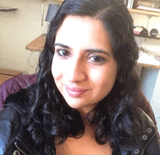
The purpose of this award is to highlight students who are doing important work in the CBS community whether for research, clinical, and/or volunteer-humanitarian efforts. This will be a way to highlight their achievements, let the ACBS community know important work students are doing, and possibly provide a platform for mentoring/collaboration/professional development/conversations around highlighted areas.
Learn more about Sonia:
Background of CBS Research/Clinical/Volunteering efforts/achievements:
I am a true believer in the scientist-practitioner model and work to be strong in both CBS research and practice. Through my masters program at the University of Houston-Clear Lake and through my doctoral study at Bowling Green State University, I have several years of direct experience utilizing CBS-based therapies to treat several different populations. For example, during my first year at BGSU, I developed and utilized a single-subject design study using Functional Analytic Psychotherapy for nursing home residents. Further, I am actively involved in a two-year randomized control trial research study funded by the Bureau of Workers Compensation assessing the use of Acceptance and Commitment Therapy (ACT) to reduce work stress, assault, injury, and abuse in nurses and nurse aides in long-term care settings compared to a wait-list control. I have also co-facilitated several ACT groups and developed the ACT protocol that is currently being used at my clinical externship site, the Toledo Veterans Affair Outpatient Clinic, as well as attended numerous multi-day national and international conferences and workshops based on various CBS therapies. I also helped co-author a chapter focused on using Functional Analytic Psychotherapy to treat shame in gender and sexual orientation minorities, and will be hosting Matthew Skinta and Aisling Curtin's upcoming webinar "Out of the Closet: Into the Context."
Autobiography:
I am a third year graduate student in clinical psychology at Bowling Green State University working with Dr. Bill O'Brien. Prior to moving to cold northwest Ohio, I was first introduced to contextual behavior therapies at the University of Houston-Clear Lake in Houston, TX, where I obtained my MA in clinical psychology. During my time there, I developed a passion for utilizing ACT and FAP, which then lead to my research interest in CBS. My thesis project was an examination of the efficacy of FAP single-subject research studies, and I hope my dissertation will be an evaluation of mindfulness and acceptance for work stress in sexual orientation minorities. I am also extremely interested CBS as it applies to anxiety disorders and OC-spectrum conditions, as a result of my work at UH-CL with Dr. Chad Wetterneck. I have been a part of the ACBS world for 5 years now, and I love attending conferences, workshops, and connecting with other like minded people.
Future goals:
I hope to land in academia and become a stronger scientist-practitioner in the world of ACBS and utilize contextual behavior therapies with underserved and stigmatized populations.
Relevant publications:
Singh, S., O’Brien, W.H. Functional Analytic Psychotherapy for Nursing Home Residents: A Single-Subject Investigation of Session-by-Session Changes. J Contemp Psychother 47, 173–180 (2017). https://doi.org/10.1007/s10879-016-9352-5
Student Spotlight Award Winner - Victoria Ameral
Student Spotlight Award Winner - Victoria AmeralCongratulations to Victoria Ameral on being selected as the Student Spotlight Award winner for March 2017!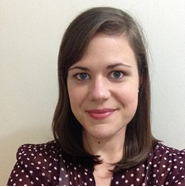
The purpose of this award is to highlight students who are doing important work in the CBS community whether for research, clinical, and/or volunteer-humanitarian efforts. This will be a way to highlight their achievements, let the ACBS community know important work students are doing, and possibly provide a platform for mentoring/collaboration/professional development/conversations around highlighted areas.
Learn more about Victoria:
Background of CBS Research/Clinical/Volunteering efforts/achievements:
I began my clinical training in ACT as a second year graduate student, and now, as a fifth year, I am an advanced peer supervisor for second year students in Clark University’s ACT practicum. ACT and RFT have influenced all of my independent research endeavors as a graduate student. My master’s thesis evaluated the differential impact of negative and positive reinforcement processes on quality of life in depression. In addition to using this general measure of functioning, I also tested the model in a mixed sample to evaluate its impact across the well-being continuum. My dissertation research, for which I received a student research grant from APA Division 50, is an experimental test of values clarification in opioid use disorder. I am investigating whether a brief values clarification exercise increases motivation for abstinence, and whether it does so by improving the ability to delay gratification.
I also consider my personal outreach efforts to be a sort of CBS volunteer effort. While working as a full time research assistant at Massachusetts General Hospital, I made a number of friends who are now training in second wave CBT programs. I very much enjoy engaging in active discussions with them around the differences between ACT and CBT. I think these conversations can be a powerful tool for making ACT accessible to those who did not receive third-wave training as graduate students.
Autobiography:
I am a fifth year doctoral candidate in clinical psychology at Clark University, where I work with Dr. Kathleen Palm Reed. I graduated summa cum laude from the University of Massachusetts, Amherst in 2008, where I completed my honors thesis in cognitive neuroscience. I then spent four years as a research assistant at Massachusetts General Hospital prior to starting graduate school.
As a result of my undergraduate and post-baccalaureate experiences, I am drawn to research and clinical approaches that address the limitations of our diagnostic system, and bridge the gap with related fields such as neuroscience. I became interested in substance use disorders through my clinical work, and over the past 2+ years have continued to work with this population. I am passionate about supporting individuals with substance use disorders to rebuild a valued life, a focus which inherently rejects the notion that addiction is the result of some moral failing. Addiction research has also long highlighted the role of reinforcement in substance use disorders, and I am excited by the potential links between reinforcement processes and values work.
In addition to this focus on substance use disorders, I have a broader interest in work that improves the lives of stigmatized groups, including victims of interpersonal violence and sexual and gender minority individuals. At the end of my career, I hope to be described as an affirming and respectful clinical scientist who was passionate about my work.
Future goals:
I aim to build a clinical research career bridging the gap between clinical science and practice in the treatment of substance use disorders, with a particular focus on processes related to values and motivation.
Student Spotlight Program Evaluation Criteria
Student Spotlight Program Evaluation CriteriaPlease list any research experience:
- CBS research published in JCBS or other peer-reviewed journal.
- Received a grant or other outside of graduate program funding for conducting CBS research.
- Presented CBS research (oral/poster presentation) at a national professional conference
- Conducted CBS research individually or as part of a research team.
Please list any clinical experience or training:
- CBS workshops or conferences (includes webinars).
- Published a book or book chapter on clinical applications of CBS.
- Provided supervision to other students learning and applying CBS principles in therapy.
- Used CBS principles in therapy with individual or group clients.
Please list any significant achievements:
- Leadership positions within ACBS, the student's school department/program (CBS-related), or otherwise demonstrates leadership in the CBS community.
- Awards for CBS related work.
- Student worked in a novel or innovative way to contribute to the CBS community (e.g. clinical work in a unique population, research in development of new measure, volunteer work in developing nations, etc.)
Commitment to diversity and equality. For example:
- Provided volunteer services to underserved populations and/or conducts research with underserved or minority populations.
- Provided clinical services and/or conducted CBS research in a culturally competent manner and/or in multiple languages, increasing accessibility to CBS.
- Involved in humanitarian organization to alleviate human suffering and/or inequality.